STIs
Popular topics and icon codes
Reducing risksI need a clinic now
Understanding HIV
Understanding Undetectable = Untransmittable
Hepatitis and hepatitis C
PrEP
HIV stigma
HIV and the law
Monkeypox virus
Antibiotics and resistance
Peer mentoring
Living well with HIV External link | Internal link
Film clip | Sound clip | Book
Organisation/ service Helpline | Chat
Map | Note/ warning Ask us anything
If online, we usually reply same day if not with 48hrs.
About this website
Disclaimer Back to top
About sexually transmitted infections
If you think you have a STI
If you think you have a STI…
- Don’t have sex
- Read this very helpful section
- And get to a clinic
And yes, you can Google your symptoms until the cows come home to try and find out what you have but, frankly, this is bloody useless. So, at the risk of repeating ourselves, get yourself to a clinic!
SXT | SXTFind a sexual health service | NHS
Sexual health services by London Borough | MEN R US Free do-it-yourself STI test kit | Sexual Health London (SHL)
This service is designed for individuals who have no symptoms. Back to top
You're not the first to get an STI
 If you ever thought that you were the first or only person to have had a sexually transmitted infection (STI) – think again; they have been around for thousands of years. Gonorrhoea was first mentioned in the Bible and the name of the disease was given by the second-century Greek physician Galen. The origin of syphilis is less clear but by the 16th Century it was making its way across Europe.
If you ever thought that you were the first or only person to have had a sexually transmitted infection (STI) – think again; they have been around for thousands of years. Gonorrhoea was first mentioned in the Bible and the name of the disease was given by the second-century Greek physician Galen. The origin of syphilis is less clear but by the 16th Century it was making its way across Europe.
Anybody can get a STI from someone who already has one. The trouble is that STIs are usually passed on by someone who doesn’t know that they have an infection and so just asking your partner won’t protect you. The majority of STIs enter the body through tiny abrasions, sores or cuts in the body, many of which can be invisible to the eye. A few STIs only itch, some are painful, some are permanent and many can be serious if left untreated.
Effective prevention, protection and treatment will significantly reduce the likelihood of getting STIs or, if you do get them, will reduce or eliminate the harm they can cause.
Over recent decades, HIV has affected the lives of gay men everywhere and has changed the way we think about sexual health. Not only do we have a better understanding of our health needs, but many sexual health services have responded to the need for improvement. None of us really want to dwell on STIs, but being aware on what’s going on leaves you free to concentrate on having a good time.
Celebrating a century of sexual health care in the UK | British Association for Sexual Health and HIV | 8 Jun 2017 | 2m 43s Back to topReducing risks
Be proactive
 Being sexually healthy is not only about dealing with sexual problems as they arise, it’s also about avoiding problems in the first place. Most sexual activity carries some kind of risk of getting an STI and, while never pleasant, many gay men see them as an occupational hazard.
Being sexually healthy is not only about dealing with sexual problems as they arise, it’s also about avoiding problems in the first place. Most sexual activity carries some kind of risk of getting an STI and, while never pleasant, many gay men see them as an occupational hazard.
You significantly reduce the risk of getting or passing on STIs by:
- Prompt visit to a sexual health clinic if you think you have a STI
- Vaccination against hepatitis A and B, and get tested for Hepatitis C.
- Routine clinic check-ups every 3-6 months. If you have unprotected sex, use drugs or have had a recent STI, we suggest you have check ups every 3 months
- Using condoms when fucking
- Not sharing injecting equipment
Symptoms
STI signs and symptoms
 Sexually transmitted infections are caused by:
Sexually transmitted infections are caused by:
- Bacteria which generally live and multiply in the warm and moist parts of your body like your throat, inside your penis and in your anus and rectum.
- Viruses which generally need to get into the blood stream before they can do harm.
- Parasites which live on your body in areas like your groin and armpits.
While some STIs have no symptoms, most do and can include:
- Itching in or around the cock, balls and arsehole.
- Burning or itching when you piss or poo.
- Needing to piss or poo and then not being able to go, or only going a little.
- Spots, scabs, or rashes on the cock, balls, or entrance to the arsehole or body rash,
- Pus from the end of the cock or from the arsehole itself.
- Unusual lumps or bumps.
STI symptom sorter
 Click the picture on right to enlarge the symptom sorter. Match your symptoms for an indication which STI you may have.
Click the picture on right to enlarge the symptom sorter. Match your symptoms for an indication which STI you may have.
The sorter is for guidance only and to satisfy curiosity. If you’re checking out your own symptoms then that’s reason enough (in our book) to get a clinic check-up now, where tests can determine whether you have an STI or not.
Some symptoms can also indicate other illnesses or medical problems. All the more reason to see someone as soon as possible.
Back to topSTI statistics
Statistics and trends
 With the rise and rise of STIs, sexual health services close to crisis, and gonorrhoea found to be on the rise in nearly every council area in England, what will you be wearing or taking this year… at a time when antibiotics are failing?
With the rise and rise of STIs, sexual health services close to crisis, and gonorrhoea found to be on the rise in nearly every council area in England, what will you be wearing or taking this year… at a time when antibiotics are failing?
Sexually transmitted infections | GOV.UK
HIV in the United Kingdom | GOV.UK
2024
Gonorrhoea getting more drug-resistant and ‘may become untreatable’ | The Guardian | 15 Aug 2024Rise in super-strength cases in England reaches highest level since records began, UKHSA says
Hospital admissions for easily treatable STIs rise amid funding cuts in England | The Guardian | 26 Feb 2024
Council spending on sexual health services down by more than a third since 2013, Guardian analysis finds
Rise in STIs shows need for a 10-year sexual health strategy | LGA | 4 Jun 24
Hospital admissions for easily treatable STIs rise amid funding cuts in England | The Guardian | 26 Feb 2024
Sexual health clinics forced to ration free condoms as services ‘close to crisis’, experts warn | The Standard | 24 Jan 2024
Gonorrhoea found to be on rise in nearly every council area in England and Wales | The Guardian | 20 Jan 2024
STI surge: Sexual health services at breaking point due to rising demand | Local Government Association | 19 Jan 2024
Grindr Users Are Shunning Condoms – But Is Prep Enough? | HuffPost | 14 Jan 2024
2023
Why is Gen Z catching more STIs? It’s complicated | The Big Issue | 17 Dec 2023Gonorrhoea and syphilis diagnoses are at their highest in decades – here’s what you need to know about these STIs | The Conversation | 9 Jun 2023
Gonorrhoea and syphilis STI diagnoses in England hit record levels, latest figures show | Sky News | 6 Jun 2023
Sexual health services at risk of breaking point: LGA responds to UKHSA statistics on new STI diagnoses | Local Government Association | 6 Jun 2023
Syphilis cases at highest level for 75 years in England last year | The Guardian | 6 Jun 2023
News articles and statistics: 2022-17
2022
Why I want to talk about STIs in the black community | BBC | 28 July 20222021
GPs urged not to test gay men for STI ‘super bug’ over fears it will become more antibiotic resistant | The Guardian | 16 Mar 2021Number of LGV cases among gay men in England reach new highs and most cases among men who are HIV negative | nam aidsmap | 6 Jan 2021
2020
Almost one in ten HIV PrEP users report buying antibiotics for STI prevention, raising concerns over potential antibiotic resistance | nam aidsmap | 20 Nov 2020Public Health England (PHE) shows the number of annual gonorrhoea diagnoses rose 26% between 2018 and 2019 (from 56,232 to 70,936). Increases in gonorrhoea were reported in:
- gay, bisexual and other men who have sex with men (MSM) from 26,864 to 33,853 (26% increase)
- heterosexual women from 14,167 to 17,826 (26% increase)
- heterosexual men from 13,036 to 15,253 (17% increase)
Research also found that the people most affected by STIs were gay men, who accounted for 75% of all syphilis and nearly 50% of gonorrhoea diagnoses in England. “The report looked into nearly half a million STI diagnoses in 2018 and found cases of gonorrhoea were up by 249% and syphilis up by 165% in the last ten years. “
Sexually transmitted infections: UK’s sexual health ‘not in good shape’ | BBC News | 5 Feb 20202019
One million new STIs every day, says WHO | BBC News | 6 June 2019People urged to practise safer sex after rise in STIs in England | Public Health England | 4 June 2019
Sex diseases on the rise in England | BBC News | 4 June 2019
2018
Truvada and the truth: is HIV prevention propelling the STI epidemic?
Several recent studies have linked PrEP with a modest rise in STIs. Traeger’s team analyzed eight studies with 4,400 participants and found that starting Truvada for prevention was associated with a 24% increase in such diagnoses. The US study presented in Amsterdam only found one statistically significant STI-related shift in the cohort: after men stopped PrEP, the diagnosis rate for rectal chlamydia or gonorrhea infections fell by 80%.
Truvada and the truth: is HIV prevention propelling the STI epidemic? | The Guardian | 21 Oct 2018 Record demand for sexual health services amid spending cuts | BBC 1 Sep 2018Local councils Struggle to meet surge In demand for sexual health services amid government cuts | HuffPost | 1 Sep 2018
HIV and chronic HCV co-infection prevalence in England highest among MSM | Aidsmap | 15 August 2018
Patients being turned away from sexual health clinics, RCN says | The Guardian | 14 May 2018
‘World’s worst’ super-gonorrhoea man cured | BBC News | 20 Apr 2018
2017
Fall in HIV among gay men could spell end for Britain’s epidemic | The Guardian | 22 Jun 2017Cases of syphilis hit highest level in England since 1949 | The Guardian | 6 Jun 2017
Should we worry about the effect of PrEP on STI rates? | National AIDS Trust | 29 Mar 2017
London clinics report dramatic drops in HIV incidence in gay men: PrEP, early testing and early ART likely to be key | ibase | 27 Feb 2017
New HIV infections in gay men have dropped by a third in England | New Scientist | 3 Feb 2017
Massive drop in London HIV rates may be due to internet drugs | New Scientist | 9 Jan 2017
STI self-test kits
Sexual Health London
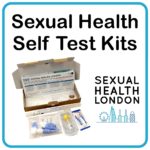 Sexual Health London (SHL) is a self-test STI kit service that provides free sexual health through the internet and local venues. Simply register for SHL and complete an online consultation to order your free STI test kit.
Sexual Health London (SHL) is a self-test STI kit service that provides free sexual health through the internet and local venues. Simply register for SHL and complete an online consultation to order your free STI test kit.
Please note the service is designed for individuals who have no symptoms. If you have symptoms, please attend your local sexual health clinic. The service is available to people aged 16 and over residents in most London Boroughs.
Hillingdon, Croydon and Greenwich do not participate in SHL (checked 19/08/24).The service provides testing for sexually transmitted infections, including chlamydia, gonorrhoea, HIV, syphilis, hepatitis B and hepatitis C via samples you can collect at home.
Sexual Health London | Sexual Health LondonHow SHL uses your data
Please click this link if you would like to know how Sexual Health London collects and uses the data you provide. SHL states, “Currently, no profiling is undertaken, and we have no plans to do so. Profiling would only ever be used to help us fulfil our duties under the Equality Act 2010 in advancing equality of opportunity between people who share a protected characteristic and people who do not share it.” SHL is operated by Preventx, Chelsea and Westminster NHS Trust, LloydsPharmacy and Zesty, backed by Mangrove Capital Partners, Innovation Capital and Qualcomm Ventures.
Back to topSH:24 (outside London)
 SH:24 is a free online sexual health service delivered in partnership with the NHS, set up by a team of public health professionals, sexual health clinicians, designers and academics.
SH:24 is a free online sexual health service delivered in partnership with the NHS, set up by a team of public health professionals, sexual health clinicians, designers and academics.
SH:24 says it makes it easier for people to get tested for the four most common sexually transmitted infections (STIs). We provide free test kits, information and advice – 24 hours a day. It is quick, discreet and completely confidential.
SH:24 operates outside London in parts of England and Ireland. Click here for the full list.
SH:24 | SH:24Order a test kit | SH:24
You will need to enter your postcode to clarify whether SH:24 operates in your area. Back to top
PREP,PEP, and DOXYPEP
PrEP (pre-exposure prophylaxis)
 PrEP is a form of HIV prevention that uses anti-HIV medication to protect HIV negative people from becoming infected with HIV.
PrEP is a form of HIV prevention that uses anti-HIV medication to protect HIV negative people from becoming infected with HIV.
- Pre = before
- Exposure = coming into contact with HIV
- Prophylaxis = treatment to prevent an infection from happening
Research shows that PrEP is highly effective in preventing the sexual transmission of HIV as long as the drugs are taken as directed, before and after sex. It comes as a tablet, a combination of two HIV drugs: Tenofovir and Emtricitabine.
PrEP is now FREE from most NHS sexual health services across the UK. Alternatively, you can buy PrEP privately and/ or online but you are strongly advised to connect with your sexual health service for medical observation. PrEP is one preventative measure that can reduce the risk of contracting HIV, though condoms are still the most effective method of preventing HIV and other sexually transmitted infections (STI).
Even if PrEP is the game-changer many believe it to be, it offers zero protection against other STIs, which are on the rise. The excessive use of antibiotics in treating these other STIs reduces their efficacy.
Most people who take PrEP do not get any side effects. A few experience mild nausea (feeling sick), diarrhoea, headache and bloating, which usually go away after about a month. The HIV medications in PrEP can affect your kidneys and bones, which is why sexual health services will carry out tests before and during treatment and may ask you about your sexual history.
As PrEP only protects against HIV, condoms are important for the protection against other sexually transmitted infections (STIs). Condoms are also an important prevention strategy if PrEP is not taken consistently.More about PrEP
Pre-exposure prophylaxis (PrEP) | nam aidsmapPrEP (Pre-exposure prophylaxis) | iBase
PrEP (Pre-exposure prophylaxis) | LGBT Hero
PrEP (Pre-exposure prophylaxis) | Terrence Higgins Trust (THT)
PrEP (Pre-exposure prophylaxis) | Wikipedia
Where to get PrEP
Contact an NHS sexual health service in your area.
PrEP online
PrEP (Pre-exposure prophylaxis) | PrepsterPrEP (Pre-exposure prophylaxis) | I Want PrEP Now
The evidence for PrEP
In February 2015, the PROUD study reported that PrEP reduced the risk of HIV infection by 86% for gay men and other men who have sex with men. It measured the effectiveness of daily PrEP for those recruited during the 2-year study. In the UK there is still some concern that widespread use of PrEP could reduce the number of people who are using condoms and therefore increase the number of exposures with people who are not aware of their HIV infection, and who are potentially very infectious.
Updates and selection of news articles
PrEP Impact Trial | Public Health England/ NHS EnglandPrEP trial updates | NHS England Huge fall in new HIV infections after roll-out of PrEP in Scotland | nam aidsmap | 21 Jan 2021
Communities with high virus rates ‘left behind’ due to Tory public health cuts | Mirror | 5 Apr 2021
On-demand PrEP is highly effective, but some may find it confusing | nam aidsamap | 8 Jul 2020
Statement: government intend to cut PrEP funding by a third in England | NAT | 3 Jul
A quarter of gay men report casual sex during UK lockdown | nam aidsmap | 11 Jun 2020
PrEP, the drug that prevents HIV, will finally be fully rolled out in England | BuzzFeed | 16 Mar 2020
HIV drug PrEP to be available across England | GOV.UK | 15 Mar 2020
PrEP: Preventative HIV drug available in England from April | BBC | 15 Mar 2020
A drug can stop HIV infection – so why isn’t it available on the NHS in England? | The Guardian | 16 Feb 2020
Does PrEP cause more HIV drug resistance? Yes, some | nam aidsmap | 12 Feb 2020
Why do people turn down the offer of PrEP? | nam aidsmap | 14 Jan 2020
Trust and stigma affect gay couples’ choices on PrEP and PEP | nam aidsmap | 7 Jan 2020
2019
Second case of unintended HIV transmission during HIV cure study prompts questions about PrEP provision | 22 Nov 2019 | nam aidsmap
Taking HIV drug PrEP ‘doesn’t mean you’re promiscuous’ | BBC | 26 Apr 2019
London Councils to add 4,000 new places to PrEP trial | Pink News | 12 Apr 2019
First year of PrEP in Scotland: more users than expected, few dropouts, few HIV infections | NAM aidsmap | 2 Apr 2019
Sadiq Khan: Cash row is denying Londoners access to HIV ‘wonder drug’ | Evening Standard | 12 Mar 2019
Scotland’s introduction of HIV drug PrEP ‘puts England to shame’ | The Guardian | 27 Feb 2019
PrEP drug uptake ‘exceeds predictions’ | BBC News | 26 Feb 2019
2018
Truvada and the truth: is HIV prevention propelling the STI epidemic? | The Guardian | 21 Oct 2018
The HIV-positive man who stopped thousands getting the virus | BBC News | 28 June 2018
New (US) research explores the reasons men stop taking PrEP | Avert 28 Mar 2018
2017
PrEP: HIV ‘game-changer’ to reach NHS in England from September | BBC | 3 Aug 2017
Fall in HIV among gay men could spell end for Britain’s epidemic, say experts | The Guardian | 22 Jun 2017
Sex without fear – my experiment with… PrEP | The Guardian | 22 Jun 2017
Massive drop in London HIV rates may be due to internet drugs | New Scientist | 9 Jan 2017
2016
NHS England has power to fund Prep HIV drug, court decides | BBC 10 Nov 2016
NHS loses court appeal over ‘game-changing’ HIV drugs | The Guardian | 10 Nov 2016
NHS England 45 Day PrEP Consultation | 10 Aug 2016
HIV drug row: A very modern dilemma for the NHS | Nick Triggle, BBC | 2 Aug 2016
NHS England: August update on the commissioning and provision of PREP for HIV prevention | 2 Aug 2016
HIV campaigners win NHS drug battle | BBC 2 Aug 2016
Judicial review over HIV Prep drug | BBC News | 13 June 2016
Buying PrEP online: safer use and NHS monitoring | i-Base and others | June 2016
NHS England reconsiders HIV Prep drug decision | BBC | 19 Apr 2016
NHS will now consider putting PrEP back… | NAT | 19 Apr 2016
England’s PrEP policy in disarray after NHS U-turn | NAM Aidsmap | 22 Mar 2016
Row over HIV prevention drug Prep (Funding 500 over 2 years) | BBC | 22 Mar 2016
PrEP: Why we are waiting | The Lancet HIV | Jan 2016
R.I.P. Condoms | Michael Henry | 2 Jan 2019 | 3m 23s Back to topSome gay and bisexual men see PrEP as a ‘social problem’
“Gay and bisexual men have differing attitudes towards men who are using pre-exposure prophylaxis (PrEP), according to US research published in Sociology of Health & Illness. A series of focus groups conducted in New York City showed that some men regarded PrEP users as immoral, irresponsible, naïve and vectors of disease. In contrast, other men saw PrEP as a beneficial new option for preventing the spread of HIV. They had a nuanced view about the effectiveness of condom-based prevention campaigns and the epidemiology of sexually transmitted infections (STIs) among gay and bisexual men.”
Some gay and bisexual men see PrEP as a ‘social problem’ | nam aidsmap | 5 Oct 2018So, what is the problem with PrEP? Why is there stigma around a pill that, ultimately, prevents HIV infection and can save lives?
“Ultimately, we are a community living in the shadow of a devastating and traumatic chapter in our history (AIDS). With PrEP and undetectable, we are asking people to unlearn everything they ever learned in a climate of fear, infection and death. We are asking people to learn the new science and the new facts, and oftentimes, change or something new can stir deep emotions and reactions. It requires us all to use the basic components of constructive debate, which are respect, compassion and kindness. It will require us to listen and be open to learn. It will be uncomfortable but it needs to happen.”
PrEP: The battle against stigma | GMFA | 2018 FS 168Do-it-yourself HIV prevention: who do men buying PrEP online get support from?
“Gay men in London who source their own supply of generic pre-exposure prophylaxis (PrEP) drugs, usually from overseas internet pharmacies, most often learnt about this possibility from people in their social network and would like more support from other PrEP users to be available. Nonetheless, clinicians’ endorsement of purchasing PrEP online was important in convincing men of the legitimacy of the practice and men would have much preferred the NHS to actually provide PrEP, according to a study in PLOS ONE.”
Do-it-yourself HIV prevention: who do men buying PrEP online get support from? | aids map | 18 Sep 2018PrEP, condoms, STIs and antibiotics
Studies show a significant rise in bacterial STIs in men who are using PrEP that appears to be related to their sexual networks and the level of condom use. Even if PrEP is the game-changer many are hoping it to be, PrEP offers zero protection against other STIs which are on the rise at a time when antibiotics are failing.
Rapid rise in anti-HIV PrEP pills linked to drop in condom use | The Guardian | 6 June 2018
Antibiotics ‘may be lost’ through overuse, says chief medical officer | BBC | 13 Oct 2017 | 59s
PEP (post-exposure prophylaxis) or PEP SE (sexual exposure)
 Post Exposure Prophylaxis (PEP) also known as PEP SE (post-exposure prophylaxis sexual exposure) is a course of medication after a potential exposure, designed to reduce the risk of HIV infection. It is the same meds that are used to treat HIV.
Post Exposure Prophylaxis (PEP) also known as PEP SE (post-exposure prophylaxis sexual exposure) is a course of medication after a potential exposure, designed to reduce the risk of HIV infection. It is the same meds that are used to treat HIV.
The course of medication lasts 28 days and may be able to prevent you from becoming infected with HIV if you start taking it within 72 hours of being at risk of HIV exposure; eg: a condom break during fucking.
If you think you may need PEP don’t spend the next 72 hours wondering, or searching the Internet for the right advice. The right advice is right here and you should go to a sexual health clinic now as time is of the essence. You can also obtain PEP at A&E (Accident and Emergency) departments of some hospitals. A&Es are especially important at weekends because most sexual health clinics are closed.
A&E London | MEN R US
Find a sexual health service | NHS NAM Aidsmap
i-base
Wikipedia Back to top
DoxyPEP (Doxycycline)
Doxycycline is an antibiotic that has been in use since the 1960s. It is also known as Vibramycin-D, Efracea, and Periostat. Doxycycline is a ‘bacteriostatic’ that inhibits the growth of bacteria but doesn’t kill them directly. Amoxicillin (an antibiotic you may be more familiar with) is ‘bactericidal’ that directly kills the bacteria. It is available on the NHS to treat a wide range of bacterial infections such as chest infections and rosacea (skin condition).
Although prophylaxis (prevention) against STIs has a long history, dating back to the First World War, the two most important studies were the US DoxyPEP Study, conducted in San Francisco and Seattle, and the DOXYVAC study, conducted in Paris. Following promising trials in the USA and France, Doxycycline (or DoxyPEP) is also being touted as a preventative measure against STIs – a “morning-after pill” to prevent chlamydia, gonorrhoea and syphilis. However, it’s not yet approved for use in the UK and it’s unclear if/ when this will change anytime soon.
Public Health England (PHE) and the British Association for Sexual Health and HIV (BASHH) do not endorse the use of DoxyPEP. They say that the potential benefits of DoxyPEP are outweighed by the risk of developing antibiotic resistance in STIs and other bacteria.
Doxycycline | NHSDoxycycline | Wikipedia
Doxycycline | National Institute for Health and Care Excellence (NICE)
Using antibiotics to prevent STIs | nam aidsmap
DoxyPEP: the future of STI prevention? | Love Tank
Dissent on doxyPEP: recent guidelines becoming more cautious | NAM aidsmap | 24 Apr 2024The morning-after pill for STIs”: everything you need to know | The Face | 22 Jan 2024
Two recent statements about taking the antibiotic doxycycline up to 72 hours after sex to prevent bacterial sexually transmitted infections, a prevention intervention known as doxyPEP, are notably more cautious about recommending its use than the first guidelines from California.
Doxycycline PEP significantly reduces STIs in people at high risk of infections | i-base | 3 Aug 2022
An old drug offers a new way to stop STIs | NPR | 11 Jul 2023
BASHH updated position statement on doxycycline as prophylaxis for sexually transmitted infections | BMJ | M Kohli, N Medland, H Fifer, J Saunders | May 1, 2022 CDC to recommend antibiotic after sex for some to prevent STIs | CBS News | 4 Oct 2023 | 3m 51s
AIDS 2022: Antibiotics to prevent STIs | aidsmap | 1 Aug 2022 | 2m 13s Back to top
Porn4PrEP
 Established by porn actors, Porn4PrEP is a project aimed to improve awareness of HIV and other STIs, while also tackling stigma.
Established by porn actors, Porn4PrEP is a project aimed to improve awareness of HIV and other STIs, while also tackling stigma.
Not sponsored by pharmaceutical companies, Porn4PrEP uses porn to stimulate conversation and bridge gaps in knowledge about sexual health. It also promotes awareness and access to PrEP in the UK and overseas.
Porn4PrEP | Porn4PrEP Back to topSexual health check ups
Sexual health clinics
 Sexual health clinics or services provide treatment for Sexually Transmitted Infections (STIs) and practical help to reduce the risk of getting them in the future. Services used to be call Genito Urinary Medicine (GUM) clinics which is the medical term for this field of medicine. Today the high majority of of services are called Sexual Health Services or Clinics.
Sexual health clinics or services provide treatment for Sexually Transmitted Infections (STIs) and practical help to reduce the risk of getting them in the future. Services used to be call Genito Urinary Medicine (GUM) clinics which is the medical term for this field of medicine. Today the high majority of of services are called Sexual Health Services or Clinics.
For many years, ‘GUM’ or ‘clap’ clinics were hidden away in hospital basements but many improved from the 1990s, with changes driven largely by gay men, developing a more positive and comprehensive understanding of gay men’s health. And for those who want them, there are clinics specifically for gay men, and evening opening times.
Having said that, improvements are not universal and the quality of service can vary between clinics. In some cases, thankfully more rarely today, we can still be patronised and mistreated by homophobic and judgemental staff, although they do seem to be on the way out.
If you are sexually active, finding a sexual health service you like is essential, particularly if you can build up a good relationship, if required.
Back to topFinding a clinic
Unless a clinic has been recommended to you by a friend, it can difficult to know where to find a clinic whether you’re looking for your first clinic or moving to a different one.
Find a sexual health service | NHS Sexual Health Services by London Borough | MEN R USUnited Kingdom and the Republic of Ireland | MEN R US
With few exceptions, most of us use clinics run by the National Health Service – they’re free (including treatment prescriptions) and generally very good. Alternatively, you can go to a private clinic and pay for it. Depending on where you live and work, it can be worth thinking about the clinic location, although this should be a secondary consideration after the quality of the service you receive. Even if there’s just the one locally, some gay men do go elsewhere to reduce the likelihood of recognition or because the service is crap. So shop around to find a clinic which best suits your needs.
Go online or phone up the clinic and find out if you need an appointment, or whether it is a ‘walk-in’ service. ‘Walk-in’ clinics can be very busy and it’s almost impossible to gauge how long you’ll be there. It is advisable to put aside a morning or afternoon until you have a clearer idea of how the clinic works. You might want to ask if they have a special clinic for gay men if that’s what you’re after.
SXT
 Free on-line service (also available as an app) that helps find the right type of sexual health service at a convenient time near you including screening, HIV testing, chlamydia testing, PEP and sexual assault. Run by professionals, SXT has a database of more than 2,500 clinics across the UK and is open for everyone: all genders, ethnic groups and sexualities.
Free on-line service (also available as an app) that helps find the right type of sexual health service at a convenient time near you including screening, HIV testing, chlamydia testing, PEP and sexual assault. Run by professionals, SXT has a database of more than 2,500 clinics across the UK and is open for everyone: all genders, ethnic groups and sexualities.
Three Flying Piglets (one of our other projects) has just completed a series of short animated films “TOM MEETS SXT” to promote the service.
Back to topConfidentiality
 Sexual health clinics (STI clinics) are bound by law to ensure the confidentiality of your records, so it’s OK to give your real name and address. All information about you and your sexual health is protected by law under the NHS Trusts and Primary Care Trusts (Sexually Transmitted Diseases) Directions 2000 and The NHS (Venereal Diseases) Regulations 1974.
Sexual health clinics (STI clinics) are bound by law to ensure the confidentiality of your records, so it’s OK to give your real name and address. All information about you and your sexual health is protected by law under the NHS Trusts and Primary Care Trusts (Sexually Transmitted Diseases) Directions 2000 and The NHS (Venereal Diseases) Regulations 1974.
In September 2015 a breach occurred where the 56 Dean Street clinic sent out the names and email addresses of 780 people when a newsletter was issued to clinic patients. Although this was appalling it was an exceptionally very rare occurrence in the sexual health field. Patients were supposed to be blind-copied into the email but instead details were sent as a group email.
London clinic leaks HIV status of patients | BBC News | 2 Sep 2015If you’re going to have an HIV antibody test you may decide to give a false name, and this is not against the law. However, don’t forget it… and any other false information you provide. Unfortunately, the same standard of confidentiality cannot be assured outside your clinic if you’re referred to another hospital department or service.
Back to topWhen you arrive
When you arrive you should report to reception, where you will be booked in and given a numbered ticket (depending on the system). You then wait until your ticket number or name is called. If it’s your first time, you may need to answer a few questions or complete a short questionnaire.
Some guys feel the need to give a different name which is OK as long as you remember it… and respond when it’s called out! At some point you will be given a reference number. Don’t lose it as it links you with your clinic file which sits amongst tens of thousands of other records. Although they can be found by your name and/ or date of birth, looking for records in this way causes delays and extra waiting time for you.
Visits may take up to 2 hours, sometimes longer, so don’t be afraid to ask how long it is expected to take. Longer waits usually occur in clinics that provide a ‘walk-in’ service where it can be difficult to match demand with staff. If the waiting room is packed and the clinic is short staffed, you could be there for several hours – it’s unavoidable. Pre-arranged appointments are more likely to keep to time, but are prone to delays like any health service.
Everyone is there for the same reasons and nobody is likely to feel any less awkward than you. Just get on with it; take a book or watch a movie on your phone to pass away the time. Some clinics even have free wifi.
Back to topThe check-up and consultation
Practice varies between clinics but you can usually expect the following during a visit:
- A routine check-up
- A conversation about concerns or symptoms
- The examination
- Swabs
- Blood tests
- Initial test results
- Treatment
- Other test results
- At the end
Routine check-ups
If you are going for a regular check-up with no concerns or symptoms (that you know of) you will be asked for some or all of the following:
- Complete a short questionnaire
- Pee in a pot
- Swabs from bum and/ or throat depending on the sex you’ve had (for gonorrhoea, chlamydia)
- Bloods tests for syphilis, HIV and viral Hepatitis
Checkups with concerns or symptoms
You will be seen by a clinician (a nurse or doctor) who will find out about your reason for attending the clinic
- You will be called by name or number and shown to a consulting room and while the consultation is taking place the door should be closed
- Clinicians should introduce themselves (sometimes there is a student present and you should be asked whether this is OK. If you’d rather see the clinician alone – say so, particularly if it’s your first time at the clinic or if you are feeling in any way nervous)
- You will be asked about any problems or concerns you might have. Explain in your own words what seems to be the matter and describe any symptoms
You may also be asked about these sorts of questions…
- How many people you’ve had sex with recently and their sex
- Whether your partners were casual, known to you or regular
- The kind of sex you’ve had and whether you used condoms (or not)
- Whether you’ve had STIs before
- If you have been vaccinated for hepatitis in the past (as you may need a booster)
- Your alcohol intake and recreational drug use
- General health problems are taking medication or have allergies
Difficult and embarrassing though they might be, be truthful, and be as specific as possible. If you hide anything (eg: say you always use condoms when in fact you don’t) or are economical with the truth, you may be not be tested for something you have.
The examination
Depending on why you are attending you will be examined, this is likely to include:
- the cock and balls
- the throat and the glands in your throat
- arsehole
- the skin.
You will need to provide samples to find out whether you have a sexually transmitted infection.
Swabs
Swabs can be used to take samples from:
- your pee hole
- your throat
- your arsehole
- you may also be asked for a urine sample
These are used to test for gonorrhoea, chlamydia, pus in the rectum, or penis (proctitis or NSU).
Blood tests
You will then be asked to give a blood sample for syphilis, HIV and Hepatitis.
Initial test results
Some of the test results will be available during your visit so after you have been examined and provided the necessary samples, you are likely to be returned to the waiting area for a short time before seeing the nurse or doctor again.
Treatment
Depending on the diagnosis you may be given a course of treatment (usually antibiotics)
Other test results
The rest of your results will take a week or so and you will have to go back to get them and most clinics communicate your results by text or telephone, however, you may be asked to attend for your results or review.
At the end
Thoughtful clinicians will close your session by checking that everything is OK and give you an opportunity to ask any other questions.
Visiting a STI clinic | NHS
Back to top
Surveys, studies and trials
 Sometimes there may be a member of staff ‘hovering’ in the waiting area with a survey. Feel free to say no, but it’s a way to pass the time and support the clinic in its work.
Sometimes there may be a member of staff ‘hovering’ in the waiting area with a survey. Feel free to say no, but it’s a way to pass the time and support the clinic in its work.
If you are receiving HIV treatments/ therapies, you may be asked to take part in a clinical trial or survey (especially if you are newly diagnosed).
Before you make any decision you need to understand the purpose of the survey/ trial etc; what is involved; your rights; and whether there are any dangers or risks. If you have difficulty in understanding what is being asked of you, ask that the questions or information are rephrased or re-explained. You should also be given time to think about what has been said before you make any decision.
Back to topTreatment
 If you have a STI then you’ll be prescribed a course of treatment. If you’re given antibiotics then it is very important that you complete the whole course even if you think the symptoms have gone away.
If you have a STI then you’ll be prescribed a course of treatment. If you’re given antibiotics then it is very important that you complete the whole course even if you think the symptoms have gone away.
The infection may not have been fully cured and if it comes back then it can be more difficult to treat second time round. You will be asked to come back to check the infection has gone away.
If you don’t understand what the treatment is and you want to know, don’t be afraid to ask. If you are unhappy with what you’ve been given then ask if there’s an alternative. All treatment and prescriptions are free.
Antibiotics | MEN R US
Back to topTelling sexual partners and contact tracing
 If you have or have had a recent infection you should tell all your partners (if you can) so that they can also go for check-ups. This may not be easy – but think about it if the roles were reversed.
If you have or have had a recent infection you should tell all your partners (if you can) so that they can also go for check-ups. This may not be easy – but think about it if the roles were reversed.
Clinics will want to make sure that all your recent partners are traced so that they can be warned that they need a check-up too. Just assure the clinic that you will personally tell all your partners. Then do it!
Alternatively, there is ‘provider referral’ where a clinic will contact partners on your behalf anonymously. All you have to do is give the clinic his first name and mobile number. They will do the rest and will not identify you at all.
Remember, you can have most STIs without there being any external or recognisable symptoms. The situation is more complex if you test HIV antibody positive but the health adviser should help you tackle the issues.
Back to topThe service you can expect
Generally clinics provide an excellent and consistent service and, you should be to
- Understand and be kept fully informed about what’s going on
- Have questions asked with sensitivity and in plain language
- Have time and attention to express concerns and ask questions
- Have your questions answered honestly and in plain language
- Be given time to understand the answers
- Be asked for your consent to any tests or treatments
Communication works both ways
Occasionally staff assume you are straight (heterosexual) and/ or may only have a limited understanding of gay sex. If you feel the line of questioning is insensitive or offensive so say: firmly but politely. Clarifying something can be awkward and embarrassing but trends in gay sex can be complicated and fast moving (the language and apps we use, for example). Providing your knowledge can also help staff and clinics in the work they do.
Back to topSaying thank you and making complaints
 Acknowledging when and where clinics get it right is just as important as complaining. Dedicated staff work very hard to ensure that clinic services meet our needs with the least discomfort and embarrassment. Quite simply, if you’re pleased with the service say-so and spread the word.
Acknowledging when and where clinics get it right is just as important as complaining. Dedicated staff work very hard to ensure that clinic services meet our needs with the least discomfort and embarrassment. Quite simply, if you’re pleased with the service say-so and spread the word.
Making a complaint can be difficult and embarrassing, particularly if it involves coming face to face (again) with the member of staff about whom you’re complaining. Think carefully about
- why you are complaining
- what you want to say
- what you want to get out of the situation.
Maybe it’s an apology you want, or an improvement in the service you’ve received?
Being clear and calm will not just help you but also the clinic in understanding why you’ve made the complaint in the first place. You may want to deal with the situation then and there. Alternatively, when you get home make a note of the incident before contacting the clinic again. An irate call to the clinic may make you feel better but unless you provide your name, who was involved, and what happened, it’s unlikely that the clinic can carry the complaint further).
It may be useful to talk it through with a friend – preferably one who’ll be supportive but objective. If you don’t wish to contact the member of staff concerned directly, try the clinic’s business manager or senior clinician. Some clinics have a system for complaints and suggestions and this may be a useful place to start.
Patient Advice and Liaison Service (PALS)
Alternatively, clinics are usually part of a hospital or NHS type Trust with a Patient Advice and Liaison Service where you can raise your concern or make your complaint through them.
Find a PALS near you | NHS Back to top
Sexual health services listings
London boroughs
 Sexual health clinics and services are listed by London borough. The format is similar to the way we have listed drug, alcohol and chemsex services in our DRUGS section. Email us here if you know of a service we should add, or if we’ve got something wrong. If you can’t find a service in your area and we will try and point you in the right direction.
Sexual health clinics and services are listed by London borough. The format is similar to the way we have listed drug, alcohol and chemsex services in our DRUGS section. Email us here if you know of a service we should add, or if we’ve got something wrong. If you can’t find a service in your area and we will try and point you in the right direction.
Most services listed will be located in NHS hospitals where you can walk-in whether you live inside or outside the borough. Alternatively, you can search for sexual health services at SXT and NHS. However, search results may include specialist services and/ or be located in other settings such as GP surgeries, health centres, polyclinics, satellite sites, and pharmacies. Also, some services are for borough residents only and appointment only.
This listing is a response to confusing and unhelpful signposting to services, particularly if you’re unaware of SXT or NHS sexual health service search functions. The aim is to make searches less frustrating and no more than three clicks away.
Confused and unhelpful signposting
When compiling and updating this listing, we discovered:
- local authorities that have no meaningful sexual health information (at all)
- hubs or groups of sexual health services with confusing circular hyperlinks
- unnecessarily complicated phone menus and unanswered telephone lines
- home testing kits as the only option on at least one local authority website
The sexual health service landscape has changed dramatically in recent years; we understand that. However, but we don’t believe all the changes are for the better and, of course, some will argue the opposite. What concerns us most is that gay men start asking:
- why we can’t get an appointment
- why we can’t walk into a clinic
- why we have to do ‘everything’ online
- why our only option seems to be a home testing kit
BARKING AND DAGENHAM
SH Clinic Outpatients East | Barking, Havering and Redbridge University Hospitals NHS TrustBarking Hospital, Upney Lane, Barking, London IG11 9LX | Map
Nearest station: Upney (District line) Sexual health | Barking and Dagenham Council website
BARNET
Edgware Community Hospital | Central North West London NHS Foundation TrustSexual Health Clinic, Lower Ground Floor, Burnt Oak Broadway, Edgware, London HA8 0AD | Map
Nearest station: Edgware (Northern line), Burnt Oak (Northern line) Sexual health | Barnet Council website
BEXLEY
There is no hospital-based sexual health service in Bexley though some GP practices offer sexual health check-ups (for registered and non-registered patients). You can also visit SXT and NHS websites. However, search results may include specialist services and/ or be located in other settings, eg: GP surgeries, health centres, satellite sites, and pharmacies. Also, some services are for borough residents only and by appointment only.
The council website says “Bexley residents have numerous sexual health services within easy reach – in Bromley, Greenwich, central London or in Kent. Sexual Health Services offer a free, confidential and friendly service for both men and women of all ages.” (checked 05/04/23)
Sexual health | Bexley Council websiteBexley residents only
BRENT
Patrick Clements GUM Centre | London North West University Healthcare NHS TrustCentral Middlesex Hospital, 2nd Floor, Acton Lane, London NW10 7NS | Map
Nearest stations: Harlesden (Overground), Park Royal (Piccadilly line) There is no sexual health services page | Brent Council website | 21 Aug 2024
BROMLEY
Camberwell Sexual Health Centre | King’s College NHS Foundation Trust94 Denmark Hill, London SE5 9RS | Map
Nearest station: Denmark Hill (Overground) Caldecot Centre | King’s College NHS Foundation Trust
15-22 Caldecot Road, London SE5 9RS | Map
For people newly diagnosed or living with HIV Beckenham Beacon Sexual Health Clinic | King’s College NHS Foundation Trust
Beckenham Hospital, 379 Croydon Road, Beckenham, BR3 3QL | Map
Nearest station: Clock House (Overground), Beckenham Junction (Mainline) Sexual health | Bromley Council website
CAMDEN
Mortimer Market Centre | Central North West London NHS Foundation TrustCapper Street (off Tottenham Court Road), London WC1E 6JB | Map
Nearest stations: Warren Street (Victoria line), Googe Street (Northern Line) Sexual health | Camden Council website
Central London Action on Sexual Health (CLASH)
CLASH provides free and confidential sexual health outreach services for sex workers, homeless people, drug users, Black Asian and Minority Ethnic people (BAME) and men who have sex with men (MSM) living or working in Camden and Islington.
CLASH
CLASH: Camden and Islington only. SHOC provides free and confidential sexual health outreach services for sex workers in Haringey.
CITY
Sexual Health (SH) Service | Homerton University NHS Foundation Trust80 Leadenhall Street, London, EC3 3DH | Map
Nearest station: Aldgate (Circle, Metropolitan lines) Sexual health | City of London website
CROYDON
Croydon Sexual Health Centre | Croydon Health Services NHS TrustCroydon University Hospital, 530 London Road, Thornton Heath, Croydon CR7 7YE | Map
Nearest stations: Thornton Heath, West Croydon (Mainline) Sexual health | Croydon Council website
EALING
There is no hospital-based sexual health service in Ealing. Alternative sexual health services are available at:
Patrick Clements Clinic | London North West University Healthcare NHS TrustCentral Middlesex Hospital, Acton Lane, London NW10 7NS | Map
Nearest stations: Park Royal (Piccadilly line), North Acton (Central line, Mainline), Harlesden (Overground) 10 Hammersmith Broadway | Chelsea and Westminster Hospital NHS Foundation Trust
10 Hammersmith Broadway, London W6 7AL | Map
Nearest stations: Hammersmith (Piccadilly and District lines; Hammersmith (Hammersmith & City and Circle lines) Sexual health | Ealing Council website
ENFIELD
The Town Clinic | ECHO | London North West University Healthcare NHS Trust4 & 5 Burleigh Way, Enfield Town, EN2 6AE | Map
Nearest station: Enfield Town (Overground) White Lodge Medical Practice | ECHO | London North West University Healthcare NHS Trust
05-109 Chase Side, Enfield EN2 6NL | Map
Nearest station: Gordon hill (Main line) Sexual Health | Enfield Council website
GREENWICH
Trafalgar Clinic for Sexual Health | Lewisham and Greenwich NHS TrustQueen Elizabeth Hospital, Stadium Road, London SE18 4QH | Map
Nearest station: Woolwich Arsenal (DLR) Sexual health | Greenwich Council website
HACKNEY
Homerton Sexual Health Services | Homerton University Hospital NHS Foundation TrustClifden Centre, Homerton University Hospital, Homerton Row, London E9 6SR | Map
Nearest station: Homerton, Hackney Central (Overground) The Ivy Centre | Homerton University Hospital NHS Foundation Trust
St Leonards Hospital, Nuttall Street, Hackney, London N1 5LZ | Map
Nearest station: Haggerston, Hoxton (Overground) Sexual health | Hackney Council website
HAMMERSMITH AND FULHAM
10 Hammersmith Broadway | Chelsea and Westminster Hospital NHS Foundation Trust10 Hammersmith Broadway, London W6 7AL | Map
Nearest stations: Hammersmith (Piccadilly and District lines; Hammersmith (Hammersmith & City and Circle lines)
SASH stands for Support and Advice on Sexual Health, we provide free, non-judgemental and confidential support to improve your sexual health, your relationships, and your mental health. We work in Hammersmith and Fulham, Kensington and Chelsea and Westminster to improve ALL residents’ sexual health.
SASH | Unhelpful website
HARINGEY
There is no hospital-based sexual health service in Haringey. We advise you to go to SXT and NHS websites. However, search results may include specialist services and/ or be located in other settings; eg, GP surgeries, health centres, satellite sites, and pharmacies. Also, some services are for borough residents only and by appointment only.
Sexual health | Haringey Council websiteThis link connects you to the Central North West London NHS Foundation Trust website.
Sexual Health on Call (SHOC)
SHOC provides free and confidential sexual health outreach services for sex workers in Haringey.
SHOC
SHOC: Haringey only
HARROW
Caryl Thomas Clinic | London North West University Healthcare NHS TrustHeadstone Drive, Wealdstone, Harrow HA1 4UQ | Map
Nearest station: Harrow and Wealdstone (Overground and Bakerloo lines) No infomation | Harrow Council website
HAVERING
There is only a satellite sexual health service in Havering at Queen’s Hospital. The main sexual health service is at:
SH Clinic Outpatients East | Barking, Havering and Redbridge University Hospitals NHS TrustBarking Hospital, Upney Lane, Barking, London IG11 9LX | Map
Nearest station: Upney (District line) Sexual health | Havering Council website
HILLINGDON
There is no hospital-based sexual health service in Hillingdon. Alternative sexual health services are available at:
Patrick Clements Clinic | London North West University Healthcare NHS TrustCentral Middlesex Hospital, Acton Lane, London NW10 7NS | Map
Nearest stations: Park Royal (Piccadilly line), North Acton (Central line, Mainline), Harlesden (Overground) 10 Hammersmith Broadway | Chelsea and Westminster Hospital NHS Foundation Trust
10 Hammersmith Broadway, London W6 7AL | Map
Nearest stations: Hammersmith (Piccadilly and District lines; Hammersmith (Hammersmith & City and Circle lines) Sexual health | Hillingdon Council website
HOUNSLOW
Sexual Health Hounslow | Chelsea and Westminster Hospital NHS Foundation TrustLevel 2, Heart of Hounslow Centre for Health, 92 Bath Road, Hounslow TW3 3EL | Map
Nearest stations: Hounslow Central (Piccadilly line), Hounslow (Mainline) Twickenham House | Chelsea and Westminster Hospital NHS Foundation Trust
West Middlesex University Hospital, Twickenham Road, Isleworth, Middlesex TW7 6AF | Map
Nearest station: Isleworth (Mainline) Sexual health | Hounslow Council website
ISLINGTON
Archway Centre | Central North West London NHS Foundation Trust681-689 Holloway Road, Archway, London, N19 5SE | Map
Nearest station: Archway (Northern line) Sexual health | Islington Council website
Central London Action on Sexual Health (CLASH)
CLASH provides free and confidential sexual health outreach services for sex workers, homeless people, drug users, Black Asian and Minority Ethnic people (BAME) and men who have sex with men (MSM) living or working in Camden and Islington.
CLASH
CLASH: Camden and Islington only
KENSINGTON AND CHELSEA
John Hunter Clinic | Chelsea and Westminster Hospital NHS Foundation TrustSt Stephen’s Centre (next to Chelsea & Westminster Hospital), 369 Fulham Road, London SW10 9NH | Map
Nearest stations: South Kensington (Circle, District and Piccadilly lines); Fulham Broadway (District line); West Brompton (Overground and Mainline); and Earl’s Court (District and Piccadilly lines)
SASH stands for Support and Advice on Sexual Health, we provide free, non-judgemental and confidential support to improve your sexual health, your relationships, and your mental health. We work in Hammersmith and Fulham, Kensington and Chelsea and Westminster to improve ALL residents’ sexual health.
SASH | Unhelpful website
KINGSTON UPON THAMES
The Wolverton Centre | Kingston Hospital NHS Foundation TrustKingston Hospital, Galsworthy Road, Kingston upon Thames, London KT2 7QB | Map
Nearest stations: Norbiton (Overground) Sexual health | Kingston upon Thames Council website
LAMBETH
Burrell Street Centre Sexual Health Clinic | Guy’s and St Thomas’ NHS Foundation Trust4-6 Burrell Street, London SE1 0UN | Map
Nearest station: Southwark (Jubilee line) Sexual health | Lambeth Council website
LEWISHAM
Waldron Health Centre | Lewisham and Greenwich NHS TrustClinic, Suite 8, 2nd Floor, Amersham Vale, Lewisham SE14 6LD | Map
Nearest station: New Cross (Overground) Sexual health | Lewisham Council website
MERTON
There is no hospital-based sexual health service in Merton. You are advised to go to:
Falcon Road | Sexual Health South West London160 Falcon Road, Wandsworth SW11 2LN | Map
Nearest station: Clapham Junction (Overground and Mainline) No helpful page found | Merton Council website 28/08/24
NEWHAM
Sir Ludwig Guttmann Health and Wellbeing Centre | Chelsea and Westminster NHS TrustOlympic Park 40 Liberty Bridge Rd East Village London E20 1AS | Map
Nearest station: Stratford (Central, Jubilee, DLR, Overground and Mainline) Sexual health | Newham Council website
REDBRIDGE
There is no hospital-based sexual health service in Redbridge, you are advised to go to:
SH Clinic Outpatients East | Barking, Havering and Redbridge University Hospitals NHS TrustBarking Hospital, Upney Lane, Barking, London IG11 9LX | Map
Nearest station: Upney (District line) Sexual health | Redbridge Council website
RICHMOND UPON THAMES
There is no hospital-based sexual health service in Richmond, you are advised to go to:
Falcon Road | Sexual Health South West London160 Falcon Road, Wandsworth SW11 2LN | Map
Nearest station: Clapham Junction (Overground and Mainline) Sexual health | Richmond upon Thames Council website
SOUTHWARK
Burrell Street Centre Sexual Health Clinic | Guy’s and St Thomas’ NHS Foundation Trust4-6 Burrell Street, London SE1 0UN | Map
Nearest station: Southwark (Jubilee line) Walworth Road Clinic | Guy’s and St Thomas’ NHS Foundation Trust
157-169 Walworth Road, London SE17 1RY | Map
Nearest station: Elephant and Castle (Northern, Bakerloo and Mainline), Kennington (Northern line) Sexual health | Southwark Council website
SUTTON
Rose Hill Clinic | Epsom and St Helier University Hospitals NHS TrustSt Helier Hospital, Wrythe Lane, Carshalton SM5 1AA | Map
Nearest station: Sutton Common and St Helier (Mainline) Sexual health | Sutton Council website
TOWER HAMLETS
Ambrose King Centre | Barts Health NHS TrustRoyal London Hospital, Mount Terrace, Whitechapel E1 2BB | Map
Nearest station: Whitechapel (District, Hammersmith and City, and Overground) Sexual health | Tower Hamlets Council website
WALTHAM FOREST
Sir Ludwig Guttmann Health and Wellbeing Centre | Barts Health NHS TrustOlympic Park, 40 Liberty Bridge Rd, East Village, London E20 1AS | Map
Nearest station: Stratford (Central, Jubilee, DLR, Overground and Mainline) Forest Road Medical (satellite clinic) | Barts Health NHS Trust
354-358 Forest Road, Walthamstow, London E17 5JL | Map
Nearest station: Blackhorse Road (Overground), Walthamstow Central (Overground, Victoria) Sexual health | Waltham Forest Council website
WANDSWORTH
Falcon Road | Sexual Health South West London160 Falcon Road, Wandsworth SW11 2LN | Map
Nearest station: Clapham Junction (Overground and Mainline) Sexual health | Wandsworth Council website
WESTMINSTER
56 Dean Street, Soho, London W1D 6AQ | Map
Nearest station: Leicester Square (Piccadilly and Northern lines), Tottenham Court Road (Central and Northern lines) 56 Dean Express | Chelsea and Westminster Hospital NHS Foundation Trust
34 Dean Street, Soho, London W1D 4PR | Map
Nearest station: Leicester Square (Piccadilly and Northern lines), Tottenham Court Road (Central and Northern lines) Jefferiss Wing | Imperial College Healthcare NHS Trust
Jefferiss Wing (1st Floor), St Mary’s Hospital, Praed Street, London W2 1NY | Map
Nearest station: Paddington (District, Circle, Hammermith and City, Bakerloo and Mainline)
SASH stands for Support and Advice on Sexual Health, we provide free, non-judgemental and confidential support to improve your sexual health, your relationships, and your mental health. We work in Hammersmith and Fulham, Kensington and Chelsea and Westminster to improve ALL residents’ sexual health.
SASH | Unhelpful website
United Kingdom and the Republic of Ireland
SXT | SXTSexual Health | NHS
Sexual services in Scotland
Scotland’s Sexual Health Service Directory | NHS Inform ScotlandSexual services in Wales
NHS Direct Wales | NHS Direct WalesSexual services in Northern Ireland
GUM clinics in Northern Ireland | HSC Public HealthInformation and support for people with HIV and AIDS | NI Direct
Sexual services in the Republic of Ireland
Sexual Health Services | Health Services ExecutiveGay Men’s Health Service Information | Health Services Executive
List of free STI clinics in Ireland | Spun Out Back to top
Sexual health service cuts
Sexual health service cuts
2023
Nurses warn STI cases threaten to overwhelm clinics | Nursing Times | 7 Jun 2023Sexual health services at risk of breaking point: LGA responds to UKHSA statistics on new STI diagnoses | Local Government Association | 6 Jun 2023
Gonorrhoea and syphilis sex infections reach record levels in England | BBC News | 6 Jun 2023
2018-2022
Breaking point: Securing the future of sexual health services | LGA | 14 Nov 2022Sexually transmitted infections on the rise among over-65s in England | The Guardian | 15 Nov 2022
Overall trends in consultations, STI testing and diagnoses at SHSs among England residents | UK Health Security Agency | data to end of Dec 2021)
Along with many organisations, we joined a chorus of voices calling for the government to address funding and capacity of sexual health services in 2018. At the time, the British Association for Sexual Health and HIV set up a petition to reverse damaging cuts the sexual health services. It only reached 8,000+ signatures.
And yet, in 2022, we couldn’t help but notice that gay men couldn’t stop ‘moaning’ they couldn’t get (or still get) a monkeypox vaccination or a sexual health check-up appointment. Granted, issues around funding and commissioning are long-standing and complicated – and there’s been the COVID pandemic – but we should be mindful NEVER of taking our sexual health services for granted. This matters more than ever in these challenging austerity-driven times. Sometimes, we have to fight for what we need.
2018: Government funding cuts leave sexual health and HIV care at ‘breaking point’
“Access to sexual health and HIV services has been dramatically reduced as a result of changes to the funding and organisation of sexual health services since 2013, according to the medical professionals providing care. Over half (54%) of respondents to a survey of members of the British Association of Sexual Health and HIV (BASHH) reported decreases in the overall level of service access to patients over the past year, with a further 16 per cent saying that access had significantly decreased. In a parallel survey of members of the British HIV Association (BHIVA), three quarters (76%) of respondents said that care delivered to patients in their HIV service had worsened.”
Government funding cuts leave sexual health and HIV care at ‘breaking point’ | BHIVA | 29 Sep 2018Kat Smithson, Director of Policy and Campaigns at NAT (National AIDS Trust) said: “The sexual health crisis is no longer a disaster waiting to happen, it is unfolding before our eyes. At a time when we have increasing rates in many STIs, we are destroying opportunities to diagnose and treat them. Clinicians are telling us that the very services that achieved success by reducing rates of HIV, are now under threat, putting this success at risk.
“In 2016 the Health Select Committee warned that public health budget cuts were a false economy, but was ignored. Now, as the same Committee conducts an inquiry on sexual health, we see the results: increasing sexual health inequalities, particularly affecting gay and bisexual men and BAME communities, and diminishing quality of services.
“As it stands, new funding for the NHS won’t benefit these health services that are actually delivered by local authorities through the public health grant. These continue to be cut right under our noses. Public health, which includes sexual health, drug and alcohol services, is in dire need of reinvestment.”
NAT respond to BHIVA and BASHH survey on sexual health | NAT | Sep 2018London Sexual Health Transformation Programme
Something which may have passed you by in 2017 is the roll-out of the London Sexual Health Transformation Programme “…a partnership of 29 London boroughs with the aim of drawing together a new collaborative commissioning model for sexual health services” say London Councils. “From April 2017, when the Programme is due to be implemented, patients will be able to access services through the internet rather than having to attend a clinic.”
As the Programme is being rolled out, 6 sexual health services have closed, to date:
- The Lloyd Clinic
- Clare Simpson Sexual Health Clinic
- Marlborough Clinic
- The Courtyard Clinic
- Artesian Health Centre Sexual Health Clinic
- Vauxhall Riverside Sexual Health Clinic
MEN R US has asked about other clinics which we believe may be at risk, but we are (still) waiting for responses to our enquiries. However, we suspect more closures are on the way.
Online system not online until 2018
Worryingly, we understand that the web portal system where we (the patients) will access services is not online as planned. It appears we will have wait until 2018 at a time when there are already reports of sexual health services becoming further stretched, and turning away patients.
Poor communication
Communication regarding the closures seems to have been poor, the public often confused about what is open and closed. Ultimately, one gets the impression this Programme is more about the ‘transformation’ of sexual health services by stealth.
Dean Street Express massively over-subscribed
According to Gay Star News (27/10/17) “Around 1,500 people are trying to get just 300 appointments at the most popular sexual health clinic for gay and bi men in the UK, after other clinics closed.” Dean Street Express replied “our service is currently massively over-subscribed due to the closure of several other clinics in London.”
Cuts in England
The British Medical Journal (BMJ) sent freedom of information (FoI) requests about sexual health service provision and spending over the past three years to all 152 commissioning local authorities, 147 of which (97%) responded. Only 33 said that they had not reduced spending in any given year, whether by making efficiencies, through direct cuts to services, or because of natural variations in demand; 50 had done so in one year, 37 in two, and 27 in all three years.
Most of these annual reductions in spend were between 5% and 10%, but they ranged from 0.4% to 23%, the FoI responses show. And it’s likely that councils have now explored all viable options to contain costs.
The government public health grant, out of which sexual services are funded, has been steadily cut since 2015. It had an unscheduled 6% cut (£200m) in 2015-16. Scheduled annual cuts will amount to 9.6% by 2020-21.
Sexual health services on the brink | BMJ | Caroline White | 30 Nov 2017
Sign the petition
 Sign the petition here created by the British Association for Sexual Health and HIV to The Secretary of State for Health to reverse the damaging cuts to the public health budget in England and provide sufficient funding to ensure that patients can continue to access high-quality sexual health services throughout the country.
Sign the petition here created by the British Association for Sexual Health and HIV to The Secretary of State for Health to reverse the damaging cuts to the public health budget in England and provide sufficient funding to ensure that patients can continue to access high-quality sexual health services throughout the country.
Sexual health service survey
There have been worrying stories about sexual health clinic closures and difficulties getting appointments. This is a cause for concern since quick and easy access to testing and treatment is vital if we are to control STIs and HIV. The National AIDS Trust (NAT) and the Terrence Higgins Trust (THT) have put together a survey to establish the extent of the problem.
Please take the survey and share as widely as possible.
Back to topMore
We encourage you to read these articles from the Guardian which explain the state of affairs rather well:
What to do if you’re a Londoner worried about gonorrhoea? Test yourself, apparently | The Guardian | 17 Oct 2017Sexual health shake-up in south-west London unsafe, experts say | The Guardian | 16 Aug 2017
“This new analysis from the King’s Fund paints an extremely worrying picture for sexual health services across the country. With the dust having barely settled from the news that the first cases of gonorrhoea resistant to all known antibiotics have now been identified in three countries, the prospect of sexual health services facing further significant cuts to funding could not come at a more dangerous time.
With an unprecedented demand for services, coupled with record levels of new STI diagnoses and treatment-resistant infection, we are truly facing the prospect of a ‘perfect storm’ in sexual health. It is essential that the new Government ensures sexual health services are appropriately funded so that vital sexual health promotion, prevention, testing and treatment can be delivered. Failing to do so is the falsest of false economies and the consequences will be felt for years to come.”
Dr Elizabeth Carlin, BASHH President, commenting on the King’s Fund findings showing that local councils are planning on making large cuts to funding for sexual health services | Jul 2017
What do cuts in sexual health services mean for patients? | The Kings Fund | 3 Apr 2017
Read on …
It’s time for government to get to grips with the nation’s sexual health | Huff Post | 5 Feb 2019
Sexual health service cuts will increase spread of STIs | The Guardian | 30 Dec 2018
Record demand for sexual health services amid spending cuts | BBC | 1 Sep 2018
What to do if you’re a Londoner worried about gonorrhoea? Test yourself, apparently | The Guardian | 17 Oct 2017
Sexual health shake-up in south-west London unsafe, experts say | The Guardian | 16 Aug 2017
Government cuts ‘leave sexual health services at tipping point’ | The Guardian | 3 Aug 2017
Sexual health clinics ‘at tipping point’ after Government cuts and huge rise in demand, councils warn | The Independent | 2 Aug | 2017
Further cuts to services increase risk of ‘perfect storm’ for sexual health | British Association for Sexual Health and HIV (BASHH) | 12 Jul 2017
Government cuts are brewing a sexual health crisis | The Guardian | 27 Jun 2016
What do cuts in sexual health services mean for patients? | The Kings Fund | 3 Apr 2017
Cuts to sexual health services are putting patients at risk, says King’s Fund | British Medical Journal | 14 Mar 2017
Cuts to sexual health services will lead to STI ‘explosion’, warn experts | The Guardian | 3 Jan 2016 Back to top
HPV VACCINATION
HPV vaccination
 The human papilloma virus (HPV) is a common STI that affects the skin and the moist lining inside parts of the body most commonly in the genital area, anus, mouth and throat.
The human papilloma virus (HPV) is a common STI that affects the skin and the moist lining inside parts of the body most commonly in the genital area, anus, mouth and throat.
You do not need to have penetrative sex. You can get HPV from skin-to-skin contact of the genital area, vaginal, anal or oral sex, and sharing sex toys. Condoms help prevent HPV but don’t offer total protection because they don’t cover all the genital skin/ area.
HPV usually goes away without treatment but some HPV infections cause genital warts. Others can cause abnormal cells to develop, which go on to become cancer (mouth, anus, penis, cervix, and vulva).
Vaccination helps protect against HPV which is recommended gay and bisexual men and other men who have sex with men under 45, who are at higher risk. Don’t delay. Get vaccinated!
Human papillomavirus (HPV) | NHSHPV (human papilloma virus) | LGBT Hero
Does HPV cause cancer? | Cancer Research UK
Human papilloma virus (HPV) | Macmillan Cancer Support
HPV vaccination programme | UK HSA | GOV.UK
Human papillomavirus infection | Wikipedia Sexual health services listed by London boroughs | MEN R US
Sexual health services directories: United Kingdom and the Republic of Ireland | MEN R US
More
Human papillomavirus and cancer | WHO | 5 Mar 2024HPV vaccine offered to men who have sex with men in England | BBC | 5 Feb 2018 Back to top
MPOX
MPOX 2024
 Like other diseases caused by a virus, Mpox has different types referred to as ‘clades’. There are two major clades of Mpox, clade 1 and clade 2. Mpox clade 2 has been present in the UK since 2022. Mpox clade 1 has been reported in five countries in Central Africa but there is now increasing transmission of Clade 1 Mpox in several countries in east and central Africa. Sweden, Thailand and Pakistan have reported cases and its reasonable to speculate more countries will follow. With no cases of Mpox clade 1 confirmed in the UK, the overall risk to the UK population remains low (23/08/24)
Like other diseases caused by a virus, Mpox has different types referred to as ‘clades’. There are two major clades of Mpox, clade 1 and clade 2. Mpox clade 2 has been present in the UK since 2022. Mpox clade 1 has been reported in five countries in Central Africa but there is now increasing transmission of Clade 1 Mpox in several countries in east and central Africa. Sweden, Thailand and Pakistan have reported cases and its reasonable to speculate more countries will follow. With no cases of Mpox clade 1 confirmed in the UK, the overall risk to the UK population remains low (23/08/24)
- Transmission
Close personal contact, including skin-to-skin contact, kissing and via respiratory (breathing) droplets (in the air) at close range. It can also spread via clothes, bed linens and surfaces that have been in contact with fluid from sores. - Not a sexually transmitted infection (STI)
Monkeypox is not defined as an STI. Even though the virus has been found in sexual fluids, infection is more likely to be through close physical contact. However, research is ongoing. - Incubation
Up to 3 weeks before symptoms. - Symptoms
Include a high temperature, a headache, muscle aches, backache, swollen glands, shivering (chills) and extreme tiredness. A rash usually appears 1 to 5 days after the first symptoms. The rash often begins on the face and then spreads to other parts of the body. This can include the cock and balls (genitals). The rash is sometimes confused with chickenpox. It starts as raised spots, which turn into small blisters filled with fluid. These blisters eventually form scabs which later fall off. Symptoms usually clear up in a few weeks. - Illness
Usually 2-4 weeks (considered infectious until the sores heal completely and scabs fall off). - Vaccination
Get vaccinated but be patient as our NHS is already under pressure. The vaccine is manufactured in Europe by Bavarian Nordic. The vaccine you are being given is called Imvanex in the UK and Europe, Jynneos in the US and Imvamune in Canada. These all contain the same MVA vaccine and are made by the same company.
Mpox vaccination
The NHS MPOX outbreak vaccination programme ended on 31 July 2023, but vaccination is still available for people who live in London, regularly travel to London to have sex, regularly travel to other countries to have sex. Get vaccinated but be patient as our NHS is already under pressure.
Mpox and vaccination | NHS Mpox | NHSMpox | i-base
Mpox | queerhealth.info
Mpox Patient information | British Medical Journal (BMJ)
Protecting yourself from mpox | THT
Mpox | GOV.UK
Mpox | Wikipedia
Mpox virus | Wikipedia
Listings for sexual health services
Sexual health services for United Kingdom and the Republic of Ireland | MEN R US
News and updates
Get your news and updates from trusted and official sources.
UKHSA detects first case of Clade Ib mpox | GOV.UK | 30 Oct 2024First case of more spreadable mpox detected in UK | BBC | 30 Oct 2024
Joint statement from the British HIV Association (BHIVA) and the British Association for Sexual Health and HIV (BASHH) regarding the emergence of new mpox variant. | 15 August 2024 (Last updated: 24 Aug) Mpox clade 1: what you need to know | UK HSA | 23 Aug 2024
The new mpox variant may appear to be less deadly but it is spreading fast. Complacency would be a grave error | The Guardian | 22 Aug 2024
ECDC says the risk of it spreading everywhere is low, external, despite WHO declaring the Mpox situation a global emergency | European Centre for Disease Prevention and Control (ECDC) | 16 Aug 2024
Mpox outbreaks in Africa—we must avert another failure of global solidarity | BMJ Opinion | 15 Aug 2024
Mpox outbreak in Africa was neglected – it could now turn into the next global pandemic | The Conversation | 15 Aug 2024
Joint statement regarding the emergence of new mpox variant | British HIV Association (BHIVA) and the British Association for Sexual Health and HIV (BASHH) | 15 Aug 2024
WHO has declared the latest Mpox outbreak in Africa as a “public health emergency of international concern.” | World Health Organisation (WHO) | 14 Aug 2024
Mpox outbreak in Africa is public health emergency, declares WHO | The Guardian | 14 Aug 2024
Mpox declared public health emergency in Africa | BBC | 13 Aug 2024
Mpox outbreak puts Africa on brink of official public health emergency | The Guardian | 8 Aug 2024
Mpox circulated for five years before global explosion in 2022, research finds | The Guardian | 2 Nov 2023
China fuels global surge in mpox cases as LGBTQ+ stigma hampers response | The Guardian | 22 Sep 2023
MPOX 2022-23
Resources and updates
- The NHS website or call 111 NHS Helpline
- The UK Health Security Agency (UKHSA)
- The British Association for Sexual Health and HIV (BASHH) has a range of resources
- If you are living with HIV, we suggest i-base (HIV treatment information and advocacy) and UK-CAB (network for community HIV treatment advocates across the UK) and nam aidsmap (go-to resource on HIV and AIDS)
- For an EU perspective, go to the European Centre for Disease Prevention and Control
For a Worldwide perspective, go to the World Health Organisation (WHO)
Report, funded by the Economic and Social Research Council (ESRC), sets out key findings about the successes and challenges in the response to Mpox in the UK and internationally and makes research-based policy recommendations for future similar contexts. Monkeypox outbreak: epidemiological overview | 6 Dec 2022 | UK HSA
This epidemiological overview and the accompanying spreadsheet of counts of monkeypox by region and upper tier local authority will be published for the last time on 20 December 2022, due to low case numbers and availability of alternative reports.
The media and monkeypox
While monkeypox is not a sexually transmitted infection, the overwhelming majority of cases are gay men and other men who have sex with men. Consequently, some media portrayals of cases among LGBT+ and African people have been negative and discriminatory, with the United Nations warning that racist and homophobic rhetoric risks stigmatising the disease and undermining the response. This sort of sensational and accusatory media reporting is nothing new though health agencies worldwide continue to work hard to counter these narratives.
More
- UK Numbers (6 May – 5 Sept 2022)
Total: 3,484 | Confirmed: 3,345 | Highly probable: 139 | UK HSA - World Numbers
Monkeypox | Our World in Data - Name change
There has been widespread criticism that the name is discriminatory and stigmatising, and it’s inaccurate to name versions of the virus after parts of Africa.In November 2022, the World Health Orgnisation said it “will begin using a new preferred term “mpox” as a synonym for monkeypox. Both names will be used simultaneously for one year while “monkeypox” is phased out.”
WHO recommends new name for monkeypox disease | WHO | 28 Nov 2022
Why doesn’t monkeypox have a new name yet? | The Conversation | 11 Aug 2022
News and updates
WHO urges gay men to get mpox vaccine as European cases rise | Openly | 27 Jun 2023Mpox vaccines extended after spike in cases in London | BBC News | 16 Jun 2023
Mpox vaccinations extended in London after spike in cases | The Guardian | 16 Jun 2023
Mpox vaccine programme extended in London after small rise in cases | Pink News | 16 Jun 2023
Latest mpox cases a reminder that the infection has not gone away | UKHSA 25 May 2023
Monkeypox: London sees rise in cases in last month | BBC News | 25 May
Monkeypox: WHO declares global emergency over | BBC | 12 May 2023
UK monkeypox vaccine rollout to wind down | BBC 23 Mar 2023
The UK has quietly done an incredible job of fighting mpox – but it’s no thanks to ministers | The Guardian | 2 Mar 2023
November 2022
Monkeypox given new name by World Health Organisation – disease will now be called ‘mpox’ | Sky News | 28 Nov 2022October 2022
Monkeypox: A dangerous variant circulating in the DRC could go global | New Scientist | 10 Oct 2022September 2022
Monkeypox vaccine second doses available for most at risk, says UKHSA | The Guardian | 23 Sep 2022Investigation into monkeypox outbreak in England: technical briefing 8 | UK HSA | 23 Sep 2022
Monkeypox: NHS offers tecovirimat for severe or complicated cases | BMJ | 20 Sep 2022
Chinese official warns against touching foreigners after monkeypox case | BBC | 19 Sep 2022
Second monkeypox strain found in the UK | The Guardian | 2 Sep 2022
UK monkeypox case numbers continue to decline | GOV.UK | 2 Sep 2022
August 2022
New workplace guidance on monkeypox | Unison | 31 Aug 2022UK to offer mini dose of monkeypox jab amid low stocks | BBC News | 22 Aug 2022
UK trials smaller doses of monkeypox vaccine as supplies run low | The Guardian | 22 Aug 2022
Monkeypox: UK to run out of vaccine doses by next week | BMJ | 18 Aug 2022
Let’s Speak Clearly: Monkeypox Is Mostly Being Transmitted Via Sex | BuzzFeed | 16 Aug 2022
UK monkeypox case numbers show overall decline | UK HSA | 15 Aug 2022
Monkeypox: Lack of vaccines sparks pause in UK rollout | BBC News | 15 Aug 2022
Campaigners call on Monkeypox vaccine company to share recipe and scale up production | 15 Aug 2022
Why it’s important to tell people that monkeypox is predominately affecting gay and bisexual men | 14 Aug 2022
Monkeypox: Lack of vaccines pauses rollout in Brighton | BBC News | 12 Aug 2022
Monkeypox: experts give virus variants new names | WHO | 12 Aug 2022
Why doesn’t monkeypox have a new name yet? | The Conversation | 11 Aug 2022
Monkeypox: New research finds lesions on genitals and around anus among most common symptoms | Pink News | 10 Aug 2022
‘Like winning the lottery’: Americans struggle to get monkeypox vaccines | The Guardian | 7 Aug 2022
Monkeypox: Can we still stop the outbreak? | BBC News | 6 Aug 2022
LGBT groups demand more action on monkeypox | BBC News | 5 August 2022
As Experts Discuss Monkeypox Response, Advocates Demand More Action | POZ | 3 Aug 2022
The Monkeypox Vaccine Rollout Is Unfair. But Not for the Reasons You Think | Novara Media | 2 Aug 2022
Gay, bi and queer people share their experiences with the monkeypox vaccine | Pink News | 1 Aug 2022
July 2022
Monkeypox: First deaths outside Africa in Brazil and Spain | BBC News | 31 Jul 2022Monkeypox linked to penis swelling and rectal pain in ongoing outbreak | NewScientist | 28 Jul 2022
Saying monkeypox is tearing through communities of queer men isn’t stigmatising – being afraid to say it is | The Guardian | 26 Jul 2022
Monkeypox case definition updated to include new symptoms | 25 Jul | GOV.UK
Monkeypox: WHO declares highest alert over outbreak | BBC | 24 Jul 2022
Study shows the spectrum of monkeypox symptoms | nam aidsmap | 22 Jul 2022
Monkeypox cases top 14,000 as World Health Organization reconsiders ‘global emergency’ status | Pink News | 21 Jul 2022
UK orders more doses of monkeypox vaccine as cases pass 2,000 | The Guardian | 19 Jul 2022
Monkeypox: New guidance recommends condoms for 12 weeks after infection | 16 Jul 2022
Sadiq Khan demands government take urgent action on monkeypox as London cases soar | Pink News | 15 Jul 2022
Frequent detection of monkeypox virus DNA in saliva, semen, and other clinical samples from 12 patients, Barcelona, Spain, May to June 2022 | Eurosurveillance | 14 Jul 2022
Consensus statement on response to the monkeypox outbreak | BHIVA and Others | 12 Jul 2022
Efforts to curb UK monkeypox outbreak inadequate, warn experts | The Guardian | 11 Jul 2022
Update on High Consequence Infectious Disease (HCID) Status of the UK monkeypox outbreak | NHS England | 6 Jul 2022
Monkeypox may be infectious when asymptomatic, Belgian study finds | nam aidsmap | 6 Jul 2022
Monkeypox: waiting for your vaccination | UKHSA | 1 Jul 2022
June 2022
Pride: Stay at home if you have monkeypox symptoms | BBC News | 30 June 2022CDC activates emergency operations unit for monkeypox | The Guardian | 29 Jun 2022
Monkeypox vaccines rolled out more widely in UK as cases near 800 | The Guardian | 21 Jun 2022
Monkeypox jab to be offered to at-risk gay and bisexual men | BBC News | 21 Jun 2022
Investigation into monkeypox outbreak in England: technical briefing 1 | UKSA | 24 Jun 2022
Monkeypox Outbreak Linked to Gay Sauna and Festival | 23 Jun 2022
‘It’s taken so long’: Monkeypox patients raise concerns over UK tracing delays | The Guardian | 19 Jun 2022
Monkeypox to get a new name, says WHO | BBC News | 14 Jun 2022
Urgent need for a non-discriminatory and non-stigmatizing nomenclature for monkeypox virus | virological.org | 10 Jun 2022
Majority of UK’s 366 monkeypox cases are in London, says health agency | The Guardian | 10 Jun 2022
Law makes monkeypox a notifiable disease in England | BBC News | 8 Jun 2022
The Guardian view on monkeypox: communication is crucial | The Guardian | 5 Jun 2022
Fifth case of monkeypox discovered in New York City | The Guardian | 3 Jun 2022
Monkeypox: here’s what you need to know | London School of Hygiene & Tropical Medicine | 22 Jun 2022 | 1m 47s
May 2022
Monkeypox infections rise as guidance advises cases to abstain from sex | BBC | 30 May 2022Monkeypox: what is it and how worried should we be? – video explainer | The Guardian | 27 May 2022
Monkeypox: UK cases rise to 71, with vaccines for high-risk contacts | BBC News | 25 May 2022
Monkeypox is spreading among gay men worldwide | nam aidsmap | 25 May 2022
UN denounces ‘homophobic and racist’ reporting on monkeypox spread | The Guardian | 23 May 2022
Monkeypox outbreak is primarily spreading through sex, WHO officials say | CNBC | 23 May 2022
Monkeypox Q&A: how do you catch it and what are the risks? An expert explains | The Conversation | 23 May 2022
UNAIDS warns that stigmatizing language on Monkeypox jeopardises public health | UNAIDS | 22 May 2022
Monkeypox: Doctors concerned over impact on sexual health | BBC News | 21 May 2022
Monkeypox could significantly disrupt UK sexual health services, expert says | BBC News | 21 May 2021
Monkeypox: Time to worry or one to ignore? | BBC News | 21 May 2022
‘Now we have to deal with it’: what’s going on in the UK with monkeypox? | The Guardian | 20 May 2022
US reports rare case of monkeypox amid small outbreaks in Europe | The Guardian | 19 May 2022
Even more monkeypox cases identified as queer men urged to watch out for rashes and lesions | Pink News | 19 May 2022
Monkeypox alert in Spain after 23 people show symptoms | The Guardian | 18 May 2022
European outbreak of monkeypox: what you need to know | The Conversation | 18 May 2022
What is monkeypox and should UK residents be worried? | The Guardian | 17 May 2022
Monkeypox: Four more cases detected in England | BBC News | 17 May 2022
Four queer men diagnosed with monkeypox in ‘rare and unusual’ UK outbreak | Pink News | 17 May 2022
Earlier
US monitoring over 200 people for potential monkeypox exposure | The Guardian | 26 Jul 2021US reports rare case of monkeypox amid small outbreaks in Europe | The Guardian | 19 May 2019
Monkeypox case in England | 8 Sep 2018 | GOV.UK
Greater London Services Map
Greater London Services Map
.
- Accident and Emergency Departments (A&E)
Not all London boroughs have an A&E but this has more to do with how they have evolved and been planned over time. - Drugs and Alcohol, and Chemsex Services
These are commissioned (provided) by local authorities so you will have to access these services* located in your borough. - Sexual Health Services and Clinics
Even though there is a drive to use self-test kits, we’ve mapped 30 clinics across Greater London. - Metropolitan Police Service Stations (Walk-In)
The Metropolitan Police Service website doesn’t provide a list of walk-in stations, so we have. - Metropolitan Police Service Custody Suites
If you arrested in one Borough, your custody suite may be located in another. We list them because the Metropolitan Police Service doesn’t.
* 56 Dean Street and Antidote that provide chemsex support are London-wide.
Back to topCondoms
Using condoms
 We just couldn’t give it to you straight, so here is our take on using condoms.
We just couldn’t give it to you straight, so here is our take on using condoms.
- If you’re going to fuck make sure you have condoms and lube to hand and remove all pets and ex-boyfriends from the area!
- Checking the use-by date first, take the rubber out of its wrapper avoiding sharp/jagged finger nails, teeth and cheap jewellery.
- With a thumb and forefinger pinch the end of the condom as this will get rid of the air and make room for the cum.
- Make sure it’s not upside down or you won’t be going anywhere!
- Roll it all the way down your dick. A hard dick makes this easier to do but it may go soft at this point. Simply work up some steam and – using a new condom, try again later.
- Place some lube on a finger or two and gently work it up his arsehole. He’ll get more pleasure if he’s relaxed and the condom is less likely to tear.
- Smother your dick with lube and ask him if he’s ready before putting it up his arse.
- Enter slowly, checking he’s OK. If you go in quickly you could hurt him. Once inside, off you go… checking occasionally to see that the condom is still in place and intact.
- When you’ve finished, hold the condom at the base of your dick before pulling out. You don’t want to lose it up his arse do you?
- Condoms do make a difference: You can’t feel as much and they can be awkward to use, BUT using them with lube every time you get fucked or fuck greatly reduces the risk of HIV infection and other STIs.
- Condoms help protect against other sexually transmitted infections including gonorrhoea, syphilis, herpes, hepatitis, and NSU.
- Wanking with condoms can also improve your technique and get you used to the idea/feel of using them.
- Don’t leave condoms lying around for children to find as there is a risk of suffocation! Knot it, wrap it in a tissue or loo roll and bin it. (Not down the toilet, it may well bob back up).
- Take a break… put on the kettle… leave… start again… or fall asleep in his arms.
Age restricted YouTube video.
Back to topCondoms: 9 common mistakes
- Not checking the condom packet for damage: Condoms can easily get damaged, especially if they’ve been kept in a wallet, pocket, or bag. Condoms that are damaged won’t protect you from STIs and pregnancy
- Not checking the expiry date: Condoms that are out of date won’t protect you from STIs
- Putting the condom on after sex has started: You need to wear a condom before you start having sex in order for it to do its job. If you leave it to the last minute and only put a condom on just before you come (ejaculate) you’re NOT protected from STIs. If you do this, fluids are likely to have already been exchanged
- Not holding the tip when applying the condom: When you put a condom on, it’s important to squeeze the tip, to get rid of any air. If you don’t, the condom is likely to break
- Putting the condom on the wrong way up, then turning it over: Putting the condom on the wrong way round (so it won’t roll down) is a common mistake, especially if it’s dark! But if you do this, it’s really important that you bin that condom and start again with a new one. Don’t be tempted to just turn it over because the outside of the condom will have touched the penis and so leaves your partner exposed to the risk of pregnancy and/or STIs. Get another condom out and start again
- Taking the condom off before sex is over: Whenever your genital or anal areas are in contact, you should use a condom, to prevent the risk of STI. This includes after you’ve come (ejaculated)
- Using a condom that’s been in a wallet or bag for more than one month: Condoms can get warm when in a wallet or bag and this damages them. If they’ve been in there for more than one month, they are not safe to use. Carrying them with you is a great habit though, so just make sure you replace it at least once a month!
- Not holding the base of the condom when withdrawing the penis: This can cause the condom to come off, which means you’re at risk of pregnancy and/or STIs
- Using oil-based lubricants with condoms (such as Vaseline or moisturiser): Using lubricant is a great idea, but make sure it’s water-based (such as K.Y. Jelly or Durex Play). Other products, not intended for sex, are often oil-based and can eat into condoms, causing them to break.
Adapted from Condoms: 9 common mistakes (we removed the references to pregnancy) | Brook
From tortoise shell to latex
 The most effective way to protect yourself and your partner(s) from the risk of infection from sexually transmitted infections (STI) are condoms and water-based lubricant – every time you get fucked or fuck.
The most effective way to protect yourself and your partner(s) from the risk of infection from sexually transmitted infections (STI) are condoms and water-based lubricant – every time you get fucked or fuck.
We started using condoms around 3000 BC, and have been made out of all sorts of materials:
- horn
- tortoise shell (for that extra sensitive, gentle touch)
- oiled paper
- linen
- animal gut
- leather
Up until the 1930s, rubber condoms were thick, washable and re-usable. However, the development of latex in the late 1930s meant that thinner, disposable condoms could be produced. More recently, we have seen the arrival of a polyurethane condom that is stronger than latex, although more expensive. However, being thinner, sensitivity should be greater, and it is the only condom that can be used with oil-based lubricants.
History of the Condom: Why It’s Still the Only Contraception for Men | Esquire | 13 Jul 2022A Brief History of the Condom | Very Well Health | 26 Apr 2020 History of condoms from animal to rubber | Wellcome Collection
Condom History | Wikipedia The Humble Little Condom: A History | Anne Collier | Penguin Random House How a condom is made | BillyBoyUSA* | 13 Sep 2011 | 8m 38s
Condom HIV prevention short films (2009-11)
Get it on | Durex | posted by robertrugan.com | 2009 | 0m 30sLoop de Loop – Condoms | posted by Daniel Luke | 2011 | 0m 44s
AIDES Smutley | posted by AIDES | 2011 | 2m 20s
A little tedious, perhaps, but we feel we should clarify that MEN R US has no relationship with any of the condom manufacturers featured in this section and acknowledges there are many many other brands available to purchase online, from chemists, shops and supermarkets, etc… but some are also FREE from many sexual health clinics.
Back to topStronger condoms
Stronger condoms have been the bedrock of HIV prevention for many years, though the landscape has changed. Today, there’s a shift to choosing the right condom (which doesn’t necessarily need to be thicker) with good technique and plenty of lubricant.
In 2001, an evaluation concluded that “…there is no evidence from the present investigation to support the use of stronger (thicker) condoms over standard strength condoms among gay men. The appropriate use of additional lubricant should be encouraged.”
Obviously, thicker condoms will lessen dick sensitivity, and although they offer better protection under ideal circumstances, the benefits may be outweighed if your dick is so de-sensitised that you have to ferret around for hours before you can cum. On the other hand, guys often love a good ferret! It’s your choice: if you feel safer and more secure using a stronger and/ or thicker condom, then use them!
An evaluation of a thicker versus a standard condom with gay men | National Library of Medicine | Golombok S, Harding R, Sheldon J. AIDS, 2001;15(2):245-250. Back to topNonoxnol-9
Nonoxynol-9 is used in contraceptives for its spermicidal properties (it kills sperm on contact). It has been promoted as a backup method for avoiding pregnancy and to protect against STIs in the event of condom failure.
In the late 1990s, studies have found that condoms with nonoxynol-9 can irritate the lining of the rectum/ arse leading to increased risk of STI transmission, including HIV. Most condom manufacturers in the UK have stopped using N-9, but avoid condoms described as spermicidally lubricated.
Lubricants containing N-9 may enhance rectal transmission of HIV and other STIs | Contraception, 2004 | 70(2):107-110David M Phillips, Kristin M Sudol, Clark L Taylor, Laura Guichard, Robert Elsen, Robin A Maguire
Confusion over use of nonoxynol-9 among gay men in San Francisco despite public warnings | 2003 | NAM Aidsmap
Nonoxynol-9 ineffective in preventing HIV infection | World Health Organisation | 28 Jun 2002 Nonoxynol 9 | Wikipedia Back to top
Condom standards
 You may find several standards stamped on condom wrappers but, in our opinion, our order of preference is:
You may find several standards stamped on condom wrappers but, in our opinion, our order of preference is:
- ISO Standard is managed by the International Organization for Standardisation; give world-class specifications for products, services and systems, to ensure quality, safety and efficiency; and are instrumental in facilitating international trade.
- CE Mark is a European Economic Area symbol of licence approval. It therefore means that it meets all the requirements of European Legislation.
- BSI Kitemark is the registered trademark owned by the British Standard Institution, an accepted sign of reliability and a significant assurance that a product meets rigorous standards of production and testing.
CE Marking | GOV.UK | Wikipedia
BSI Kitemark | British Standards Institute | Wikipedia
UK to retain EU safety mark in latest Brexit climbdown
The UK will retain the EU’s CE product safety mark indefinitely, in the latest climbdown from proposed post-Brexit changes, after the government bowed to pressure from industry and manufacturers.
UK to retain EU safety mark in latest Brexit climbdown | 1 Aug 2023
Latex, non-latex, lambskin and vegan
The majority of condoms are made from two types of latex:
Natural rubber latex
Latex condoms weaken and damage easily when they come into contact with oil-based lubricants and other substances such as baby oil, mineral oil, suntan lotion, cooking oil, baby oil, petroleum jelly, cold creams, skin lotions and, bringing up the rear so to speak, butter or margarine.
Synthetic latex
A type of plastic (eg: polyisprene and polyurethane) doesn’t irritate people with latex allergies. Though less stretchy than natural rubber latex, synthetic latex condoms can be very thin and be used with oil-based lubricants.
Lambskin condoms
If you or your partner is allergic to latex, options for condoms are less limited. An alternative to latex and non-latex condoms is made from a thin layer of sheep cecum, a part of the intestine. We mention them because you may come across them, but they DO NOT prevent the transmission of viral STIs, including HIV and herpes. On the upside, the lambskin condoms are effective against pregnancy; they don’t trigger latex allergies, are biodegradable and can be used with oil-based lubricants.
 Vegan condoms
Vegan condoms
To make condoms from raw latex milk, many condoms have casein (an animal product that comes from milk) to create a softer texture – not an issue unless you’re a vegan. While there’s no residue of casein once the condom is made, most manufacturers use it, so most condoms cannot be called vegan.
After a deep dive, we understand the following brands are manufactured using milk thistle:
- EXS Condoms
- Fair Squared Condoms
- GLYDE Condoms
- Skins Condoms (Extra Large)
Condom considerations and jargon
Whether clubbing, dining, or attending an interview, most of us think about what we will wear. The cut of the clothes, the colour combo, and the impact bring it all together. But when it comes to sex, we can be so fixated on the fuck we forget that the right condom can give you and your partner(s) more pleasure, more security, and more fun.
Not too small, not too large
You shouldn’t really feel a perfectly fitting condom. Too large, and it can slip off (yes: up the arse). Too small it can be impossible to put on (as your dick is choked to death), and it’s more likely to break while fucking. So while condom length is important the cock’s girth (width) should also be considered. More of this later.
Condom considerations
- Thickness (usually between 50-100 microns μm)
- Width (width at the head of the condom if it’s not a straight condom).
- Length
Condom shapes
The choice of condoms is bewildering, and you can start to wonder why you might need an extra thin, non-lubricated, banana-flavoured, slim-fit condom. What is doubly frustrating is that comparing brands is just about impossible. Here are the options:
- Standard condoms have straight sides
- Fitted or trim condoms are slightly narrower below the dick head
- Thinner or sensitive condoms are so you feel more; conversely, some guys will avoid them because they cum too quickly
- Large, XL, or magnum condoms are longer and wider, including over the head of the dick
- Extra strong or stronger condoms are usually thicker, but not always. According to manufacturers, some thin condoms claim to be as strong as stronger condoms
- Textured condoms with ribs and bumps can increase sensation, but not everyone likes speed bumps
- Coloured condoms can make oral sex more fun. Also, they could be a perfect choice for St Valentine’s or St Patrick’s Day, with matching flavours such as strawberry or mint.
- Flavoured condoms are just that, and some of the flavours can be an acquired taste. Who can forget minty mouthful, blow me bubblegum, bangin’ banana, chocolate temptation, blueberry muffin, fizzy cola, blowdom cannabis and succulent strawberry. They are great for oral sex, particularly for guys who are not into fucking
- Non-lubricated condoms are a sensible choice if you don’t like the taste of lubricated condoms. Great for sucking, or you can add the lube of your choice if you’re fucking. Trivia: also used as protective covers for microphones and ultrasound machines and for keeping stuff dry on camping trips.
- Glow in the dark condoms have rather stumped us, but supposedly handy in a dark room? If anyone has an interesting tale to tell, we’d love to hear from you.
- Desensitising, extended play and delay condoms are for guys want to last longer before cumming or for guys who cum too quickly. They use a lubricant that slightly desensitises your dick which makes it a little numb. No harm, of course, but you have been warned.
We have trawled the websites of many well known manufacturers and distributors. While some provide condom length, width and thickness, others seem to be more interested in a sales pitch (for their own brands) and/ or posting customer reviews which are subjective and not necessarily that helpful.
Back to topMeasuring dick
 Finding the best condom fit takes some measuring on your part. You will need:
Finding the best condom fit takes some measuring on your part. You will need:
- Stimulation to make you hard and erect; eg: a vivid imagination, porn, a man
- A place where you will not be disturbed
- A flexible sewing tape or tailors measure OR a ruler and a piece of string
- A pen and paper
- A man (optional)
- A sense of humour (optional)
- Place the tape or ruler along the length of your erect throbbing dick from the base to the tip. Bear in mind rulers often have a few ml at the end which you need to take into account (i.e. discount). Write down the measurement.
- Measure the girth or circumference of your penis with the tape around the thickest part of your dick (or loop the string around then use the ruler to calculate). Write down the measurement.
- Don’t waste it, how about a wank or a fuck?
Matching dick size to condom size
 Once you have your dick size (most importantly, its girth or circumference), you would think it would be easy peasy matching this information to the correct condom. Nope. Herding cats would be easier!
Once you have your dick size (most importantly, its girth or circumference), you would think it would be easy peasy matching this information to the correct condom. Nope. Herding cats would be easier!
By way of an example, let’s use Fred (one of our volunteers) who kindly volunteered his dick stats:
His length erect: 14.4cm (5.7″ inches)
His girth or circumference: 12.2cm (4.81″ inches)
Even if Fred applies his measurements to website condom calculators, results usually show only those brands the site sells. Also, he’s wary about buying a brand he’s not heard of before, or he might already prefer a brand they don’t sell.
Made to measure condoms | Condomerie | NLCondom Calculator | condomsizes.org
 Many websites have ‘helpful’ charts showing at a glance that if your dick is ‘X’ wide and ‘Y’ long, your condom size is ‘Z’. But when we compared six sites, we found five different condom width sizes for a dick with a 155mm girth with an 8mm range in difference! That’s enough for a condom to easily slip off a smaller dick or choke a larger one!
Many websites have ‘helpful’ charts showing at a glance that if your dick is ‘X’ wide and ‘Y’ long, your condom size is ‘Z’. But when we compared six sites, we found five different condom width sizes for a dick with a 155mm girth with an 8mm range in difference! That’s enough for a condom to easily slip off a smaller dick or choke a larger one!
Condom brands
Even when you work out your condom size, the information supplied by many major condom manufacturers tends to be variable, confusing or does not exist.
Here is a selection of larger condom brands though there are many more. The trick is to find a condom that fits and meets a recognised standard.
DurexLelo Hex
Mates
One
Pasante
Skins
Skyn
Trojan Condom standards | MEN R US
Latex, non-latex, lambskin and vegan condoms | MEN R US Back to top
Lubricants
Wonders of slippiness
 While we’re probably preaching to the converted, arseholes and rectums are not self-lubricating. Though we may feel ‘wet’ at times is a small amount of natural mucus and sweat. Without additional lubricant, when fucking can lead to discomfort, pain, irritation, and infection without lube.
While we’re probably preaching to the converted, arseholes and rectums are not self-lubricating. Though we may feel ‘wet’ at times is a small amount of natural mucus and sweat. Without additional lubricant, when fucking can lead to discomfort, pain, irritation, and infection without lube.
There are several types of lubricant for sex:
- Water-based (for use with condoms).
- Silicone-based (for use with condoms).
- Oil-based (not for use with condoms).
They work similarly to reduce the friction between whatever is going up your arse and the lining of your anal passage. However, you need the right amount of lube to do the job. Too much, and the practicalities of what you’re trying to do become comedic/ faintly ridiculous. Too little, and there is discomfort and pain (to both partners) and a risk of damaging the condom, the arse, or both.
Spit (saliva)
One of the oldest and most natural lubricants is spit, or saliva, especially good for oral sex and wanking. However, it’s much less effective for fucking as it’s water(ery) rather than slippery, so does little to reduce the friction between the cock and the arse hole. However, if you’re already using a water-based lubricant, spit can help re-hydrate the lubricant if it’s starting to dry up.
Spit ‘n’ shove or spit fucking is a visceral, primal form of sex – and can be even hornier if unplanned. There’s also something about the heady mix of pain and pleasure. For some, nothing is sexier than a guy spitting on your hole before going in, or vice versa. There is a memorable scene in the film Brokeback Mountain where Ennis (Health Ledger) uses his spit to fuck Jack (Jake Gyllenhall) which illustrates this perfectly, in our opinion.
Downsides
- It’s an ineffective water-based lubricant.
- Sexually transmitted infections can be passed on, eg: oral gonorrhoea from mouth to arse.
- Spit ‘n’ shove sex, maybe rougher and more primal. But, like all sex, should be consensual.
Spit can be a powerful driver for sex that feels real with a visceral, physical and emotional connection. What do you think?
Considerations when buying lubricant
- Water-based lubricants tend to be less expensive, while silicone-based lubricants are the most expensive.
- Some brands (eg: ID, Elbow Grease, Boy Butter and Swiss Navy) have a range of lubricants – similarly packaged – so make sure you select the right lube for your needs.
- If you find a lube you like, ask your sexual partner what it is, or maybe a mate about their preference.
- Some lubricants include a “desensitising lubricant” (eg: Benzocaine, a local anaesthetic) or have an “added relaxant” or “menthol numbing ingredient.” Be mindful that ingredients that desensitise or anaesthetise is can mask pain and discomfort, which may indicate damage.
- Check lubricants labelled “flavoured”, “anal”, and “organic” to ensure they meet your requirements.
- Be mindful that the lubricant does not contain anything that might cause an allergic reaction. Unlikely, but always worth checking.
Water-based lubes (for use with condoms)
 Water-based lubes are considered the safest all-purpose lubricant choice. They do not damage or weaken latex condoms and, generally, do not irritate the inside of the arse. Particularly since the introduction of glycerine, they have come a long way since KY-Jelly.
Water-based lubes are considered the safest all-purpose lubricant choice. They do not damage or weaken latex condoms and, generally, do not irritate the inside of the arse. Particularly since the introduction of glycerine, they have come a long way since KY-Jelly.
Brands include ID Glide, Liquid Silk, Boy Butter H2O, and Elbow Grease H2O, though there are many others.
Unlike silicone and oil-based lubricants, water-based lubricants dry up eventually because the rectum absorbs the lubricant’s water content into the body, leaving a sticky residue.
Insufficient lubricant (of any kind) increases friction which is you may need to apply more lube on the cock/ in the arsehole while fucking.
As a general rule, a cheap-and-cheerful water-based lube will work though dicks and arseholes may need re-lubing. More expensive lubes (often with glycerine) have more slippiness and last longer.
When shopping for lubricants, some brands – like ID, Elbow Grease, Boy Butter and Swiss Navy – have a range of water, silicone and oil-based lubricants. So, make sure you select the right one for your needs. Personal lubricant | Wikipedia Back to topSilicone based lubes (condom compatible)
 Some find silicone-based lubricants smoother and silkier than other lubricants. They also last longer than water-based lubes – particularly if you are into arse play, deep penetration and fisting.
Some find silicone-based lubricants smoother and silkier than other lubricants. They also last longer than water-based lubes – particularly if you are into arse play, deep penetration and fisting.
Brands include: ID Backslide/Millennium, Skins Superglide, Swiss Navy, Gun Oil and Elbow Grease Fusion though there are many others.
Unlike water-based lubricants, silicone-based lubricants don’t dry up because your arse hole and rectum cannot absorb any of the components into the body. However, after sex, your rectum and anal canal can become a bobsleigh run, and shit can slip out unexpectedly.
It can also stain and difficult to wash out bedding and clothing, and it can cause damage to sex toys made of silicone. Silicone-based lubes are safe to use with all condoms, latex and polyurethane.
When shopping for lubricants, some brands – like ID, Elbow Grease, Boy Butter and Swiss Navy – have a range of water, silicone and oil-based lubricants. So, make sure you select the right one for your needs. Personal lubricant | Wikipedia Back to topOil based lubes (not condom compatible)
 Some find oil-based lubricants smoother and silkier than other lubricants. They also last longer than water-based lubes – particularly if you are into arse play, deep penetration and fisting.
Some find oil-based lubricants smoother and silkier than other lubricants. They also last longer than water-based lubes – particularly if you are into arse play, deep penetration and fisting.
Brands include: Crisco and Elbow Grease Original (Cream) though there are many other brands.
Unlike water-based lubricants, oil-based lubricants don’t dry up because your arse hole and rectum cannot absorb any of the components back into the body. However, after sex, your rectum and anal canal can become a bobsleigh run, and shit can slip out unexpectedly.
It can also stain and is difficult to wash out of bedding and clothing.
Oil-based lubricants and related oil-based substances weaken and damage condoms and should not be used together. These include baby oil, mineral oil, suntan lotions, cooking oil, petroleum jelly, butter or margarine, cold creams and skin lotions.
When shopping for lubricants, some brands – like ID, Elbow Grease, Boy Butter and Swiss Navy – have a range of water, silicone and oil-based lubricants. So, make sure you select the right one for your needs. Personal lubricant | Wikipedia Back to topCrisco disco and other notes
 Some random notes and quirky observations about some of the lubricants we’ve researched for this section.
Some random notes and quirky observations about some of the lubricants we’ve researched for this section.
- J-Lube (water-based)
Popular gunky lube for guys into fisting. Produced by Jorgensen Laboratories, a veterinary supplier. Yes, J-Lube was designed for animals. - Elbow Grease Original (oil-based)
Thick and creamy with an “exquisite viscosity” apparently, Elbow Grease by B. Cumming Company hit the market in 1979. - K-Y jelly (water-based)
Once a staple for gay men, KY has been eclipsed by developments in lubricants but is a recognisable brand just about anywhere in the world. - Boy Butter (oil and water-based)
Boy Butter Original (oil-based) was launched in 2003, while Boy Butter H20 (water-based) arrived in 2007. - Butter (oil-based)
Marlon Brando famously used butter in one of the most cringeworthy sex scenes in the history of cinema (Last Tango in Paris). Butter contains casein (from milk) which can become rancid pretty quickly. Or, to put it another way, do you want rotting animal proteins anywhere near your tackle?
Crisco and Crisco Disco
The delicious irony about Crisco is that while mums and grandmas use it to make cakes and biscuits, gay men have been using it for sex for decades.
In 1911, Crisco shortening arrived courtesy of the multinational Procter & Gamble. A cooking improvement over lard, it was made from vegetable oil and helped housewives get better baking results. Apparently, Crisco flaky pie crusts were the pinnacle of home cooking at the time! How gay men worked it out has to be a story in itself, but they started using it as a lubricant for fucking and fisting. The rest is history, as they say.
The Crisco Disco was a New York City disco which ran from the 1970s to 1980s, located in New York’s Meatpacking District, 15th Street and 10th Avenue. A giant mock Crisco vintage can of Crisco shortening was built for the DJ booth which could fit up to ten people. See picture above; source unknown.
- Olive, grapeseed, avocado, and sesame oils (oil-based)
Not our first choice. But plant-based cooking oils should be OK as long as they are higher-quality and not blended with anything else, eg: flavouring agents. - Margarine (oil-based)
Not our first choice, again. Today’s margarine includes emulsified vegetable oil with water, salt, colouring and stabilisers. If you are using it for sex, find brands with the least amount of artificial irritants. - Fish oil, lard, dripping, and bacon grease
Just no, no, no and no! - Baby oil (oil-based)
About as slippery as lube can get. Can double up as a massage oil and smells like “innocence”, apparently. - Vaseline or petroleum jelly (oil-based)
Doesn’t absorb but stays on top of the skin like a barrier. Doesn’t dry and can get everywhere. At one time, Vaseline was so popular among gay men (latter part of the 20th century) that a cruising ground along a stretch of Central Park was nicknamed “Vaseline Alley”. - Gun Oil (silicone-based)
Made Empowered Products (USA) with a proprietary, three-molecule silicone blend. Expensive.
Crisco | Wikipedia
Crisco Disco | Wikipedia
Crisco or how to do queer theory with things | Drew Sawyer
Photographs of Crisco Disco (DJ Booth) | Tambourine or Machine Back to top
Antibiotics
Antibiotics
 Antibiotics (also known as antibacterials) are used to treat or prevent bacterial infections. They work by either killing the bacteria or preventing them from reproducing and spreading. The development of antibiotics has been long and complicated. It wasn’t until the 1940s that they were first used; their successful use has been one of the greatest advances in medicine.
Antibiotics (also known as antibacterials) are used to treat or prevent bacterial infections. They work by either killing the bacteria or preventing them from reproducing and spreading. The development of antibiotics has been long and complicated. It wasn’t until the 1940s that they were first used; their successful use has been one of the greatest advances in medicine.
However, now due to the overuse of antibiotics, there are some bacteria that are resistant (i.e. they don’t respond) to the antibiotics that worked in the past. It is important that you always use all the antibiotics you are given, even if you feel better as then the treatment is more likely to be successful. It also reduces the chances of the bacteria becoming resistant in the future.
Antibiotics are used to treat chlamydia, gonorrhoea and syphilis, however, some strains are now resistant to the antibiotics normally used to treat them, which means it will be more difficult to treat you if you get one of these strains.
Until recently, the main way to avoid sexually transmitted infections (STIs) and HIV was not to have sex or to use condoms. However, the sustained and widespread use of PrEP is seeing a reduction in condom use, resulting in an increase in STIs (other than HIV) at a time when the antibiotics used to treat some STIs no longer work.
The antibiotic apocalypse explained | Kurzgesagt (In a Nutshell) | 16 Mar 2016 | 5m 57s Antibiotics | NHSAntibiotics | Wikipedia
About antibiotic resistance | Antibiotic research UK
Antibiotic resistance | World Health Organisation (WHO) | Nov 2017
Antibiotic resistance | Antibiotic Research UK
News and articles
Rise of drug-resistant superbugs could make Covid pandemic look ‘minor’, expert warns | The Guardian | 13 May 2024Antibiotic-resistant infections rise in England but still below pre-Covid levels | The Guardian | 15 Nov 2023
New data shows 148 severe antibiotic-resistant infections a day in 2021 | GOV.UK | 21 Nov 2022
Using antibiotics to prevent STIs | HIV Prevention England | 17 Nov 2022
NHS lands breakthrough in global battle against superbugs | NHS England | 15 Jun 2022
‘Extremely drug-resistant’ strain of painful STI shigella is on the rise, worrying statistics show | Pink News | 27 Jan 2022
Hidden pandemic of antibiotic-resistant infections, health officials warn | BBC | 17 Nov 2021
‘We will be dying from antibiotic-resistant bacterial infections in a decade’ | EL PAÍS | USA | 25 Jun 2021
GPs urged not to test gay men for STI ‘super bug’ over fears it will become more antibiotic resistant | The Guardian | 16 Mar 2021
The other pandemic: Once-treatable diseases are growing resistant to antibiotics | The Conversation | 24 Jan 2021
Almost one in ten HIV PrEP users report buying antibiotics for STI prevention, raising concerns over potential antibiotic resistance | nam aidsmap | 20 Nov 2020
Lack of new antibiotics threatens global efforts to contain drug-resistant infections | World Health Organisation | 17 Jan 2020
Multi-drug resistant Shigella detected in the UK and USA, mostly in gay men | nam aidsmap | 22 Jan 2019
How dangerous is gonorrhoea resistance and can it be halted? | nam aidsmap | 6 Dec 2018
Chemsex and PrEP reliance are fuelling a rise in syphilis among men who have sex with men | The Conversation | 28 Nov 2018
Keep antibiotics working | Public Health England | 23 Oct 2018
Super-gonorrhoea is here – that means the antibiotic crisis is too | The Guardian | 30 Mar 2018
Antibiotic resistance could take us back to… where 40% of us died from infections | Prof. Sally Davies, Chief Med. Officer for England | Huff Post | 29 Jan 2018
Fifth of prescribed antibiotics are unnecessary, study finds | The Guardian | 27 Feb 2018
Number of new antibiotics has fallen sharply since 2000 | The Guardian | 28 Jan 2018
Not enough new antibiotics are being developed to combat lethal drug resistance, warns WHO | The Independent | 20 Sep 2017
Multi-drug resistant gonorrhoea in England: 2018 | Public Health England (PHE) | 18 Mar 2017
Health matters: antimicrobial resistance | PHE/ GOV.UK 10 Dec 2015
Sepsis is on the rise, warns medical expert | The Independent | 20 Aug 2014
Are you ready for a world without antibiotics? | The Guardian | 12 Aug 2010 The crisis in antibiotic resistance | Harold C Neu | Science, Vol 257 | 21 Aug 1992 Back to top
HIV
Understanding HIV and AIDS
How HIV works | NAM aidsmapDo I understand HIV? | National AIDS Trust (NAT)
What are HIV and AIDS? | Avert
What is HIV? | Terrence Higgins Trust (THT)
What are HIV and AIDS? | LGBT Hero HIV and AIDS History | MEN R US
How close are we to eradicating HIV? | TED-Ed | 10 Jun 2019 | 4m 53s
The Science of HIV/AIDS | AsapSCIENCE | 26 Nov 2015 | 3m 32s
HIV testing
 Getting tested for HIV is quick, easy and confidential and there are more options to get tested than ever before including testing at home, at your GP or at a clinic.
Getting tested for HIV is quick, easy and confidential and there are more options to get tested than ever before including testing at home, at your GP or at a clinic.
There are 4 main types of HIV test:
- Point of care test – a saliva sample or a small spot of blood from your finger is taken in a (sexual health) clinic. This sample doesn’t need to be sent to a laboratory and the result is available within a few minutes.
- Blood test – a blood sample is taken in a (sexual health) clinic and sent for testing in a laboratory. Results are usually available on the same day or within a few days.
- Home sampling kit –a saliva sample or small spot of blood at home and send it off in the post for testing. You’ll be contacted by phone or text with your result in a few days. If not, you can buy them online or from some pharmacies.
- Home testing kit – a saliva sample or small spot of blood yourself and test it at home. The result is available within minutes. It’s important to check that any test you buy has a CE quality assurance mark and is licensed for sale in the UK, as HIV self-tests available from overseas can be poor quality
Window period
If the test finds no sign of infection, your result is “negative”. If signs of infection are found, the result is “positive”. The blood test is the most accurate test and can normally give reliable results from 1 month after infection. The other tests tend to be less accurate and may not give a reliable result for a longer period after exposure to the infection. This is known as the window period. For all these tests, a blood test should be carried out to confirm the result if the first test is positive. If this test is also positive, you’ll be referred to a specialist HIV clinic for some more tests and a discussion about your treatment options.
A positive test result
One of the drawbacks of self/ home testing kits is that you may be alone if the test comes back positive. While some people may take this in their stride, others may feel understandably stressed and worried. You may wish to think about where and when you do the test so that you can find support you need quickly, should you need it. Everyone’s experience of being diagnosed with HIV is different. As the news sinks in and you start to come terms with what it means, you may go through a range of different feelings. You may feel like being by yourself, or being with just your partner, you may want to chat with a close friend, or you may want to speak to a professional counsellor, perhaps at the clinic where you received your diagnosis. You can find our more here.
Free HIV test kits
HIV Testing | NHSHIV Testing | Do It London
Fast Test | Terrence Higgins Trust (THT) *
Test and Post | Public Health Wales
STI Testing at Home | NHS Scotland
HIV testing kits you can buy
Here are a selection of HIV self-testing kits you can buy.
HIV self test | Terrence Higgins Trust (THT) | £15*Insti HIV Self Test | Freedoms Shop | £19.95 **
HIV Blood Test | Lloyds Pharmacy | £32.95 **
HIV Test Kit | Superdrug | £39.99 **
* THT says “We are able to offer tests at a special price of just £15, with free tests available too.”
** Prices checked August 2024.
NHS HIV testing rollout identifies hundreds of new cases | NHS England | 30 Nov 2022
In April 2022, the NHS made £20 million available over three years to implement routine HIV opt out testing within 33 hospital Emergency Departments, in areas with the highest rates of diagnosed HIV.
More
HIV testing | LGBT HeroTesting and health monitoring | NAM aidsmap
HIV testing | NHS New highly-infectious and damaging strain of HIV discovered in the Netherlands | Pink News | 5 Feb 2022
Living with HIV: never thought it could happen | Terrence Higgins Trust | 30 Mar 2015 | 1m 31s Back to top
HIV treatment
HIV is treated with a combination of drugs called ‘antiretrovirals’, also known as antiretroviral therapy (ART). These drugs work to stop the virus from making copies of itself (multiplying) and so reducing the amount of HIV in the body. Reducing the HIV in your body enables your immune system to recover, giving it a greater chance of fighting off, and recovering from, infections and other illnesses.
HIV Treatment | NAM AidsmapIntroduction to ART | i-base
HIV and AIDS treatment | NHS
HIV infection (treatment) | NICE Undectable=Untransmittable | Prevention Access Campaign
NAM endorses Undetectable equals Untransmittable (U=U) consensus statement | NAM aidsmap Stimulant Activists to UN: Fund Agonist Research to End AIDS by 2030 | Filter | 11 Feb 2021
Revolutionary new HIV treatment that only needs to be taken monthly has just been approved by the European Union | Pink News | 21 Dec 2020
How HIV treatment works | Body and Soul | 18 Jan 2013 | 3m 30
Understanding CD4 counts and viral loads
Whether you have been recently diagnosed yourself, or if you know somebody living with HIV, understanding even a little bit about CD4 counts and viral loads is worth knowing. For example, you might hear someone say “I’m undetectable and my CD4 count is 781” but what does it mean?
A CD4 count is a blood test that measures CD4 T lymphocytes (CD4 cells) in 1 cubic millimetre of blood. It shows the ‘strength’ of your immune system function to fight off infections. Normal CD4 counts range from 500 to 1,500 cells. A CD4 count of less than 200 is one of the ways to determine if a person with HIV has progressed to AIDS. This doesn’t mean a person is near death, but rather that their immune system is so badly damaged that they would have great difficulty fighting off an infection if one were to come along.
A viral load blood test measures the number of active HIV virus copies (or particles) there are in 1 millilitre of blood. For example, a person not on HIV treatment may have a viral load of several million. A higher viral load means a person will be more infectious to others; eg: through unprotected fucking. The goal of HIV treatment is to bring your viral load down to undetectable levels which is usually regarded as less than 100.
We are oversimplifying but as crude example: A person with HIV infection and not on HIV medication might have (when tested) a viral load of 1,000,000+ and a CD4 of 370. Once on HIV treatment (eg: 3-6 months later) that person would be looking good if the viral load was less than 100, and the CD4 count was 500.
Effective HIV treatment is about keeping your CD4 count high and your viral load low or undetectable. We should also add that CD4 counts and viral loads can go up and down depending on how well your HIV medication is working, whether you’ve another STI, and your health generally. This is not unusual.
The clinic doctors specialising in HIV are very experienced in both telling you what you need to know, and answering your questions and concerns.
CD4 and viral load | NAM AidsmapHow CD4 and viral load are related | i-base Viral Load and Monitoring | Animated HIV Science | 7Nov 2013 | 4m 37s
Take your meds!
Today’s HIV treatments are extremely effective, enabling in the majority of cases a normal life expectancy; particularly if you are diagnosed early (the point of infection). Being on ART also reduces the risk of transmitting HIV to others.
You will need to take your HIV tablets as prescribed, which in most cases is one daily dose, to ensure you have enough medication in your body to keep the HIV in check. So, no messing around and missing doses!
Some people do experience side-effects, which can vary between treatments and individuals, although after a few weeks most usually subside or if they don’t can be alleviated by medication. There is still no cure but for most people HIV is now a ‘chronic condition’, a serious but manageable illness that you will live with for the rest of your life.
Adherence and why it is so important | i-baseWhy taking your HIV treatment properly is so important | NAM Aidsmap
 HIV treatment interactions
HIV treatment interactions
HIV Drug Interactions from the University of Liverpool. provides a clinically useful, reliable, comprehensive, up-to-date, evidence-based drug-drug interaction resource, freely available to healthcare workers, patients and researchers. The HIV iChart app gives easy access to our drug interaction information on mobile devices.
HIV Drug Interaction Checker | University of Liverpool
Finding out more
NAM works to change lives by sharing information about HIV and AIDS. It produces useful information that you can trust, and makes sure it is there for anyone who needs it. It believes that having independent, clear and accurate information is vital in the fight against HIV and AIDS. It enables individuals and communities affected by HIV to protect themselves, care for others, advocate for better services and challenge stigma and discrimination.
020 7837 6988 9.30am – 5.30pm, Mon-Friday HIV i-base
Formed in 2000, HIV i-Base is a treatment activist group providing timely and up to date information about HIV treatment to HIV positive people and to health care professionals. All resources are produced by and with the involvement of HIV positive people and are reviewed by a medical advisory group.
0808 800 6013 | Mon-Wed 12-4pm UK Community Advisory Board (UKCAB)
Set up in 2002, The UK-CAB is a network for community HIV treatment advocates across the UK. Among its aims: to develop and strengthen a network of treatment advocates, provide expert training on current treatment issues and develop community representation in clinical trials, and setting the standard of care open to HIV positive people and community advocates.
020 7407 8488 Back to top
HIV Drug Interactions
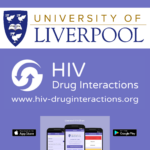 Provides a clinically useful, reliable, comprehensive, up-to-date, evidence-based drug-drug interaction resource freely available to healthcare workers, patients and researchers.
Provides a clinically useful, reliable, comprehensive, up-to-date, evidence-based drug-drug interaction resource freely available to healthcare workers, patients and researchers.
Around 37 million individuals are living worldwide with HIV and although advances in therapy have yielded effective regimens, individual antiretroviral drugs are amongst the most therapeutically risky for drug-drug interactions (DDI) presenting significant risks to patients and a challenge for health care providers to ensure safe and appropriate prescribing. In order to address this, the Liverpool Drug Interactions website was established in 1999 by members of the Department of Pharmacology at the University of Liverpool to provide a freely available drug-drug interaction resource.
Languages: English, Español, Português Checker
HIV Drug Interactions | University of Liverpool Liverpool HIV iChart | Google Play AppLiverpool HIV iChart | Apple Store App Back to top
HIV treatment centres
Historically HIV centres in Greater London were based in hospitals, and today it is still likely you will receive your treatment from one of the HIV treatment centres listed below. Many of the HIV centres listed below do not accept walk-ins, so check beforehand as you will more likely be triaged by clinic staff first.
There is also an ageing cohort of people living with HIV who require more specialised treatment, support and care. As HIV centres tend to concentrate on these cases, there is an expectation younger/ healthier patients receive day-to-day (primary) health care from their GPs but who may not have the necessary expertise.
St Mary’s Hospital
Wharfside Clinic, First floor, Jefferiss Wing, St Mary’s Hospital, Praed Street, London W2 1NY
Jefferiss Wing Centre For Sexual Health
Chelsea and Westminster Hospital
Kobler Clinic, Ground floor, St Stephen’s Centre, Chelsea and Westminster Hospital, 369 Fulham Road, London SW10 9NH
Kobler Outpatient Clinic
Caldecot Centre
Caldecot Centre, Ground Floor, Caldecot Centre, 15-22 Caldecot Road, London SE5 9RS
The Caldecot Centre
Mortimer Market Centre
Bloomsbury Clinic, Capper Street, off Tottenham Court Road, London WC1E 6JB
Bloomsbury Clinic
Royal Free Hospital
Ian Charleson Day Centre, Royal Free Hospital, Pond Street, London NW3 2QG
Ian Charleson Day Centre
Royal London Hospital
Grahame Hayton Unit, Royal London Hospital, Mount Terrace, Whitechapel, London EC1 2BB
Graham Hayton Unit
Guy’s Hospital
Harrison Wing, 2nd floor, Southwark Wing, Guy’s Hospital, Great Maze Pond Road, London SE1 9RT
HIV Harrison wing
North Middlesex University Hospital
Alexander Pringle Centre, North Middlesex University Hospital, Sterling Way, London N18 1QX
Alexander Pringle Centre
56 Dean Street
56 Dean Street, Soho, London W1D 6AQ
56 Dean Street
Dean Street Express
34 Dean Street, Soho, London W1D 4PR
Dean Street Express
Homerton University Hospital
The Jonathan Mann Clinic (JMC), Clifden Centre, Homerton University Hospital, Homerton Row, London E9 6SR
The Jonathan Mann Clinic (JMC)
Mildmay Mission Hospital
 Mildmay is an internationally-renowned specialist HIV hospital at the forefront of HIV and AIDS care, treatment and rehabilitation since 1988, continuing to adapt and respond to meet new, often complex, and rapidly changing needs. It provides structured pathways of rehabilitation, treatment, services and care for people with complex and severe HIV-related health conditions, including HIV-associated brain impairment (also known as HIV-Associated Neurocognitive Disorder, or HAND). It maintains a pool of expertise and knowledge that is unsurpassed in Europe. Mildmay Mission Hospital is located in East London.
Mildmay is an internationally-renowned specialist HIV hospital at the forefront of HIV and AIDS care, treatment and rehabilitation since 1988, continuing to adapt and respond to meet new, often complex, and rapidly changing needs. It provides structured pathways of rehabilitation, treatment, services and care for people with complex and severe HIV-related health conditions, including HIV-associated brain impairment (also known as HIV-Associated Neurocognitive Disorder, or HAND). It maintains a pool of expertise and knowledge that is unsurpassed in Europe. Mildmay Mission Hospital is located in East London.
020 7613 6300 Mildmay Mission Hospital
Mildmay Mission Hospital | 1m 44s
More
Self-test kits | Sexual Health LondonSelf test kits | SH:24 (outside London) Sexual health services listed by London borough | MEN R US
Sexual health services: the United Kingdom and the Republic of Ireland | MEN R US Find or change clinic in the UK | i-base Back to top
After a HIV positive diagnosis
Everyone’s experience of being diagnosed with HIV is different. As the news sinks in and you start to come terms with what it means, you may go through a range of different feelings. You may feel like being by yourself, or being with just your partner, you may want to chat with a close friend, or you may want to speak to a professional counsellor, perhaps at the clinic where you received your diagnosis.
Once you’ve been told your diagnosis you may want to chat with other people who have are HIV positive. A number of organisations run groups where you can share your experiences with other newly diagnosed people, including groups that are just for gay men. You may not necessarily all be going through the same feelings and emotions, or want to ask the same questions, but these groups can be a usefully way to find support and share experiences.
First steps at the clinic
After your HIV diagnosis, several things are likely to happen:
- You will be subjected to a flurry of medical tests to establish your state of health and to what extent the virus is affecting your immune system.
- If appropriate, you may be offered treatments to reduce or stabilise the level of HIV in your body or treatments to help prevent the development of opportunistic infections.
- Depending on your needs, state of health and circumstances, you will be helped to apply for benefits or put in touch with a social worker or home care support team.
There is sometimes an assumption by professionals that because you are gay you know what to do and where to go. This is, of course, not likely to be true where your new HIV diagnosis is concerned. Of course it may be difficult to gauge whether you’re getting the information you need and want, but if you have any doubts ask – or get a second opinion from a helpline or other organisation.
This can be overwhelming, particularly at a time when there is likely to be a lot on your mind and you may be feeling very stressed and emotional. Spare some thought for how you are feeling. Being HIV positive can play havoc with your emotions. Whether you chat regularly with a mate, attend a group, phone a helpline or seek professional help – don’t ignore your feelings. Some find it difficult to ask for help or accept it, but there’s nothing wrong with getting it or asking for it.
We all need help once in a while – it doesn’t mean that we are weak or incapable. Equally, saying ‘no’ doesn’t necessarily mean you are being awkward – so don’t feel guilty or afraid about saying it. The following tips are designed to make getting help and support easier, and so you make decisions which suit you and meet your needs.
- Try to deal with one thing at a time.
- Find a doctor or clinic you like. If you don’t like them, change them.
- Make decisions in your own time.
- Take at least some time to learn more about HIV and how it could affect you. But you don’t have to become an expert or know everything at once. Knowing more will help you feel more in control.
- Consider how you could make your lifestyle healthier. It may include, for example, changes to your diet, having more fun or doing relaxation exercises. Even if you think you’re a sceptic, give it a chance; you can always go back to clubs, drugs, and ready-made-meals – they ain’t going nowhere!
- Listen to your body, it’s usually pretty good at telling you what it likes and doesn’t like. You may take it for granted but it is your friend, get to know and understand it better.
- If there are changes to be made to your life, they are rarely drastic or wholesale and you don’t have to make them all at once. You have time.
- If you’re attending an appointment, there’s nothing to stop you taking someone with you. A little moral support and another pair of ears can be very helpful.
When you are speaking about your HIV, particularly in relation to HIV services, you may come across people whom you don’t know, don’t like or who don’t seem to understand what your needs are. Here are some tips to get you through:
- Be honest and direct – say what’s on your mind.
- Consider taking notes and preparing some questions beforehand. This way you can take the information away and understand it better in your own time.
- Listen to what is being said and think what you want to say next before opening your gob.
- If you’re getting irritable or angry, say so… then take some deep breaths, take a break, or go to the toilet. If you really can’t handle it, leave. You can always go back when you’re ready.
- If you’re told something which you don’t understand, repeat what’s been said in your own words and ask if you’ve understood correctly.
Just found out you are HIV positive… | i-map Gay Men’s Wellbeing | Positively UK
Just found out you’re positive? | Metro Centre
Support group for HIV+ men | London Gay Men’s Group
Living Well | Living Well Beyond positive online magazine | Beyond Positive
Positive Aging in London Forum (HIV) (PAF)
Living with HIV | THT Over 50s LIving with HIV Health, Wealth and Happiness Project | THT
This project supports the financial, emotional and physical well-being of over 50s living with HIV in Brighton, Bristol, London, Manchester and the West Midlands. Whether you’ve been diagnosed recently or have been living with HIV for many years you may find one of its services may be able to help.
Back to top“Al is 26 from Dublin, Ireland and also struggled massively when he was diagnosed a few years ago. “The only shit thing about having HIV is the shock, depression, and anxiety that follows the diagnosis. I felt total panic, thought I couldn’t ever have sex again, that nobody would ever be in a relationship with me. I was severely depressed. I felt lost, lost, lost, for about a year. Doctors were telling me everything would be fine but nothing went into my head,” he recalls. “It all stems from stigma and misunderstanding around HIV”.
The lingering cultural and psychological aversion to HIV belies the incredibly optimistic medical realities. Antiretroviral medication is now so sophisticated that most HIV+ people take one pill a day, which suppresses the virus in the body. This means that HIV+ people on medication have a normal lifespan, live healthily, and can have unprotected sex with their partners without ever transmitting the virus (this is where the slogan U=U, undetectable = untransmittable, comes from).
“I’ve had HIV for six years now and I haven’t sneezed”, jokes Al. “I’m taking the most advanced medication which kills all the HIV in my blood except the dormant cells. I’ve been with my boyfriend (he’s negative) for two years and we don’t have to use condoms because I cant pass the virus on. It’s impossible. Everything is fine”.”
What it’s really like being young and HIV+ in 2019 | Dazed | 28 Feb 2019
Telling others your HIV status
People have different reasons for disclosing their HIV status. For some, it may be to get support or health care whilst others might want their sexual partner(s) to know. You might have met somebody and it’s getting serious, you’re in a relationship or you’re in an open relationship. Or, you might be having sex and ‘something’ comes up … questions are asked … or maybe you just feel you need to say something. It could be none of these and something else.
Whatever reaction you get telling others about your HIV status, being HIV positive is nothing to be ashamed of. Hopefully, those you do tell will respond positively but that’s not the whole picture: some people will respond negatively and reject you. This often changes with time, particularly if they are up to date with advances in treatment and undetectable = transmissible for example … and finding out the facts, rather than clinging onto misconceptions, ignorance, and stigmas about HIV.
THRIVE Written/ Directed by Jamie Di Spirito.
With Taofique Folarin and Ben Aldridge
For some HIV positive gay men, disclosing (telling others) their status can be as stressful or as traumatic as coming out as gay. It is important to think carefully about who you want to tell and why. Once you have told someone about being HIV positive, you cannot take the information back. Coming out is a very personal process and should be your choice.
Obviously, it can feel very natural to want to tell a partner and/ or family immediately but the response may not be what you expect. It certainly doesn’t help to be dealing with other people’s crap while still sorting out your own. If, however, you have decided to come out, the following may be helpful:
- Be aware that telling people may affect you more than you think and they may not react in the way you expect
- People are human: don’t tell people if you don’t want them to tell others
- Try and prepare yourself for the questions they may ask or the issues they may bring up
- Try and choose the right time and place
- Not telling someone about your diagnosis might prevent you getting the medication, support, advice and services you need
How do I disclose my HIV status to potential partners? | i-base
Telling sexual partners about HIV | Terrence Higgins Trust (THT) Things not to say to someone who’s HIV positive | BBC 3 | 15 Sep 2016 | 4m 46s
Should I have to disclose that I’m HIV+ if I’m undetectable? | Kings of Reads | 8 Aug 2019 | 13m 11s Back to top
Peer mentoring
 A peer is someone in a similar position or who shares similar experiences. Peer mentors share their lived experience and knowledge to help and support others.
A peer is someone in a similar position or who shares similar experiences. Peer mentors share their lived experience and knowledge to help and support others.
HIV peer mentors are living with HIV so have an understanding of what you may be going through and what your diagnosis means. They can be a listening ear, share experiences and discuss support options. A diagnosis of HIV can bring up a range of emotions, so a mentor can be especially helpful if you don’t have anyone to talk to about how you are feeling.
Peer mentoring takes place one-on-one or in group meetings, in person, online, or on the phone. Following a short assessment, you will be matched with a peer mentor who will have the appropriate training and/ or accreditation. Depending on your needs, you can have a one-off session or arrange to see a peer mentor over several sessions.
Peer mentors usually provide support with the following
- Coming to terms with your diagnosis
- Taking and adhering to medication
- Improving your understanding of HIV and treatment
- Managing any side effects from medication
- Getting the most out of clinic appointments
- Taking greater care of your health and wellbeing
- Reduce feelings of isolation, improve confidence and self-esteem
- How (if and when) to share your status with others
- Having sex and managing sexual relationships
- Talking about HIV with confidence
HIV organisations in London providing peer support include [1]
- Positively UK
- Positive East
- Terrence Higgins Trust (THT)
- Bloomsbury Network
- Metro Charity
- Plus Health
- Naz Project
- Africa Advocacy Foundation
Also, ask HIV centres in London (where you may be registered) if they provide peer support.
[1] Last checked mid-2023.
The difference the HIV peer mentor project has made – HIV Peer Mentor Project | Transformation Partners in Health and Care | 6 Jan 2023 | 1m 23sFind Your Four: Peer Mentor Video #1: The Power of Peer Support | Gilead | 21 Oct 2021 | 4m 29s Back to top
Living well with HIV
 Living well with HIV means different things to different people living with HIV. Some take the pills and are out the door; others are methodical in managing the condition, while others are somewhere between. But while people with HIV live longer, we do not necessarily live well with HIV.
Living well with HIV means different things to different people living with HIV. Some take the pills and are out the door; others are methodical in managing the condition, while others are somewhere between. But while people with HIV live longer, we do not necessarily live well with HIV.
Just having an undetectable viral load doesn’t eliminate the challenges that come with living with a chronic health condition – and a heavily stigmatised one (depending on who you ask). But, onwards and upwards, here are our top tips for living well with HIV. The links go to other parts of this website, where you will find details of relevant organisations and services – specialising in providing practical advice and support for everyone living with HIV.
Take your HIV medication as prescribed and attend appointments with your HIV clinic
HIV treatment | MEN R USUnderstanding undetectable = untransmittable (U=U) | MEN R US
HIV treatment centres | London | MEN R US
Some provide in-house counselling and support groups
HIV Drug Interaction Checker | MEN R US
Exercise regularly and manage your emotional and mental health
Get out and active | MEN R USYour mental health matters | MEN R US
Finding a counsellor or therapist | MEN R US
Some HIV centres provide in-house counselling and support groups
Mental health support directory | MEN R US
Manage your alcohol intake and recreational drug use
A little bit about alcohol MEN R USSafer drug use, or harm reduction, and why it matters | MEN R US
Safer chemsex | MEN R US
HIV Drug Interaction Checker | MEN R US
Give up smoking
About smoking | MEN R USQuitting smoking | MEN R US
Get regular sexual health check-ups
Sexual health clinics | MEN R USSexual health clinics (London) | MEN R US
Sexual Health London | MEN R US
SH:24 (outside London) | MEN R US
HIV co-infection with hepatitis B and/ or C
Hepatitis | MEN R USHepatitis C and chemsex | MEN R US
Consider a welfare and benefits check
Ask your HIV clinic or search your local authority’s website.
Combating HIV stigma
HIV stigma | MEN R USMore
Living well with HIV | THTLiving Your Best Life with HIV | Positively UK
Living with HIV and AIDS | NHS
UK Community Advisory Board (UK-CAB)
HIV treatment information and advocacy | i-base
Life expectancy for people living with HIV | nam aidsmap
Health insurance for people with HIV | nam aidsmap
Living with HIV | Avert
Living Well
The Body
News
No ‘4th 90’ — Why living well is not a goal when it comes to HIV | Politico | 9 Oct 2023Fears that ‘historic and pioneering goal’ of no new HIV cases by 2030 could be missed | Liverpool Echo | 7 Oct 2023
Older people are living longer with HIV across the UK, which is a cause for celebration | Royal College of Nursing | 27 Jul 2023
NHS is ‘failing’ patients living with HIV | BBC | 5 Mar 2023
Late HIV diagnosis of older people is an increasing problem, in most parts of the world | nam aidsmap | 15 Mar 2022
Ageing with HIV | The Lancet | 23 Feb 2022
Through Positive Eyes: living with HIV and Aids – a photo essay | The Guardian | 1 Dec 2020
How should we care for older people with HIV? | nam aidsmap | 19 Now 2020
Rise in new HIV cases in over-50s – study | BBC | 27 Sep 2017
Living with HIV: six very different stories | The Guardian | 22 Mar 2015
Ageing Britons with HIV need more support, say nursing chiefs | The Guardian | 15 Jun 2014
Growing old with HIV | The Guardian | 11 Sep 2013
Meeting the evolving needs of people living with HIV | nature portfolio
Growing old with HIV: Challenges and opportunities | Medical News Today Back to top
Living with HIV magazines
 There are several magazines that we could find for people living with HIV in print and online formats.
There are several magazines that we could find for people living with HIV in print and online formats.
Let us know if you think there is a publication that should include.
Beau Magazine | UKProduced and developed by and for gay, bi and queer men from the beautiful HIV community. Poz | USA
The premier HIV/AIDS advocacy, lifestyle, treatment and information resource. Plus | USA
The country’s largest publication aimed at people with HIV and those who care about them. Postive Life NSW | Australia
The largest peer-led and run representative body of people living with HIV in Australia based in NSW. Back to top
Undetectable = Untransmittable
 U=U means Undetectable = Untransmittable which means if someone with HIV has an undetectable viral load then they cannot pass on the virus through sex. The PARTNER Study says:
U=U means Undetectable = Untransmittable which means if someone with HIV has an undetectable viral load then they cannot pass on the virus through sex. The PARTNER Study says:
“Our results provide a similar level of evidence on viral suppression and HIV transmission risk for gay men to that previously generated for heterosexual couples and suggest that the risk of HIV transmission in gay couples through condomless sex when HIV viral load is suppressed is effectively zero. Our findings support the message of the U=U (undetectable equals untransmittable) campaign and the benefits of early testing and treatment for HIV.”
HIV organisations across the world have joined the U=U campaign to endorse the statement that HIV sexual transmission does not occur when viral load is undetectable on HIV medication or antiretroviral therapy (ART). While the impact of HIV medication on reducing HIV transmission has been known for a long time, it’s new to say ART stops sexual transmission completely. This change is especially important given that prejudice and discrimination against HIV positive people is still widespread.
U=U: Undetectable = Untransmittable | i-base“An end to the AIDS epidemic could be in sight after a landmark study found men whose HIV infection was fully suppressed by antiretroviral drugs had no chance of infecting their partner. The success of the medicine means that if everyone with HIV were fully treated, there would be no further infections.”
End to AIDS in sight as huge study finds drugs stop HIV transmission | The Guardian | 2 May | 2019“A study of nearly 1,000 gay male couples in The Lancet found no cases of HIV transmission over eight years. This was due to treatment reducing the virus to very low levels in the body. “Undetectable equals untransmittable” should be basic HIV knowledge for everyone, experts said.”
Gay HIV transmission with treatment is ‘zero risk’, study confirms | BBC | 3 May 2019“Our results provide a similar level of evidence on viral suppression and HIV transmission risk for gay men to that previously generated for heterosexual couples and suggest that the risk of HIV transmission in gay couples through condomless sex when HIV viral load is suppressed is effectively zero. Our findings support the message of the U=U (undetectable equals untransmittable) campaign, and the benefits of early testing and treatment for HIV.”
Risk of HIV transmission through condomless sex in serodifferent gay couples with the HIV-positive partner taking suppressive antiretroviral therapy | The PARTNER Study | The Lancet | 2 May 2019
What does undetectable = untransmittable (U=U) mean? | namaidsmap
What is an undetectable viral load? | Avert
Can’t pass it on | Terrence Higgins Trust The PARTNER Study | Alison J. Rodger, Valentina Cambiano, Tina Bruun, et al | 12 Jun 2016
Opposites Attract Study | Bavinton et al, and the Opposites Attract Study Group
Consensus statement | Prevention Access Campaign The evidence for U=U: why negligible risk is zero risk | i-base | 9 Aug 2017
Consensus Statement | Prevention Access Campaign | 21 Jul 2017
NAM endorses Undetectable equals Untransmittable (U=U) | NAM aidsmap | 9 Feb 2017
U = U is out there | Ending HIV | 16 Dec 2019 | 1m
One of those chats | Ending HIV NZ | 31 May 2018 | 1m
Zero Risk | Dr Carl Dieffenbach | Prevention Access Campaign | 14 Nov 2016
Undetectable Viral Load & The Sex You Want | Gay Men’s Sexual Health Alliance | 24 Jul 2017 | 2m 30s
Bug chasing
 Bug chasing is the practice of intentionally seeking HIV infection through sexual activity. It is also called ‘pozzing’, ‘stealthing’, ‘breeding’ and ‘gift giving’. The term seems to have first appeared in a 2003 Rolling Stone magazine article: “Bug Chasers: The Men Who Long to be HIV+”, but it would be naive to think bug chasing wasn’t happening before this time.
Bug chasing is the practice of intentionally seeking HIV infection through sexual activity. It is also called ‘pozzing’, ‘stealthing’, ‘breeding’ and ‘gift giving’. The term seems to have first appeared in a 2003 Rolling Stone magazine article: “Bug Chasers: The Men Who Long to be HIV+”, but it would be naive to think bug chasing wasn’t happening before this time.
Motivations behind bug chasing can be complicated, but reasons and thinking include
- an ultimate taboo (one of the most extreme sex acts left)
- the excitement in pursuing a dangerous activity
- intimacy and eroticism (sexually stimulating)
- a fetish
- a sexual fantasy
- validation and acceptance
- a shared identity (sense of belonging) within the HIV-positive community
- to rebel or transgress against accepted social norms/ behaviours
- HIV fatigue (easier to have HIV than prevent getting it)
- low self-esteem or worthlessness
- trauma
There is likely a tension between the fantasy and actual behaviour and, for many, bug chasing is just a sexual fantasy not acted upon. Bug chasing is believed to be a minority practice and/ or not representative of GBMSM and the wider LGBTQ+ community.
Bug chasing with multiple partners increases the risk of contracting different HIV virus strains. These may be resistant to medication, making HIV more difficult to treat and potentially leading to serious health issues. One should be mindful that those engaging in bug chasing may be struggling with mental health issues, problematic drug use, and/ or addiction.
Given the widespread success of HIV treatment and PrEP and greater awareness of U=U (Undetectable = Untransmittable) bug chasers have fewer opportunities to contract HIV. In porn, it’s also worth mentioning that when a guy asks another to give him his ‘poz load’, you don’t know if they are both HIV positive or if one is HIV positive on meds but the other is on PrEP.
Updating this November 2023, one of our volunteers (who states his HIV-positive status on his app profile) says he’s asked every few months if he’ll poz someone including coming off his meds to do so. He has also been asked in person but this is rare.
Bugchasing | WikipediaReinfection with HIV | i-base
Resistance and changing your treatment | THT PrEP (pre-exposure prophylaxis)
Undetectable = Untransmittable
HIV treatment Bug Chasing Featured in a Commercial Bareback Porn Production | Curious Chaser | 4 Jun 2023
What is the Definition of Bug Chasing? | Curious Chaser | 21 May 2022
Bug Chasers: Do You Really Wanna Go There? | HIV.net | 27 Jan 2021
Writing bugchasing ethnoperformance: Creative representations of online interactions | PDF | Jaime Garcı´a-Iglesias | Sage Journals, Vol. 24, Issue 1-2 | 16 Mar 2020
The HIV ‘Bug Chaser’ Who Changed His Mind | My Fabulous Disease | 13 Jan 2020
Do some people really want to get HIV? | The University of Manchester | 18 Oct 2018
Do some people really want to get HIV? I spoke to ‘bug chasers’ around the world to find out| the conversation | 18 Oct 2018
The ‘Sex Roulette’ Parties Where One Guest Is Secretly HIV-Positive | Vice | 18 May 2016
Generationing, Stealthing, and Gift Giving: The Intentional Transmission of HIV by HIV-Positive Men to their HIV-Negative Sex Partners | National Library of Medicine | 6 Nov 2014
HIV ‘bug chasers’: Fantasy or fact? | BBC News | 10 Apr 2006
Bug Chasers: The men who long to be HIV+ | PDF | Rolling Stone | 6 Feb 2003
Briton faces storm over HIV ‘thrill seeker’ claim | The Guardian | 26 Jan 2003 Back to top
Living older with HIV
What is “successful ageing” for people living with HIV? | NAM aidsmap | 26 Aug 2017Uncharted Territory: The first generation growing older with HIV | THT
Living with HIV and mental health | NAM aidsmap
Life expectancy for people living with HIV | NAM aidsmap
HIV, sexual health and ageing | THT
Ageing with HIV | George House Trust Back to top
HIV/ AIDS and COVID-19: Connections
 Welcome to a selection of timely and thought-provoking articles about COVID-19 and HIV by people who remember – and lived through – the HIV and AIDS pandemic. They discuss similarities between the two pandemics, flashbacks, isolation and loneliness, survival skills, and lessons to be learnt. We will add more as we find them.
Welcome to a selection of timely and thought-provoking articles about COVID-19 and HIV by people who remember – and lived through – the HIV and AIDS pandemic. They discuss similarities between the two pandemics, flashbacks, isolation and loneliness, survival skills, and lessons to be learnt. We will add more as we find them.
“Report assessing the impact of the COVID-19 pandemic on prevention, testing, diagnosis and care for STIs, HIV and hepatitis in England.”
COVID-19: impact on STIs, HIV and viral hepatitis | GOV | 15 Dec 2020
“At the very least, would it not be logical to look towards the struggle against HIV as a learning tool? The mode of transmission may differ from COVID-19, but there are many overlaps with the AIDS crisis: a lack of rigorous testing, a political approach ruled by ideological bias, and a public polarised by inflammatory rhetoric. This would not erase our problems, but perhaps we would be equipped to face them with more clarity. Yet, here we are, 24 years after the AIDS crisis’ peak, when a Lazarus combination of protease inhibitors stopped victims dying en masse, and the commentariat reminisces on warfare and century-old flu.”
Have we already forgotten the AIDS crisis? | Huck Mag | 5 Nov 2020
“And then, this year, the new coronavirus arrived — a second deadly pathogen for them to face some 35 years after the initial horrors they experienced as younger men. For some clients, Ware saw the emotion return in flashbacks. Shock. Fear. Sadness. Fatigue. He saw hyper-vigilance and fatalistic thinking.”
‘Not again’: For gay men in Houston, COVID brings up familiar feelings of AIDS crisis | Houston Chronicle | US | 3 Dec 2020
“One thing I have learned is that I don’t expect anybody else to protect me. I know that I’ve got to do my own self-protection, and I know that I feel better if I’m giving back,” James Cox said. “What HIV taught me is that I’m resilient. Part of that resiliency is passion and purpose.”
Far from over: Long-term HIV, AIDS survivors navigate another pandemic | Street Root News | Jessica Pollard | 24 Jun24 Jun 2020
“Societies facing pandemics move through a version of Kübler-Ross’s famous stages of grief—denial, anger, depression, and so on.”
10 lessons from HIV for the COVID-19 response | Open Society Foundations | Daniel Wolfe | 12 Jun 2020
“I’m living proof that there can be life after a deadly virus. My personal panic about the current coronavirus crisis is interwoven with my memories of facing another virus, HIV.”
I’m an AIDS survivor and Covid-19 is giving me flashbacks | Angela Page HuffPost | 23 May 2020
“In the 1980s and ’90s, AIDS taught us to look after each other, put human dignity first and insist that governments step up. This is no time to defer to power.”
I lived through the AIDS crisis: like then, citizens must take control | Jonathan Cooper | Open Democracy | 17 Apr 2020
“The lessons we learn from this will be useful. Here’s to hoping we don’t put them on a shelf.”
COVID-19 and HIV are not the same. But they’re similar in many ways that matter | HIV/AIDS Resource | Mathew Rodriguez | 9 Apr 2020
“What are the similarities and differences between the HIV and COVID-19 pandemics? In what ways are they comparable? Might it be offensive or “triggering” to those who survived the HIV/AIDS pandemic to compare COVID-19 to this period in time?”
HIV/AIDS in Contrast with the COVID-19 Pandemic: Lessons in History | Medium: Think Queerly | 10 Apr 2020
“The Aids crisis has taught us many things – and continues to do so. One of the key lessons is to trust science, and the robust (often long) scientific processes that deliver reliable results.”
Lessons of Aids for COVID-19: Don’t sacrifice science to expediency | The Maverick Citizen | Robin Gorna | 9 Apr 2020
“Some of them are now senior citizens: vulnerable again, mistrustful of government directives about coronavirus and unable to organize.”
For HIV survivors, a feeling of weary déjà vu | New York Times | Jacob Bernstein | 8 Apr 2020
“The reason that the AIDS movement was able to force the country to change was because we had a collective identity that was global, and people with AIDS joined together.”
Lessons the AIDS epidemic has for Coronavirus | CNN Politics | Sarah Schulman | 5 Apr 2020
“The coronavirus pandemic also dredged up traumatic memories for people who lost friends and family in the HIV/AIDS crisis.”
Isolation and HIV memories hit LGBT+ elderly hard in lockdowns | Rachel Savage and Oscar Lopez | Openly | 30 Mar 2020
“Now, the fear has returned, along with another familiar emotion: resolve. Most people will get through COVID-19, though not unscathed. So here are a few other lessons from living through HIV.”
How to survive yet another plague: I lived through the AIDS epidemic – here’s how to live through coronavirus | Buzz Feed | Mark Shoofs | 20 Mar 2020
“People ask me if our lives today feel like the early years of HIV/AIDS, and I want to scream. There is no comparison. Just stop. No one cared about people dying of AIDS in the early years of the pandemic. The stock market didn’t budge. The President didn’t hold news conferences. Billions of dollars were not spent.”
Stop comparing Coronavirus to early HIV/AIDS. Just stop | My Fabulous Disease | Mark S King | 14 March 2020
Back to top
CIHRRC
 The Canada-International HIV and Rehabilitation Research Collaborative (CIHRRC) is an international research collaborative that includes people living with HIV, researchers, clinicians, representatives from community-based HIV service organizations, and policy stakeholders with an interest in HIV and rehabilitation research.
The Canada-International HIV and Rehabilitation Research Collaborative (CIHRRC) is an international research collaborative that includes people living with HIV, researchers, clinicians, representatives from community-based HIV service organizations, and policy stakeholders with an interest in HIV and rehabilitation research.
CIHRRC broadly defines rehabilitation as:
“Any services or activities that address or prevent impairments, activity limitations, and social participation restrictions for people living with HIV”
[Worthington C, Myers T, O’Brien K, Nixon S, & Cockerill R. (2005). Rehabilitation and HIV/AIDS: Development of an expanded conceptual framework. AIDS Patient Care and STDs, 19, 258-71].Examples include
- physical therapy
- occupational therapy
- speech-language pathology
- physiatry (rehabilitation medicine)
- services provided through community-based organizations
Finding out more
If you are living with HIV and/ or getting older you may find CIHRRC’s research both interesting and of value. In addition to the written research, its website includes over 60 presentations filmed by Three Flying PIglets, part of the Gay Men’s Health Collective.
Back to topHIV stigma
HIV stigma
 In many ways, ignorance, fear, and stigma have come to define the HIV and AIDS epidemic that swept across the world in the 1980s. It killed thousands upon thousands, some of whom had only a few weeks or months from diagnosis to death, even if they were diagnosed before they died.
In many ways, ignorance, fear, and stigma have come to define the HIV and AIDS epidemic that swept across the world in the 1980s. It killed thousands upon thousands, some of whom had only a few weeks or months from diagnosis to death, even if they were diagnosed before they died.
Since the 1980s, the HIV/ AIDS landscape has changed beyond recognition with enormous strides in treatment and care. Today, HIV is commonly recognised as a chronic disease that can be successfully managed on a long-term basis. Nevertheless, people living with HIV continue to face stigma and discrimination, and it remains a major issue.
HIV stigma appears in many forms and ranges from rejection by friends, family or partners to being physically assaulted. It’s also a distinctly unattractive trait among some gay men using hook-up web apps.
stigma ˈstɪɡmə/ noun
Mark of shame and humiliation often driven by views, beliefs and assumptions we make about people. Makes it more likely that people will be singled out, ostracised, or marked out as strange, different (not in a nice way) and, in some cases, thought of as dangerous. Stigma is crippling, bringing on feelings of isolation, shame, hopelessness, blame, self-hatred, which often prevents people from seeking help and support.
What is HIV stigma?
HIV stigma is negative attitudes and beliefs about people with HIV. It is the prejudice that comes with labelling an individual as part of a group that is believed to be socially unacceptable. Examples include:
- Believing that only certain groups of people can get HIV
- Making moral judgments about people who take steps to prevent HIV transmission
- Feeling that people deserve to get HIV because of their choices
Real or imagined, HIV stigma often fuels myths and misconceptions about HIV and people living with HIV, and there are reasons for this:
- If undiagnosed and untreated, HIV remains a serious, life-threatening health condition.
- Some people have strong views about sexual behaviour, often rooted in faith and religion. They may think that there are situations in which sex is wrong or that certain people shouldn’t behave in particular ways.
- There is a long history of illnesses and diseases being stigmatised, including tuberculosis, cancer and, more recently, monkeypox.
- People who don’t understand HIV transmission and/ or Undetectable = Untransmittable (U=U)
What is discrimination?
While stigma refers to an attitude or belief, discrimination is the behaviour that results from those attitudes or beliefs. HIV discrimination is the act of treating people with HIV differently than those without HIV. Examples include:
- A healthcare professional refusing to provide care or services to a person living with HIV
- Refusing to touch someone living with HIV, casual and/ or sexual contact
- Socially isolating a member of a community because they are HIV positive
- Hook-up profiles that say someone won’t meet anyone with HIV (sometimes saying they are “clean”).
What are the effects of HIV stigma and discrimination?
HIV stigma and discrimination affect the emotional well-being and mental health of people with HIV. People with HIV often internalise (bury inside) the stigma they experience and begin to develop a negative self-image. They may fear they will be discriminated against or judged negatively if their HIV status is revealed. “Internalized stigma” or “self-stigma” happens when a person takes in the negative ideas and stereotypes about people with HIV and start to apply them to themselves. HIV internalised stigma can lead to feelings of shame, fear of disclosure, isolation, and despair. These feelings can also keep people from getting tested and treated for HIV.
What can be done about HIV stigma?
- Ending HIV stigma is more than a soundbite or a slogan
- We can all help through our words and actions in our everyday lives
- Get the facts about HIV and know about Undectable = Untransmittable (U=U)
- Know how HIV stigma affects people living with HIV
- Talking openly can normalise the subject and start conversations
- Educate and inform others, correcting misinformation and misconceptions
- The words we use matter: choose them carefully using preferred terms
- Be inclusive, speak up, and stand tall
“Many people have fears, prejudices or negative attitudes about HIV. Stigma can result in people living with HIV being insulted, rejected, gossiped about and excluded from social activities. At its extreme, stigma can drive people to physical violence.
People living with HIV often feel nervous about telling others that they have HIV due to the fear of stigma or discrimination. This can lead to isolation and feeling unsupported, which can have a significant impact on health and wellbeing.
Stigma, whether perceived or real, often fuels myths, misconceptions and choices, impacting people’s HIV education and awareness. It can result in people with HIV believing some of the things that other people say about HIV, even when these are not true.”
What is stigma? | NAM aidsmap
More
What is stigma? | NAM AidsmapStigma Language Guide | CDC | US
HIV stigma and discrimination | Avert
Stigma and HIV | Terrence Higgins Trust
The Positive Effect | The Positive Effect
Ending HIV | It’s time to end HIV Stigma | AU
Tackle HIV | THT/ ViiV HIV testing | MEN R US
HIV treatment | MEN R US
Understanding undetectable = untransmittable (U=U) | MEN R US
PrEP | MEN R US
News
New data exposes shocking stigma and discrimination against people living with HIV | THT | 1 Dec 2022Fighting HIV Stigma and Proud: march, vigil and rally | THT | 1 October 2022
How do people feel after disclosing their HIV status on social media? | nam aidsmap | 20 May 2022
More straight people are catching HIV than gay men for first time in a decade | Metro | 7 Feb 2022
BBC News – HIV: People with virus or taking PrEP to be allowed to join armed forces | BBC | 2 Dec 2021
BBC News – HIV: The misinformation still circulating in 2021 | BBC | 1 Dec 2021
The end of HIV transmission in England is within sight, but we can’t be complacent | The Guardian | 1 Dec 2021
HIV diagnosis: Marlon Van Der Mark tackles stigma | BBC News | 23 Nov 2021
People living with HIV in the media: irresponsible, unhealthy and ‘other’ | nam aidsmap | 8 Oct 2021
The hardest outcome of all: HIV and suicide | nam aidsmap | 11 Aug 2021
Home Office failed to put in place system to protect detainees with HIV | The Guardian | 30 Jul 2021
Stigma, discrimination and lack of understanding about HIV persist 40 years after first reported cases, new research finds | NAT | 29 Jul 2021
HIV-related stigma in the UK then and now: to what extent are we on track to eliminate stigma? A qualitative investigation | BMC | 30 May 2021
The single biggest risk factor for gay, bi men becoming HIV positive | Plus | US | 24 Sep 2020
Gareth Thomas and HIV stigma: ‘It takes people like him to fight against it’ | BBC | 15 Sep 2019
Meghan and Harry pay touching tribute to Princess Diana’s HIV work to mark first day of Pride Month | Evening Standard | 1 Jun 2019
Being black and gay: how intersectional stigma impacts on the uptake of PrEP | NAM aidsmap 17 May 2019
HIV criminalisation cases recorded in 72 countries, including 49 in the last four years | NAM aidsmap | 3 Jun 2019
Stigma, access and testing: why HIV is still rising in Europe | NAM aidsmap | 11 Dec 2018
Tackling HIV stigma in the health service | The King’s Fund | 1 Dec 2018
The stigma of HIV still remains | The Guardian | 15 Aug 2013
End stigma around HIV testing, says Prince Harry | Guardian News | Guardian News | 17 Nov 2018 | 2m 11s
Grindr Users Talk About HIV Stigma | Grindr | 9 Oct 2018 | 4m 48s
Living with the Stigma of HIV | BBC Three | 14 Jul 2018 | 3m 25s
Our treatment of HIV has advanced. Why hasn’t the stigma changed? | TED Talks | 25 Jan 2018 | 17m 6s
HIV: living with the stigma | Channel 4 News | 17 Dec 2015 | 5m 12s
Living with the stigma of HIV | Michael Rizzi | 24 Nov 2015 | 6m 48s
The stigma of HIV/AIDS: connecting the dots | RYOT | 21 Apr 2015 | 2m 58s
Luke on HIV stigma | Saving Lives @ Heart of England NHS Foundation Trust | 21 Nov 2014 | 1m 6s
HIV stigma: I have judged.. other people are going to judge me | HIV Foundation Queensland | 16 Jun 2014 | 9m 12s
The day I found out I was HIV positive | ImFromDriftwood | 8 Jun 2012 | 3m 2s
HIV Stigma Index Worldwide
The People Living with HIV (PLHIV) Stigma Index is a standardized tool to gather evidence on how stigma and discrimination impacts the lives of people living with HIV. It was developed to provide much-needed data and evidence that could be used to advocate for the rights of people living with HIV.
People living with HIV stigma index (worldwide) | Stigma Index
Fast-Track Cities London: tackling HIV stigma
 During the latter part of 2021, Fast-Track Cities launched a £300,000 fund for six projects to deliver empowerment training and personal development to tackle the internal stigma that people living with HIV experience. The six winning projects will be targeting a diverse range of communities typically experiencing higher levels of internalised stigma and less likely to engage with services or search out support. The six contracts have been awarded to the following voluntary and community sector organisations:
During the latter part of 2021, Fast-Track Cities launched a £300,000 fund for six projects to deliver empowerment training and personal development to tackle the internal stigma that people living with HIV experience. The six winning projects will be targeting a diverse range of communities typically experiencing higher levels of internalised stigma and less likely to engage with services or search out support. The six contracts have been awarded to the following voluntary and community sector organisations:
- Positive East
Will be offering three targeted courses supported by Action Learning Sets with three groups of people: women, African communities, and gay men from emerging communities. - 4M Mentor Mothers Network and NAM aidsmap
Will develop a women’s network and virtual training, face-to-face empowerment training and work to consolidate the network, and form a Community of Practice and develop reporting. - Terrence Higgins Trust
Will deliver four cohorts of peer learning sessions run by people living with HIV. Consist of understanding stigma/self–stigma, understanding HIV and (U=U/ can’t pass it on), building confidence and self-esteem and building resilience for the future. - The Love Tank
Will recruit, train and support 12 gay men living with HIV (over-serving migrant men, men of colour, men who don’t have English as a first language. - Positively UK
Will deliver their training programme in partnership with two HIV clinics (North Middlesex and Homerton). Seven topics to dismantling stigma over seven weeks, gradually building knowledge, confidence and connections to promote self-respect, self-acceptance and pride. - Metro and NAZ
Will deliver an audio-visual project that zeroes in on the experiences of three marginalised groups within Latin American communities; trans people, MSM and women.
Looped In
 Looped in offers people living with HIV in the UK a range of trusted content developed for different audiences – from people living with HIV to friends, sexual partners, family and medical professionals. Looped in allows people living with HIV to select the content they want to share and send it to who they want to.
Looped in offers people living with HIV in the UK a range of trusted content developed for different audiences – from people living with HIV to friends, sexual partners, family and medical professionals. Looped in allows people living with HIV to select the content they want to share and send it to who they want to.
According to HIV in the UK statistics 2017 from the National AIDS Trust, it’s estimated there are 101,600 people living with HIV and 92% of these people are diagnosed – this still means that around 1 in 12 people living with HIV in the UK do not know that they have the virus. 98% of people diagnosed with HIV in the UK are on treatment. 97% of those on treatment are virally suppressed, which means they can’t pass the virus on. Of all the people living with HIV in the UK (diagnosed and undiagnosed), 87% are virally suppressed.
Looped In | National AIDS Trust Looped In | National AIDS Trust | 4 Jun 2019 | 1m 11s Back to topThe Positive Effect
 The Positive Effect connects the lived experience of those both managing and preventing HIV with facts and evidence to correct the misinformation and fear that underlies and perpetuates stigma. The website includes stories (film, audio and written), erasing stigma, testing for everyone, care and prevention; and there’s’ a blog.
The Positive Effect connects the lived experience of those both managing and preventing HIV with facts and evidence to correct the misinformation and fear that underlies and perpetuates stigma. The website includes stories (film, audio and written), erasing stigma, testing for everyone, care and prevention; and there’s’ a blog.
The Positive Effect is collaboratively designed by scientists, medical experts, community leaders and people with living with HIV in Canada. It promotes authentic, ongoing and high-energy engagement across Canada of those dedicated to wiping out HIV stigma, which impedes testing, prevention efforts, and contributes to further health inequities across communities.
The Positive EffectFilmed in Toronto, Canada, Three Flying Piglets, part of the Gay Men’s Health Collective, is immensely proud to have contributed to the Positive Effect – making a series of short films about HIV Peer Researchers living with HIV, their work and HIV stigma.
The Positive Effect Promo | The Positive Effect | June 2018 HIV Peer Researchers in Conversation 1/7 (Wa) | 5m 16sHIV Peer Researchers in Conversation 2/7 (Pa) | 6m 37s
HIV Peer Researchers in Conversation 3/7 (Ma) | 7m 35s
HIV Peer Researchers in Conversation 4/7 (Ly) | 11m 57s
HIV Peer Researchers in Conversation 5/7 (Ja) | 8m 21s
HIV Peer Researchers in Conversation 6/7 (Ev) | 6m 50s
HIV Peer Researchers in Conversation 7/7 (An) | 4m 44s Back to top
HIV organisations and campaigns
HIV organisations, campaigns and support groups
There have been huge strides in HIV treatment, most recently PrEP has arrived, and the Fast Track Cites movement aims to end new HIV infections and stop preventable HIV deaths by 2030. Nevertheless, there is a way to go, particularly in ending discrimination and stigma associated with HIV.
Organisations today are as vital as they are eclectic in what they do; to name a few:
- Food Chain delivers meals and groceries to people living with HIV
- International HIV Partnerships (IHP) supports, builds and implements visionary advances towards sexual health, mental health and social wellbeing
- UK Community Advisory Board (UK-CAB) is a peer-led network which aims to empower people living with HIV
- HIV i-Base provides timely and up-to-date information about HIV treatment to HIV-positive people and health care professionals.
HIV Interaction Checker is a truly invaluable tool with free, comprehensive and user-friendly drug interaction charts - National AIDS Trust is the UK’s HIV rights charity working to stop HIV from standing in the way of health, dignity and equality
- Fast Track Cities London aims to get to zero new HIV infections, zero preventable deaths and zero stigma by 2030, making sure everyone with HIV is living well.
And there are many others, large and small, funded, peer-led, and voluntary – providing support for those newly diagnosed, a better understanding of HIV treatments, community groups and meet-ups to connect people living with HIV, and the history and legacy of HIV and AIDS wrought many decades.
Back to topNational AIDS Trust
 The National AIDS Trust (NAT) was founded in 1987 as a non-government organisation (NGO) by the Department of Health, in order to deal with the escalating concern with HIV and AIDS nationally. Today NAT’s funding comes from public donations, corporate supporters, grant-making trusts and foundations and its own fundraising work – it doesn’t receive funding from the UK Government. NAT is a policy and campaigning charity, working to improve the national response to HIV through policy development, expertise, and the provision of practical resources rather than through offering direct support services to people living with HIV.
The National AIDS Trust (NAT) was founded in 1987 as a non-government organisation (NGO) by the Department of Health, in order to deal with the escalating concern with HIV and AIDS nationally. Today NAT’s funding comes from public donations, corporate supporters, grant-making trusts and foundations and its own fundraising work – it doesn’t receive funding from the UK Government. NAT is a policy and campaigning charity, working to improve the national response to HIV through policy development, expertise, and the provision of practical resources rather than through offering direct support services to people living with HIV.
Alarming trend for cutting or completely decommissioning HIV support services
Freedom of Information requests have exposed an alarming trend for cutting or completely decommissioning HIV support services across England and Wales. In England there was an average cut of 28% in expenditure for HIV support services between 2015/16 and 2016/17. The regional variation in cuts is enormous, with some areas entirely losing support for people living with HIV.
NAT also has a comprehensive range of resources available including: HIV in the future NHS, why PrEP is needed, your rights: a guide to human rights and HIV, your voice: a guide to disclosure and HIV, using the global evidence base to reduce the impact of HIV stigma, how NHS overseas visitors charges apply to migrants and asylum seekers in England, preparing for Personal Independence Payment (PIP), and tackling HIV discrimination at work.
HIV support services: The state of the nations | National AIDS Trust | Mar 2017Why we need HIV support services: A review of the evidence | National AIDS Trust | Mar 2017 National AIDS Trust | National AIDS Trust
National AIDS Trust Back to top
NAM aidsmap (Closed)
 NAM was a charity based in the United Kingdom. It worked to change lives by sharing information about HIV and AIDS believing independent, clear and accurate information was vital in the fight against HIV and AIDS.
NAM was a charity based in the United Kingdom. It worked to change lives by sharing information about HIV and AIDS believing independent, clear and accurate information was vital in the fight against HIV and AIDS.
Closure: Summer 2024
“With heavy hearts, we announce the proposed closure of our beloved charity, NAM aidsmap, this month. After 37 years of pioneering health journalism, community engagement, and empowerment through information, we will cease operations this summer. We are incredibly proud of the millions we’ve reached worldwide and the grassroots ingenuity and commitment of our team and partners.
NAM was founded by volunteers at London Lesbian and Gay Switchboard in 1987, at a time when there was no effective treatment for HIV, when AIDS hysteria was widespread and there was very little reliable information. The National AIDS Manual, then a ringbound folder, swiftly became an important, evidence-based, reference point for professionals as well as people diagnosed with HIV and AIDS. aidsmap has remained a source for accurate and reliable HIV information over the years, covering key scientific events and making information about treatment, prevention and support accessible to wider audiences. aidsmap has supported people with HIV to access and engage with healthcare and the lifesaving medication that is now available; we have advocated for PrEP and have been a key player in endorsing and disseminating the knowledge that effective HIV treatment means no risk of sexual transmission (aka UequalsU).
As you may know, the HIV sector faces numerous challenges and uncertainties. With broader access to prevention and treatment, and more widely accessible information, it has become increasingly difficult for us to secure funding amidst rising costs. Regrettably, the Board of Trustees has made the difficult decision to propose to close aidsmap in July. Despite exploring alternatives, we do not see a sustainable path forward. We must make this decision while still solvent to ensure a respectful and orderly wind-up for our staff, freelancers, partners, funders, beneficiaries, and suppliers. We extend our heartfelt thanks to everyone who supported our vision for a world where HIV is no longer a threat to health or happiness. Together, we have made a difference.”
NAM aidsmap Back to topNAM Aidsmap has been an unparalleled information resource for people living with HIV and AIDS. Above all, it made the complex simpler, making treatment information relatable, accessible and understandable. As we barrel towards the goal of no new UK acquired HIV infections by 2030, there will still be thousands of people still living with HIV and it is foolish to think the figure drop to actual zero. Some argue nothing is irreplaceable but this extraordinary resource was a pillar providing insight, balance, and accountability – qualities that seem to be less relevant in these uncertain times. MENRUS.CO.UK has hundreds of links to NAM Aidsmap which it has started to remove but every time we remove a link, we think of you. [MENRUS.CO.UK Editing Team]
HIV Commission
 The HIV Commission was established off the back of Health Secretary Matt Hancock’s pledge to end new cases of HIV in England by 2030. The HIV Commission’s work was supported by the charities Terrence Higgins Trust, National AIDS Trust and Elton John AIDS Foundation.
The HIV Commission was established off the back of Health Secretary Matt Hancock’s pledge to end new cases of HIV in England by 2030. The HIV Commission’s work was supported by the charities Terrence Higgins Trust, National AIDS Trust and Elton John AIDS Foundation.
For 18 months, a combination of high-profile multidisciplinary people and people living with HIV considered how the tools to end new cases could be deployed to meet this ambitious target. The commission’s final report, launched on World AIDS Day 2020, set out a plan for England to become the first country to end new cases – if the Government acts quickly.
HIV Commision Back to topPositive East
 Positive East has been at the forefront of HIV service and care for three decades; supporting people from point of HIV diagnosis to longer term care.
Positive East has been at the forefront of HIV service and care for three decades; supporting people from point of HIV diagnosis to longer term care.
- Provides a holistic range of services that enable people living with HIV to promote their health and well-being, support self-management, and to gain and sustain their independence.
- Maintains and increases work in building a safer sex culture, supporting people to stay HIV negative, reduces undiagnosed infection and reduces late diagnosis of HIV and the onward transmission of HIV.
- Influences policy development and service improvement that will enable it to further its mission.
Back to top
GMI Partnership
 GMI is a partnership between three charities: METRO Charity, Positive East and Spectra. Collectively, they combine high quality HIV prevention and support services, with a pan London reach, delivered through a shared skill set and staff and volunteer base, which is firmly anchored in diverse communities.
GMI is a partnership between three charities: METRO Charity, Positive East and Spectra. Collectively, they combine high quality HIV prevention and support services, with a pan London reach, delivered through a shared skill set and staff and volunteer base, which is firmly anchored in diverse communities.
GMI provides pan-London community-based sexual health services for diverse groups such as Men who have Sex with Men (MSM), Black, Asian and minority ethnic communities and migrant communities. Our services include HIV testing, STI screening, condom and lube distribution, sexual health training and awareness and community-based sexual health data collection.
GMI PartnershipEvents and Session Calendar Back to top
Terrence Higgins Trust (THT)
 Established in 1982, Terrence Higgins Trust was the first charity in the UK to be set up in response to HIV and AIDS. It campaigns about and provides services relating to HIV and sexual health.
Established in 1982, Terrence Higgins Trust was the first charity in the UK to be set up in response to HIV and AIDS. It campaigns about and provides services relating to HIV and sexual health.
In particular, the charity aims to end the transmission of HIV in the UK; to support and empower people living with HIV; to eradicate stigma and discrimination around HIV; and to promote good sexual health (including safer sex).
Terrence Higgins Trust (THT) Back to topThe Love Tank
 The Love Tank is a not-for-profit community interest community (CIC) that promotes health + wellbeing of under served communities through education, capacity building + research.
The Love Tank is a not-for-profit community interest community (CIC) that promotes health + wellbeing of under served communities through education, capacity building + research.
Established in March 2018, The Love Tank developed from the work of PrEPster – a grass-roots community initiative that educates + agitates for PrEP access in England + beyond. PrEPster is now a project of The Love Tank.
The Love Tank is run by a small London-based team with a unique mix of community advocacy, public health, health promotion and equalities expertise.
The Love TankPrepster Back to top
Positively UK
 Positively UK is a national organisation which aims to protect the health and well-being of people living with HIV by providing tailored peer support, promoting positive attitudes and equitable access to health for people living with HIV.
Positively UK is a national organisation which aims to protect the health and well-being of people living with HIV by providing tailored peer support, promoting positive attitudes and equitable access to health for people living with HIV.
Advances education and research about health, particularly in relation to HIV and campaign against HIV discrimination, increasing the involvement, voice and visibility of people living with HIV in all aspects of life.
Positively UKPositively UK Back to top
GMFA (Closed)
 Gay Men Fighting AIDS (AIDS) was founded in 1992, to address the fact that gay men were the group most likely to become infected by HIV in the UK. At that time, hardly any resources specifically targeted gay men. GMFA quickly earned a reputation for delivering frank, honest and often sexy campaigns for gay men. LGBT HERO began its journey in 1992 as Gay Men Fighting AIDS (GMFA). In September 2023, the organisation launched a special online archive to celebrate the legacy of GMFA.
Gay Men Fighting AIDS (AIDS) was founded in 1992, to address the fact that gay men were the group most likely to become infected by HIV in the UK. At that time, hardly any resources specifically targeted gay men. GMFA quickly earned a reputation for delivering frank, honest and often sexy campaigns for gay men. LGBT HERO began its journey in 1992 as Gay Men Fighting AIDS (GMFA). In September 2023, the organisation launched a special online archive to celebrate the legacy of GMFA.
Visit the legacy archive to learn how GMFA became LGBT HERO with a link to the archive where you can view the amazing work GMFA achieved since 1992. For several decades, GMFA was an independent charity dedicated to gay men’s health. Today, its work falls under its parent charity LGBT HERO, the health equality and rights organisation for LGBTQ+ people.
GMFA Legacy ArchiveHealth Equality and Rights Organisation (HERO) Back to top
One Voice Network
 One Voice Network (OVN) aims to drive health equality and improve outcomes for black communities in the UK and particularly those affected by the HIV epidemic. The network provides clear vision and strategic leadership and a unique platform for black communities to play a more active role in HIV policy and practice.
One Voice Network (OVN) aims to drive health equality and improve outcomes for black communities in the UK and particularly those affected by the HIV epidemic. The network provides clear vision and strategic leadership and a unique platform for black communities to play a more active role in HIV policy and practice.
One Voice Network
Spectra (London)
 Offers non-judgmental, accessible, peer-led services and support to marginalised and disadvantaged communities in London, recognising that there are significant unmet health needs and health inequalities here.
Offers non-judgmental, accessible, peer-led services and support to marginalised and disadvantaged communities in London, recognising that there are significant unmet health needs and health inequalities here.
Instant HIV Testing available for people aged 16 and over who are London residents.
SpectraSpectra Back to top
Plus Health
 Plus Health is a voluntary community project for people living with HIV, their partners, close family friends and carers. Provides free and confidential online peer support and believes universal access to peer support is an essential part of HIV care in its wider sense.
Plus Health is a voluntary community project for people living with HIV, their partners, close family friends and carers. Provides free and confidential online peer support and believes universal access to peer support is an essential part of HIV care in its wider sense.
Using online technology people living with HIV have the opportunity to talk with a peer support volunteer who has authentic experience of life with HIV.
Plus HealthPlus Health Back to top
Africa Advocacy Foundation
 London-based organisation that supports people living with HIV, particularly those of Black African and Caribbean backgrounds. Services offered include online and in-person peer support, advice, information and guidance and a hardship programme.
London-based organisation that supports people living with HIV, particularly those of Black African and Caribbean backgrounds. Services offered include online and in-person peer support, advice, information and guidance and a hardship programme.
Metro Charity
 Metro is an equality, diversity and inclusion services charity, working in London, Essex, Kent, Medway, Surrey and West Sussex. It promotes health and well-being through its services to anyone experiencing issues relating to sexuality, gender, equality, diversity and identity. It works across five areas: youth, mental health, sexual health, HIV and community.
Metro is an equality, diversity and inclusion services charity, working in London, Essex, Kent, Medway, Surrey and West Sussex. It promotes health and well-being through its services to anyone experiencing issues relating to sexuality, gender, equality, diversity and identity. It works across five areas: youth, mental health, sexual health, HIV and community.
Avert
 Avert was founded in 1986, in the very early days of the HIV and AIDS epidemic; and one of the first charities to give people the information they needed about HIV prevention and treatment and challenge HIV-related stigma.
Avert was founded in 1986, in the very early days of the HIV and AIDS epidemic; and one of the first charities to give people the information they needed about HIV prevention and treatment and challenge HIV-related stigma.
Today, Avert is an international HIV and AIDS charity providing providing information and education on HIV and AIDS. It partners with organisations in countries most affected by HIV.
Avert Back to topUK Community Advisory Board (UK-CAB)
 Peer-led network which aims to empower people living with HIV and those supporting them with the knowledge, information and skills to become effective HIV treatment advocates for their own health and that of their peers living with HIV. “It is important that people living with HIV understand the treatment options available to them, and are able to make informed and effective choices in partnership with their HIV clinician. We advocate for the meaningful involvement of people living with HIV in all aspects of our care, and work closely with partners across the HIV sector, especially the British HIV Association, to make sure this happens.”
Peer-led network which aims to empower people living with HIV and those supporting them with the knowledge, information and skills to become effective HIV treatment advocates for their own health and that of their peers living with HIV. “It is important that people living with HIV understand the treatment options available to them, and are able to make informed and effective choices in partnership with their HIV clinician. We advocate for the meaningful involvement of people living with HIV in all aspects of our care, and work closely with partners across the HIV sector, especially the British HIV Association, to make sure this happens.”
UK-CAB YouTube Channel
UK-CAB Back to top
Yorkshire MESMAC
 Yorkshire MESMAC is one of the oldest and largest sexual health organisations in the country offering services to various communities across Yorkshire, including men who have sex with men, African and other BAME people, people misusing drugs, sex workers and LGBT+ young people and adults.
Yorkshire MESMAC is one of the oldest and largest sexual health organisations in the country offering services to various communities across Yorkshire, including men who have sex with men, African and other BAME people, people misusing drugs, sex workers and LGBT+ young people and adults.
The name originally stood for “Men who have Sex with Men Action in the Community”
Yorkshire MESMACYorkshire MESMAC Back to top
TheBody
 Since its inception in 1995, TheBody has reliably published vital HIV-related information, news, support, and personal perspectives. We exist to educate the public and serve the HIV community by: providing accurate, clear information on all aspects of the HIV epidemic; publishing and promoting the personal stories and perspectives of the HIV community; partnering with experts and organizations to support people in need of HIV/AIDS information and resources; and combating HIV stigma, silence, and discrimination through the power of vibrant, diverse voices.
Since its inception in 1995, TheBody has reliably published vital HIV-related information, news, support, and personal perspectives. We exist to educate the public and serve the HIV community by: providing accurate, clear information on all aspects of the HIV epidemic; publishing and promoting the personal stories and perspectives of the HIV community; partnering with experts and organizations to support people in need of HIV/AIDS information and resources; and combating HIV stigma, silence, and discrimination through the power of vibrant, diverse voices.
Children's HIV Association (CHIVA)
 CHIVA’s mission is to ensure that children, young people and families living with HIV become healthier, happier and more in control of their own futures.
CHIVA’s mission is to ensure that children, young people and families living with HIV become healthier, happier and more in control of their own futures.
It works to ensure young people living with HIV have the treatment and care, knowledge, understanding, skills and wider support needed to live well and achieve their greatest potential.
Children’s HIV Association (CHIVA)CHIVA Back to top
The Food Chain
 The Food Chain delivers meals and groceries, offer cookery and nutrition classes and communal eating opportunities to people living with HIV in London and their dependants. Inspired by their practical response, hundreds of volunteers deliver its services, supported by a staff team.
The Food Chain delivers meals and groceries, offer cookery and nutrition classes and communal eating opportunities to people living with HIV in London and their dependants. Inspired by their practical response, hundreds of volunteers deliver its services, supported by a staff team.
People living with HIV often struggle to access the food they need to stay well, because of ill health, poverty, isolation and a lack of motivation to eat well, or limited skills or knowledge.
Every service user is referred by a health or social care professional who has identified them in need of nutritional support. Each service user receives a personalised nutrition care plan designed specifically to meet their needs. By offering a tailored package of support, at the appropriate time, The Food Chain helps people to lead healthy, independent lives.
The Food Chain | Acorn House, 314-320 Gray’s Inn Road, London WC1X 8DP020 7843 1800 Back to top
International HIV Partnerships (IHP)
 Project generator, think tank, consultancy, networking, mentorship and administrative resource. Supports, builds and implements visionary advances towards sexual health, mental health and social wellbeing. Forges partnerships for action and platforms for dialogue, resource sharing, mutual mentorship and planning, with HIV, HCV and other community, clinical, research, government and industry leaders.
Project generator, think tank, consultancy, networking, mentorship and administrative resource. Supports, builds and implements visionary advances towards sexual health, mental health and social wellbeing. Forges partnerships for action and platforms for dialogue, resource sharing, mutual mentorship and planning, with HIV, HCV and other community, clinical, research, government and industry leaders.
In 2012, IHP convened ReShape, a think tank to reshape the response to new and longstanding treatment opportunities like combination prevention, PrEP and HCV drug access and challenges like ageing, problematic chemsex, sexual health and social well-being.
International HIV Partnerships (IHP)European Chemsex Forum
European Chemsex Forum Back to top
European Testing Week
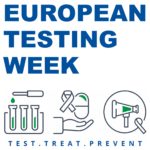 European Testing Week is a European campaign that encourages partner organisations — in community, health care and policy institutions — throughout Europe to unite for one week twice a year to increase testing efforts and promote awareness of the benefits of earlier hepatitis and HIV testing.
European Testing Week is a European campaign that encourages partner organisations — in community, health care and policy institutions — throughout Europe to unite for one week twice a year to increase testing efforts and promote awareness of the benefits of earlier hepatitis and HIV testing.
This initiative has progressed since its start in 2013 and has grown to be a widely recognised European event, with hundreds of organisations participating every year. What once started as an annual event has now become a biannual event, with two ETWs occurring each year in Spring (May) and Autumn (November). Each organisation volunteers their own time to organise their Testing Week activities and create incredible displays of a united effort to increase testing awareness at all organisational levels.
Now in its tenth year, the European Testing Week initiative will host the Spring and Autumn ETWs on the following dates:
- Spring ETW: 16 – 23 May 2022
- Autumn ETW: 21 – 28 November 2022
Fast track cities London
 The Fast-Track Cities initiative is a partnership of organisations, including the Mayor of London, NHS England, Public Health England and London Councils committed to working with partners across the city to reach the following goals by 2030:
The Fast-Track Cities initiative is a partnership of organisations, including the Mayor of London, NHS England, Public Health England and London Councils committed to working with partners across the city to reach the following goals by 2030:
- End new HIV infections in the capital
- Put a stop to HIV-related stigma and discrimination
- Stop preventable deaths from HIV-related causes
- Work to improve the health, quality of life and well-being of people living with HIV across the capital
Fast Tracks Cities London goes on to say “London is already leading the way in diagnosis and treatment, but now we want to be the first city in the world to end new cases of HIV. We want to get to zero new HIV infections, zero preventable deaths and zero stigma by 2030, making sure everyone with HIV is living well.
Fast Track Cities LondonThe Fast Track Cities initiative global partnership
The Fast Track Cities initiative is a global partnership between cities and municipalities around the world and four core partners:
- International Association of Providers of AIDS Care (IAPAC)
- Joint United Nations Programme on HIV/AIDS (UNAIDS)
- United Nations Human Settlements Programme (UN-Habitat)
- City of Paris
Launched on World AIDS Day 2014, the network has grown to include more than 300 cities and municipalities that are committed to attaining the UNAIDS 90-90-90 targets by 2020:
- 90% of all people living with HIV will know their HIV status
- 90% of all people with diagnosed HIV infection will receive sustained antiretroviral therapy (ART)
- 90% of all HIV-diagnosed people receiving sustained ART will achieve viral suppression. Achieving zero stigma is the initiative’s fourth, but no less important, target.
Mayors and other cities/ municipal officials designate their cities as Fast Track Cities by signing the Paris Declaration on Fast-Track Cities which outlines a set of commitments to achieve the initiative’s objectives.
Initially heavily focused on the 90-90-90 targets, the Paris Declaration was recently updated to establish attainment of the three 90 targets as the starting point on a trajectory towards getting to zero new HIV infections and zero AIDS-related deaths.
Getting to zero collaborative | Fast Track Cities LondonA new Fast-Track Cities HIV improvement community working towards the 2030 ambitions.
Tackling HIV stigma (2021-22)
Fast-Track Cities London: tackling HIV stigmaEvolving the Care of People Living with HIV in London | PDF | October 2021
Fast Track Cities Initiative Healthy London Partnership
Fast Track Cities | UN AIDS HIV and AIDS in the United Kingdom (UK) | Avert Stigma focus (Fast Track Cities Initiative) | Healthy London Partnership | 17 Jan 2020 | 1m 59s
HIV Fast Track Cities | Nov 30 2016 | 3m Could UK HIV transmissions really go down to near-zero by 2030? The latest report suggests so | nam aidsmap | 16 Jan 2020
HIV infections among gay and bi men fall by 71% in UK | BBC News | 16 Jan 2020
UK Government to commit to ending new HIV transmissions in England by 2030 | THT | 30 Jan 2019
New PHE stats show UK has reached UN’s HIV target for 2020 – Terrence Higgins Trust response | THT | 29 Nov 2019
Cities getting to 90-90-90 and beyond | The Lancet | 1 Oct 2019
UK meets UN target in drive to end HIV epidemic | The Guardian | 29 Nov 2018
London joins Fast-Track Cities initiative to reduce new HIV infections | The Mayor of London | 10 Jan 2018
Global Strategy Health Sector Strategy Sector on HIV 2016 2016–2021 | WHO | Jun 2016 Back to top
Do It London
 Do It London is an on-going campaign delivered and coordinated by the London HIV Prevention Programme (LHPP) is a London-wide sexual health promotion initiative. It aims to increase HIV testing and promote prevention choices to Londoners. The programme is funded by 31 London boroughs and managed on their behalf by Lambeth Council. As well as our city-wide Do It London campaigns, the LHPP also provides a free condom distribution, outreach and rapid HIV testing service for men who have sex with men (MSM). This service is delivered by GMI Partnership and Freedoms. It also commissions online sexual health outreach and advice via websites and apps.
Do It London is an on-going campaign delivered and coordinated by the London HIV Prevention Programme (LHPP) is a London-wide sexual health promotion initiative. It aims to increase HIV testing and promote prevention choices to Londoners. The programme is funded by 31 London boroughs and managed on their behalf by Lambeth Council. As well as our city-wide Do It London campaigns, the LHPP also provides a free condom distribution, outreach and rapid HIV testing service for men who have sex with men (MSM). This service is delivered by GMI Partnership and Freedoms. It also commissions online sexual health outreach and advice via websites and apps.
Useful links include: finding an HIV testing centre near you, finding a sexual health clinic near you, HIV self-sampling kits, HIV self-testing kits, HIV testing, condoms, information about PrEP, and achieving undetectable status.
Do It London | London HIV Prevention Programme (LHPP)
Cat or There are Many Ways to Prevent HIV | Three Flying Piglets for MENRUS.CO.UK | July 2018 | 1m
Eurasian Coalition on Male Health (ECOM)
I nternational non-governmental association, located in Tallinn, Estonia.
nternational non-governmental association, located in Tallinn, Estonia.
Membership-based association, open for non-profits and individuals working in the field of human immunodeficiency virus (HIV) prevention and treatment for gay men and other men who have sex with men, and transgender people, in the region of Eastern Europe and Central Asia (EECA).
Currently, the network is made up of 76 members from 19 countries, ranging from Estonia to Tajikistan.
ECOM Back to topAPCOM
 A coalition of members from governments, UN partners, non-profits and community-based organisations from Asia and the Pacific.
A coalition of members from governments, UN partners, non-profits and community-based organisations from Asia and the Pacific.
APCOM represents a diverse range of interests working together to advocate on, highlight and prioritise HIV issues that affect the lives of men who have sex with men (MSM)* and transgender people, including rights, health and well-being.
APCOMAbout APCOM | 11 Jul 2018 | 2m 19s Back to top
MPact Global Action
 MPact Global Action for Gay Men’s Health and Rights was founded in 2006 as The Global Forum on MSM and HIV (MSMGF) by an international group of activists who were concerned about the disproportionate HIV burden being shouldered by gay and bisexual men.
MPact Global Action for Gay Men’s Health and Rights was founded in 2006 as The Global Forum on MSM and HIV (MSMGF) by an international group of activists who were concerned about the disproportionate HIV burden being shouldered by gay and bisexual men.
Advocates for equitable access to effective HIV prevention, care, treatment, and support services for gay men and bisexual men, including those living with HIV, while promoting their health and human rights worldwide.
MPact Global Action for Gay Men’s Health and Rights Back to topYouth Stop AIDS
 Youth-led movement campaigning for a world without AIDS (previously called Student Stop AIDS Campaign). It’s a network of young people across the UK speak out, take creative action and engage those in power to ensure that governments, global institutions and corporations are committed to ending AIDS by 2030.
Youth-led movement campaigning for a world without AIDS (previously called Student Stop AIDS Campaign). It’s a network of young people across the UK speak out, take creative action and engage those in power to ensure that governments, global institutions and corporations are committed to ending AIDS by 2030.
Youth Stop AIDS
Youth Stop AIDS Back to top
National HIV Story Trust
 The National HIV Story Trust is about filming, recording and preserving the history of those affected by the AIDS epidemic of the 1980s and 90s.
The National HIV Story Trust is about filming, recording and preserving the history of those affected by the AIDS epidemic of the 1980s and 90s.
The stories of those involved are already in danger of being forgotten, yet the epidemic is the most significant event in modern-day LGBTQ+ life and continues to affect the community and its history today. It changed the way that people were cared for and died and also importantly it changed the way we live now. AIDS probably advanced gay rights more than anything else in history and many of the freedoms the LGBTQ+ community enjoy today are due to the changes the AIDS pandemic instigated.
National HIV Story Trust Back to topGraphic Communication
 A historic visual archive of promotional campaigns and graphic ephemera, compiled in order to examine changes in health promotion approaches, messages and concerns around HIV/AIDS in the UK and Republic of Ireland, acting as a reference source for the development of future communications.
A historic visual archive of promotional campaigns and graphic ephemera, compiled in order to examine changes in health promotion approaches, messages and concerns around HIV/AIDS in the UK and Republic of Ireland, acting as a reference source for the development of future communications.
It is not intended to be a complete or comprehensive collection, but to offer a supplementary visual reference source for those interested in the design of HIV/AIDS materials.
Graphic Communication | A UK HIV/AIDS Design ArchiveGraphic Communication | A UK HIV/AIDS Design Archive | Siân Cook Back to top
HIV Story Project
 Founded in 2009, The HIV Story Project is a San Francisco based non-profit organisation focused on bridging HIV/AIDS with film, media and storytelling to fight the pandemic and the global stigma associated with it.
Founded in 2009, The HIV Story Project is a San Francisco based non-profit organisation focused on bridging HIV/AIDS with film, media and storytelling to fight the pandemic and the global stigma associated with it.
Generations HIV is a digital media experiment recording video questions, answers and stories by people from all walks of life about HIV/AIDS. Whether HIV+ or HIV-, a loved one or a caregiver, we have all been impacted and affected by this global health pandemic, and we all have a story to tell.
Generations HIV | HIV Story Project Back to topLGBT+ rights and HIV and sexual health
International HIV organisations focusing on the health and well-being of gay men and men who have sex with men including HIV prevention, HIV treatment, advocacy, support services and promoting their health and human rights, and storytelling to fight the pandemic and the global stigma associated with it.
Contact us here if you know of an organisation we should include.
You may be interested in our section on LGBT+ rights.
LGBT+ Rights
Though there has been progress in the past 50 years or so for LGBT people around the world, it remains a divisive, religious, and political issue.
While some countries have decriminalised homosexuality, outlawed homophobic hate crimes and over 20 countries recognise same-sex marriage; others are becoming increasingly oppressive, and brutal, like Chechnya.
Having sex with someone of the same sex remains illegal in over 70 countries, and punishable by death in 10. We’ve pulled together a number of organisations working to promote equality, though it’s worth remembering that LGBT human rights campaigners risk violence, discrimination, and arrest.
LGBT+ Rights | MEN R US Back to topMore
Plus Friends London
Offers support and companionship in a social setting, for meeting like minded people in a relaxed and friendly atmosphere for drinks, dinners, theatre and other events.
Plus Friends London | Meetup
Positive 21
Progressive support group, created with the sole aim of providing emotional support and a confidential discussion and advice outlet to gay, bisexual and MSM men of all ages living with HIV/ AIDS.
Positive 21
UK HEALTH SECURITY AGENCY
UK Health Security Agency
 Replacing Public Health England in 2021, the UK Health Security Agency (UKHSA) is a government agency for UK-wide public health protection, eg: infectious diseases, chemical, biological, radiological and nuclear incidents and other health threats, and falls under the Department of Health and Social Care.
Replacing Public Health England in 2021, the UK Health Security Agency (UKHSA) is a government agency for UK-wide public health protection, eg: infectious diseases, chemical, biological, radiological and nuclear incidents and other health threats, and falls under the Department of Health and Social Care.
While some welcomed the change, the timing of the reorganisation, during the COVID pandemic, was criticised by health experts and other bodies, including the editorial in the BMJ, the Institute for Government, the King’s Fund, and Christina Marriott, the chief executive of the Royal Society for Public Health.
King’s Fund | 20 Aug 2020BMJ | 19 Aug 2020
Institute for Government | 19 Aug 2020
Royal Society for Public Health | 18 Aug 2020
A Guardian editorial compared it to “reorganising a fire brigade as it tries to put out a blaze” and said the decision had been made without proper consultation or scrutiny. The editorial goes on to say ” Research from the Health Foundation showed a reduction of almost 25% in public health spending per person between 2014-15 and 2019-20. PHE itself has an annual budget of just £300m – compared with the £10bn given to Serco, Sitel and other companies for test and trace, with very poor results.”
The Guardian | 18 Aug 2020 UK Health Security Agency | GOV.UKUK Health Security Agency | GOV.UK UK Health Security Agency | Wikipedia
Public Health England (PHE) | Wikipedia Back to top
HIV and the law, and human rights
HIV and human rights
 There is a very strong link between HIV and human rights and – for many years – activists have been advocating that an effective response to the HIV epidemic can only happen with full respects of human rights. For example, human rights abuses are one of the drivers of the HIV epidemic and increase its impact while, at the same time, HIV undermines progress in the realisation of human rights.
There is a very strong link between HIV and human rights and – for many years – activists have been advocating that an effective response to the HIV epidemic can only happen with full respects of human rights. For example, human rights abuses are one of the drivers of the HIV epidemic and increase its impact while, at the same time, HIV undermines progress in the realisation of human rights.
What are human rights?
Human rights are rights inherent to all human beings, regardless of race, sex, nationality, ethnicity, language, religion, or any other status. Human rights include the right to life and liberty, freedom from slavery and torture, freedom of opinion and expression, the right to work and education, and many more. Everyone is entitled to these rights, without discrimination.
In the UK they are protected by the Human Rights Act 1998. The Act gives effect to the rights set out in the European Convention on Human Rights. They include:
- Your right to life
- Your right to respect for private and family life
- Your right to personal liberty
- Your right not to be tortured or treated in an inhuman way
- Your right to a fair trial
- Your right to freedom of religion and belief
Human rights | Wikipedia
Human rights and HIV
The relationship between HIV and AIDS and human rights can be highlighted in several areas:
- Increased vulnerability of certain groups more vulnerable to contracting HIV because they are unable to realise their civil, political, economic, social and cultural rights.
- Through discrimination and stigma, the rights of people living with HIV often are violated because of their presumed or known HIV status. This causes them to suffer both the disease and the consequential loss of other rights. Stigmatisation and discrimination may obstruct their access to treatment and may affect their employment, housing and other rights.
- Strategies tackling the epidemic are hampered where human rights are not respected. For example, discrimination against and stigmatisation of vulnerable groups such as people who inject drugs, sex workers, and men who have sex with men drives these communities underground.
Fast track cities
Fast Track Cities is committed to attaining the HIV UNAIDS 90-90-90 targets by 2020:
- 90% of all people living with HIV will know their HIV status
- 90% of all people with diagnosed HIV infection will receive sustained antiretroviral therapy (ART)
- 90% of all HIV-diagnosed people receiving sustained ART will achieve viral suppression. Achieving zero stigma is the initiative’s fourth, but no less important, target.
HIV prevention, testing and treatment services can and should be grounded in human rights. Beyond being an imperative in themselves, human rights principles and approaches are critical to addressing barriers to HIV services and to achieving HIV targets. Human rights principles and approaches will help maximize the reach and impact of HIV prevention, testing and treatment programmes. They also will help address potential human rights challenges and prevent abuses that may occur in the context of urgent efforts to Fast- Track the achievement of HIV prevention, testing and treatment targets.
Publications, information, and equality and human rights organisations
HIV: Know your rights | NATHuman rights and HIV | Avert
How the law works | THT Equality and human rights Commission
Scottish Human Rights Commission
Equality and human rights Commission Wales
Equality Commission for Northern Ireland
Equality and advisory and support services
Fast Track Cities | MEN R US
News and articles
Living with HIV is still a burden, Dutch gay and bisexual men tell researchers | nam aidsmap | 3 Nov 2020HIV criminalisation laws around the world | nam aidsmap | June 2020
COVID-19 and threats to human rights: another HIV parallel | i-base | 17 Apr 2020
Is HIV a disability in the UK? | nam aidsmap | Feb 2020
UAE prisoners denied HIV treatment – Human Rights Watch | BBC | 6 Nov 2019
Europe’s shifting response to HIV/AIDS: from human rights to risk management | Health and Human Rights Journal | 22 Nov 2016
Human rights and HIV | Speaking Up | 14 Jul 2010 The criminalisation of HIV transmission in the UK | Centre for Invention and Social Process (CISP), Goldsmiths, University of London
Sustaining the human rights response to HIV | UNAIDS | 2015
Memorandum from the UK AIDS and Human Rights Project | UK Parliament | Joint Committee on Human Rights Written Evidence Jonathan Blake: A London first HIV diagnosis – His remarkable story 42 years later | All Out with Jon Dean | 20 Jan 2025 | 49m 35s
International Guidelines on HIV/AIDS and Human Rights
The International Guidelines on HIV/AIDS and Human Rights arose because of various calls for their development in light of the need for guidance for Governments and others on how to best promote, protect and fulfil human rights in the context of the HIV epidemic.
International Guidelines on HIV/AIDS and Human Rights | UNAIDS | 2006
HIV/AIDS and Human Rights
Human rights are inextricably linked with the spread and impact of HIV on individuals and communities around the world. A lack of respect for human rights fuels the spread and exacerbates the impact of the disease, while at the same time HIV undermines progress in the realisation of human rights.
HIV/AIDS and Human Rights | United Nations Human Rights
Universal Declaration of Human Rights
The Universal Declaration of Human Rights (UDHR) is a milestone document in the history of human rights. Drafted by representatives with different legal and cultural backgrounds from all regions of the world, the Declaration was proclaimed by the United Nations General Assembly in Paris on 10 December 1948 (General Assembly resolution 217 A) as a common standard of achievements for all peoples and all nations. It sets out, for the first time, fundamental human rights to be universally protected and it has been translated into over 500 languages.
Universal Declaration of Human Rights | United Nations
HIV and the law
 There is no law saying you must tell people you have HIV if you are having protected sex, and it’s your choice whether you tell sexual partners whether you have HIV or not.
There is no law saying you must tell people you have HIV if you are having protected sex, and it’s your choice whether you tell sexual partners whether you have HIV or not.
In England, Wales and Northern Ireland, it is possible you could have legal action taken against you. This will only happen if ALL of the following apply: [1]
- You suspect or know you are HIV positive
- You suspect or know you have a detectable viral load
- You still have sex without a condom without telling your sexual partner about your HIV status
- Your partner acquires HIV as a result.
[1] nam aidsmap (see below)
A number of people in the UK have been prosecuted and imprisoned for transmitting HIV to their sexual partners under Section 20 of the Offences Against the Person Act 1861 (England and Wales). Though the act came into law in 1861, the Crown Prosecution Service (CPS) published a statement on prosecuting people for recklessly or intentionally transmitting HIV in 2008 with accompanying legal guidance updated in 2010.
Introduction to the legislation | nam aisdsmapFrequently asked questions regarding criminal liability for HIV transmission | nam aidsmap
Man jailed for life after deliberately infecting men with HIV | The Guardian | 18 Apr 2018
Daryll Rowe’s sentence could change the law’s approach to HIV transmission | The Conversation | 19 Apr 2018
Daryll Rowe guilty of infecting men with HIV | BBC | 15 Nov 2017
More
HIV and the law | LGBT Hero Law Commission considers HIV criminalisation in great depth, but recommends no change | HIV Justice Network | 9 Nov 2015 Sexual Offences Act 2003 | WikipediaSexual Offences Act 2003 | legislation.co.uk | The National Archives Offences Against the Person Act 1861 (OAPA 1861) | Wikipedia
Criminal transmission of HIV | Wikipedia Back to top
HIV and AIDS history
Introduction
 Some younger gay men do not have direct personal memories of the early HIV and AIDS crisis of the 1980s and 1990s, as they were either not born or were very young at that time. It’s with this in mind, MENRUS.CO.UK volunteers produced section on HIV and AIDS history in 2016 for you to explore, updated in 2025.
Some younger gay men do not have direct personal memories of the early HIV and AIDS crisis of the 1980s and 1990s, as they were either not born or were very young at that time. It’s with this in mind, MENRUS.CO.UK volunteers produced section on HIV and AIDS history in 2016 for you to explore, updated in 2025.
An overview
The first AIDS-related deaths in the UK were recorded in 1981. At the time, the cause of the illness was unknown, and it was initially referred to as GRID (Gay-Related Immune Deficiency), reinforcing homophobic stigma. HTLV-III (Human T-Lymphotropic Virus Type III) was one of the early names for HIV (Human Immunodeficiency Virus) when scientists were first identifying the cause of AIDS (Acquired Immune Deficiency Syndrome).
Scientists confirmed that AIDS was caused by HIV, a virus that damages the immune system. The renaming in 1986 helped clarify that HIV is distinct from other HTLV viruses and is specifically responsible for AIDS. 98% of people diagnosed with HIV to the end of 1985 fell into one of three exposure categories: gay and bisexual men, people who injected drugs and people with haemophilia receiving blood products (Factor VIII).
“Friends would disappear and you’d find out next club night that so-and-so was in hospital or had died. Friends with AIDS were telling their families, coming out at the same time. Lovers and partners were ignored and excluded from funerals, and sidelined by relatives. If you tested positive to HIV antibodies there was no treatment and so it was a death sentence especially if it was a late diagnosis. You learnt about the stages: persistent generalised lymphadenopathy (PGL), AIDS-related complex (ARC) and Acquired Immune Deficiency Syndrome (AIDS).
Young gay men were at the mercy of opportunistic infections: pneumocystis pneumonia, a life-threatening lung infection; cytomegalovirus that caused blindness; toxoplasmosis, a brain infection that caused seizures and coma; candidiasis, a severe mouth and throat fungal infection so you couldn’t eat; and Kaposi’s sarcoma – purple cancerous skin lesions that singled you out as an ‘AIDS carrier’. We watched friends and lovers our age die in horrible ways, unimaginable today.
During visiting hours, gay men would create ‘ant trails’ to and from Broderip and Charles Bell AIDS wards at the Middlesex Hospital. Afterwards we’d go to the pub or a club to decompress or let off steam. We lived for the moment but, did so in fear, our lives a revolving door of hospital visits, funerals, activism, AIDS benefits and helpline shifts. Don’t forget, there was also Thatcher, the miner’s strike, Section 28 and an all time high unemployment rate. The weekly DHSS unemployment benefit or ‘dole’ for a single person was £20.65. Milk was 21p a pint, beer was 76p, and lager 86p.
Many of us lost whole friendship groups which had to be renewed, never knowing who would might be next. The camaraderie was intense. It was our lifeline, an anchor and survival mechanism. It’s easier to look back now. I’m not sure what we’re called today, elders or survivors, but there’s a generation that continues to work through grief, loss and trauma.” JDF, 2024.
The media, campaigns and helplines
Due to limited knowledge of the virus, misinformation and discrimination were rampant and by the mid 80s newspapers were ramping up their own narrative with such headlines as:
- “Gay plague agony” (News of the World)
- “Gay virus plague” (The Mail on Sunday)
- “Gays in fear” (The Sun)
- “Killer blood tests ordered at donor centres” (The Mail on Sunday).
- “Cough can spread AIDS, warns Doc” (The Sun)
- “It’s spreading like wildfire” (The Sun)
- “Kiss of Death” (The Star)
- “A million will have AIDS in six years” (Daily Mail)
These headlines were printed at a time when cases were rising rapidly, and awareness campaigns were barely off the ground. In 1986 the Department of Health and Social Security (DHSS) launched the AIDS education campaign, ‘Don’t Aid AIDS’ which had little impact. A year later in 1987, the government launched the ‘Don’t Die of Ignorance’ or ‘Tombstone’ campaign delivering a leaflet to every household in the UK (the ad voiced by actor John Hurt). This was supported by the National AIDS Helpline though London Lesbian and Gay Switchboard was already inundated by calls and regional helplines were emerging such as Leeds AIDS Advice, and Manchester AIDS Line.
Section or Clause 28
Section 28 refers to part of the Local Government Act 1988 and widely considered to be one of the most pernicious and harming pieces of legislation to be passed by a UK government in recent decades, affecting the lives of LGBT+ people up and down the country and those charged with their care and education. It stated that local authorities in England, Scotland and Wales “shall not intentionally promote homosexuality or publish material with the intention of promoting homosexuality” or “promote the teaching in any maintained school of the acceptability of homosexuality as a pretended family relationship”. It’s sometimes referred to as Clause 28, eferencing Scottish legislation. The legislation came into effect under Margaret Thatcher’s government in May 1988 causing organisations, to close, limit activities or to self-censor. This was due to uncertainty around what constituted the “promotion” of homosexuality, leading many teachers to avoid discussing the topic in any educational context including sexual health, safer sex and HIV prevention. It’s path to repeal was sluggish at best but the legislation was eventually removed from the statute books in September 2003.
Section 28 | MEN R USThings that happened
- In 1983, BBC Horizon aired its documentary “Killer in the village”
- In 1983, Lucozade re-brands slogan “Lucozade aids recovery” with “Lucozade replaces lost energy”.
- In 1984, Bronski Beat’s debut album “The Age of Consent” with Jimmy Somerville.
- In 1985, actor Rock Hudson died from AIDS.
- Circa 1985-6, Margaret Thatcher opposed references to anal intercourse in public health material, fearing the proposed descriptions of “risky sex” would do immense harm to young teenagers.
- In 1986, Manchester Chief Constable James Anderton remarks that homosexuals, drug addicts and prostitutes who had HIV/AIDS were “swirling in a human cesspit of their own making”.
- In 1987, Stephen Fry produced ‘Hysteria’, a comedy benefit for the Terrence Higgins Trust.
- In 1987, Princess Diana opened the Broderip Ward at the Middlesex Hospital.
- In 1987, “It’s a Sin” from the album “Actually” was released by the Pet Shop Boys.
- In 1987, the Vatican, under John Paul II, issued a document reinforcing the Church’s stance that moral behavior (chastity and monogamy) was the only acceptable way to prevent AIDS. Condoms were not promoted, even for HIV prevention, despite growing public health concerns.
- in 1989, American photographer Robert Mapplethorpe died from AIDS.
- In 1991, Freddie Mercury died from AIDS.
Treatments for HIV
In 1987, an early antiretroviral therapy (ART) was introduced with the approval of AZT (zidovudine). It was the first medication to show effectiveness in slowing disease progression though the side effects were horrendous. The arrival of HIV combination therapies by the mid-1990s were the game changer, dramatically improving prognosis and quality of life. Since the first cases of AIDS were reported four decades ago, the UK has moved from an epidemic and crisis to control with improved HIV treatments, HIV prevention, and ‘test a treat’ resulting in a significant reduction in new diagnoses. However, persistent issues remain such as stigma, late diagnoses, access to PrEP, and LGBT+ health inequalities.
HIV treatment | MEN R USLiving with HIV and deaths
As of 2022, approximately 107,950 people in the UK were living with diagnosed HIV and accessing care. This figure has been increasing over the past decade, rising by 34% since 2013. Note that these numbers represent those diagnosed; an estimated 5,200 individuals remain undiagnosed and are unaware of their HIV status. Determining the exact total number of AIDS-related deaths in the UK since the beginning of the epidemic is challenging due to variations in data collection and reporting over the decades. However, available data provides some insight, thank you Wikipedia:
- By 1996, approximately 12,105 individuals had died from AIDS-related illnesses in the UK.
- Between 1997 and 2012, an additional 2,450 deaths were recorded in England and Wales due to AIDS-related conditions.
- From 2013 to 2018, estimates suggest that between 832 and 1,494 individuals died from AIDS-defining illnesses in the UK.
Combining these figures indicates that 15,387 to 16,049 people have died from AIDS-related illnesses in the UK up to 2018. It’s important to note that these numbers are approximate, and the actual total may be higher due to underreporting or incomplete data in earlier years. Obtaining a precise cumulative total is difficult due to historical data limitations and changes in diagnostic criteria over time.
The shadow of HIV and AIDS
There is a collective view that says there a shadow over the lives of gay men today that can be traced back to the HIV and AIDS epidemic. The thinking progresses the idea that, though the epidemic peaked decades ago, its legacy continues to shape the lives of gay men today. The following notes are neither comprehensive or complete but hould provide an engaging springboard for thought and discussion.
The older
Many gay men who lived through the 1980s and 1990s were banished by their families, and lost entire friendship groups, partners and boyfriends to AIDS. Witnessing suffering and death alongside government neglect and homophobia caused trauma that still casts a shadow. Some gay men feel guilt over surviving while so many others died. Many had to suppress their grief due to the stigma and lack of public mourning; the same generation that fought for LGBT+ rights while simultaneously navigating a death sentence attached to their identity and sexuality. Even today, some struggle with trust, intimacy, and mental health challenges that stem from those years.
The younger
Even with the success of treatments and prevention, HIV still carries an emotional weight that younger men internalise through fear, shame, or avoidance of open conversations about risks and risk taking. Stigmatising language like “clean only” persists on hook-up and apps reinforcing the idea that HIV status defines worth. Some use chems as a way to find connection, boost confidence, escape loneliness, or trauma, often without realising the connections.
Stigma and rejection
Even though HIV is treatable, stigma remains deeply ingrained. HIV positive gay men can struggle with disclosing their status due to fear of rejection. Some HIV negative men refuse intimacy with those living with HIV even if they are undetectable, reinforcing the notion that they are “unwanted” and “undesirable”. HIV stigma still exists in workplaces, healthcare settings, and social groups, causing self-doubt and withdrawal. The shame that was instilled during the epidemic still lingers in cultural attitudes, hook-up culture, and social spaces, even among those who did not personally experience the crisis.
Generational divides and lack of shared understanding
A growing divide exists between older gay men who experienced the epidemic firsthand and younger gay men who grew up with effective treatments. Survivors can feel that younger generations do not understand or acknowledge the trauma they endured. Some feel burdened by the weight of history or feel disconnected from it, leading to guilt about their privilege of living in a time of HIV treatments. There are few spaces where younger and older gay men engage in dialogue about the epidemic, leading to a loss of historical connection and mutual support. This disconnect sometimes causes resentment, misunderstandings, and missed opportunities for healing and mentorship between generations.
Mental health struggles and loneliness
Even in the 21st century, fear of HIV stigma in relationships persists, some actively avoid dating or sex due to self-doubt, shame, or anxiety. Older gay men living with HIV, especially those who lost partners during the epidemic, may experience loneliness and lack of community support. The expereiences and memories of growing up with HIV fear or dealing with stigma contribute to depression among gay men. Some turn to recreational drug use and chems (or alcohol) to cope with deep-seated trauma or rejection, which they may not even recognise as such. Even with greater awareness of mental health, the emotional toll of the epidemic is rarely discussed openly, leaving many to internalise their struggles in silence.
The cultural silence is deafening
Although dramas like “It’s a Sin” (2021) reignited public awareness of the HIV and AIDS crisis, some gay men still feel the epidemic is not discussed in sufficient depth or there needs some sort of truth and reconciliation. Younger generations are not necessarily actively encouraged to learn about their history which can lead to ignorance or apathy while older gay men avoid discussing it because the memories are too painful or no one is interested outside a sound bite. HIV is rarely acknowledged in the wider media, reinforcing the idea that it was a “gay disease” of the past. There is something about looking back in order to move forward. Unless we talk about it collectively we won’t know. Without more open discussions, gay men continue to suffer in silence, unable to process the epidemic’s impact on their identity, self-worth, and mental well-being.
More
Remembering and thinking critically about the ‘Don’t Die of Ignorance’ campaign | London School of Hygiene & Tropical Medicine | 18 May 2018
The AIDS epidemic’s lasting impact on gay men | Dr Dana Rosenfeld | 19 Feb 2018
HIV in the UK: then and now | aidsmap | Oct 2023
Global HIV and AIDS statistics | UNAIDS
Gay in the 80s | Colin Clews
Section 28 | Wikipedia Early days of AIDS crisis in San Francisco in 1982 | ABC7 News Bay Area | USA | 2 Dec 2020 | 3m 19s
The UK’s forgotten epidemic: The fight against AIDS | Joe | UK | 18 Jun 2020 | 10m 18s
HIV/AIDS: The Plague Years | CDC | USA | 13 Aug 2020 | 21m 25s
Life Before the Lifeboat: San Francisco’s Courageous Response to the AIDS Outbreak | UC San Francisco | USA | 28 Apr 2014 | 28m 56s Back to top
Resources
It’s a Sin
Five part drama written by Russell T Davies following the lives of a group of gay men in London in 1981 on the cusp of the HIV and AIDS epidemic.
“It’s A Sin” Simplifies The Reasons Why The AIDS Crisis Was So Devastating | BuzzFeed News | 3 Mar 2021
“It’s a Sin” is about AIDS in England & Americans should remember that when they watch it | LGBT Nation | 5 Mar 2021
‘It‘s a Sin’ taught me I need to confront shame as a gay man | Huck | 18 Feb 2021
The Unique Catharsis of ‘It’s a Sin’ | Vice | 1 Feb 2021
‘It Would Be Friends Of Friends, Then Your Friend’: The It’s A Sin Era, Remembered By Those Who Survived It | Huff Post | 29 Jan 2021
It’s a Sin is a love letter to 1980s gay culture – and hate mail to the era’s homophobic hegemony | BFI | 22 Jan 2021
It’s a Sin review – Russell T Davies Aids drama is a poignant masterpiece | The Guardian | 22 Jan 2021
Meet the Exuberant Young Stars of Russell T Davies’s New ’80s-Set Drama, ‘It’s A Sin’ | Vogue | 11 Jan 2021
It’s A Sin (Trailer) | Channel 4 | 7 Jan 2021 | 2m 30s
HIV and AIDS History from Wikipedia, Avert and the Terrence Higgins Trust
HIV/ AIDS in the United Kingdom | Wikipedia
History of HIV and AIDS overview | Avert
Our History: Terrence Higgins Trust | Terrence Higgins Trust
AIDS: The first 20 years | Simon Garfield
AIDS: The first 20 years (part one) | The Guardian | 3 June 2001
AIDS: The first 20 years (part two) | The Guardian | 3 June 2001
How Edinburgh became the AIDS capital of Europe
In the mid-1980s Edinburgh became known as the Aids capital of Europe. A new deadly disease, cheap heroin and the hardline attitudes of the authorities were the ingredients for a public health disaster.
How Edinburgh became the AIDS capital of Europe | BBC | 1 Dec 2019
How a typo created a scapegoat for the AIDS epidemic | Maclean’s
A 1984 study planted the seed that would lead the media to falsely demonize Gaëtan Dugas as Patient Zero of an epidemic that would kill more than 700,000 people in North America.
How a typo created a scapegoat for the AIDS epidemic | Maclean’s | 17 Apr 2019
COVID-19: Patient zero: why it’s such a toxic term | The Conversation | 1 Apr 2020
The End Of Innocence | BBC/ Fine Cut | 1995
In 1995, the BBC made a documentary based on the book by Simon Garfield (see below) highlighting the shameful attitudes of the British public and politicians during the 80s and early 90s towards HIV/AIDS awareness, education and gay men.
The End of Innocence, part 1/ 6 | BBC Documentary/ Fine Cut | 1995
The End of Innocence, part 2/ 6 | BBC Documentary/ Fine Cut | 1995
The End of Innocence, part 3/ 6 | BBC Documentary/ Fine Cut | 1995
The End of Innocence, part 4/ 6 | BBC Documentary/ Fine Cut | 1995
The End of Innocence, part 5/ 6 | BBC Documentary/ Fine Cut | 1995
The End of Innocence, part 6/ 6 | BBC Documentary/ Fine Cut | 1995
Forty films with HIV and AIDS storylines and/ or themes
Links to Wikipedia
Who’s to say what makes a film worth watching, but one of our volunteers fancies himself as a bit of a film critic and has put a star next to the films which are some of his favourites.
- An Early Frost (1985)
- Parting Glances (1986)
- Tongues Untied (1989)
- Common Threads: Stories from the Quilt (1989)
- Longtime Companion (1989)
- The Living End (1992)
- Peter’s Friends (1992)
- Zero Patience (1993)
- And the Band Played On (1993)
- Philadelphia (1993)
- The Cure (1995)
- Jeffrey (1995)
- Kids (1995)
- Boys On the Side (1995)
- It’s My Party (1996)
- The Line of Beauty (1996)
- Drôle de Félix (2000)
- The Hours (2002)
- The Trip (2002)
- Angels in America (2003)
- Rent (2005)
- A Home at the End of the World (2004)
- Life Support (2007)
- The Witnesses (2007)
- Born in 1968 (2008)
- Precious (2009)
- We Were Here (2011)
- How to Survive a Plague (2012)
- Philomena (2013)
- Dallas Buyers Club (2013)
- The Normal Heart (2014)
- Holding the Man (2015)
- 120 BPM (2017)
- Bohemian Rhapsody (2018)
- Paris 05:59: Théo & Hugo (2017)
- United in Anger: A History of ACT UP (2012)
- Can You Ever Forgive Me? (2018)
- 1985 (2018)
- Mapplethorpe (2018)
- Every Act of Life (2018)
More
AIDS: Doctors and Nurses tell their Stories (2017) | Gay Films | 2 Mar 2019 | 26m
Dr Fauci on 30 years of AIDS | HIV Gov (USA) | 31 Aug 2011 | 47m 7s
World AIDS Day
Since 1988, 1 December every year has been dedicated to World AIDS Day, raising awareness of the AIDS pandemic caused by the spread of HIV infection, showing solidarity with people living with HIV, and mourning those who have died.
What is World AIDS Day? | nam aidsmapWorld AIDS Day | National AIDS Trust
World AIDS Day | United Nations (UN)
World AIDS Day | Wikipedia Understanding HIV and AIDS
Peer mentoring
Living well with HIV
Undetectable = Untransmittable
For many, 1 December is associated with the red ribbon which has become an instantly recognisable symbol.
The red ribbon
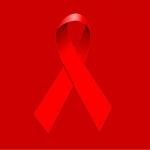 The red ribbon is a symbol of solidarity and of commitment to the fight against HIV and AIDS. The Ribbon Project was conceived in 1991 by Visual AIDS, a New York-based charity group of art professionals that aims to recognize and honour friends and colleagues who have died or are dying of AIDS. The ribbon made its public debut at the 1991 Tony Awards, but since then – in some circles – has become a popular and politically correct fashion statement for celebrities at other awards ceremonies. Because of this popularity, some activists have rightly worried that the ribbon is simply paying lip service to AIDS causes. Nevertheless, it is a powerful symbol for all of us around the world, and a unifying symbol on World AIDS Day (1 December). Today, the red ribbon is an international symbol and, for many, stands for care, concern, hope and support.
The red ribbon is a symbol of solidarity and of commitment to the fight against HIV and AIDS. The Ribbon Project was conceived in 1991 by Visual AIDS, a New York-based charity group of art professionals that aims to recognize and honour friends and colleagues who have died or are dying of AIDS. The ribbon made its public debut at the 1991 Tony Awards, but since then – in some circles – has become a popular and politically correct fashion statement for celebrities at other awards ceremonies. Because of this popularity, some activists have rightly worried that the ribbon is simply paying lip service to AIDS causes. Nevertheless, it is a powerful symbol for all of us around the world, and a unifying symbol on World AIDS Day (1 December). Today, the red ribbon is an international symbol and, for many, stands for care, concern, hope and support.
Red ribbon | Wikipedia
The Red Ribbon Project | Visual AIDS The British AIDS activists you might not know about | BBC | 2 Dec 2022
HIV transmission declining but progress slowed by pandemic | GOV.UK | 1 Dec 2022
World AIDS Day | House of Commons Library | 29 Nov 2022
‘Life was a party before Aids arrived in London’ BBC News | 26 Feb 2021
World AIDS Day – a year of advances in HIV research | Imperial College London | 1 Dec 2019 Back to top
Silence = Death
 In 1986, a support and conscious raising group of six gay men affected by the AIDS crisis began meeting in New York City. Inspired by posters made by the Art Workers Coalition and the Guerrilla Girls, their discussions led to the creation of the “Silence = Death” poster to mobilise the LGBT+ community into action.
In 1986, a support and conscious raising group of six gay men affected by the AIDS crisis began meeting in New York City. Inspired by posters made by the Art Workers Coalition and the Guerrilla Girls, their discussions led to the creation of the “Silence = Death” poster to mobilise the LGBT+ community into action.
They decided against a photographic image (as exclusionary) using a more abstract image to reach wider audiences. The design featured the pink triangle used to identify homosexuals in Holocaust concentration camps during World War II (1938-1945). The triangle was inverted and the pink was change to fuchsia colour (the brightest pink-purple). The poster became the key symbol of ACT UP, the AIDS activist organisation, which emerged in 1987.
Below, you can watch Avram Finkelstein talk about the Silence=Death Project or read the transcript. It will resonate if you are involved or affected, personally or professionally, by chemsex.
Silence=Death Project | WikipediaAvram Finkelstein: Silence=Death | SilenceOpensDoors | 4 Mar 2010 | 5m 22s
Avram Finkelstein, a member of the Silence=Death Project, talks about AIDS, ACT-UP, institutional silence, Holocaust imagery, street art, and the making of an iconic political image
I formed a small consciousness raising group with some friends of mine and it was a group of six gay men and we really wanted a place to talk about being gay in the age of AIDS but I’m talking about 1985. We worked for 9 months on this poster and we studied every aspect of every turn of phrase.
We argued about the color the exact color of the pink on the triangle … every single aspect of it had meaning and was packed with meaning for us. It was partly speaking with the voice of authority and appropriating authoritative space and advertising vernaculars but it was also speaking very directly to a lesbian and gay audience at the same time. In terms of the meaning of silence … politically it has it has two very specific meanings: institutionally silence is about control, personally silence is about complicity and I think as a Jew and there were three of us were Jews … this was tremendously disturbing to us because to a Jew when you’re when you see something happening and you’re silent about it, you’re participating in it whether you want to or not whether you know it or not.
There were support groups there were some political activity … they were service organisations … but Act Up hadn’t come along … so there was really there wasn’t really a place to talk about certain issues … so we met every week we had you know we structured it like a potluck and we started out you know talking about fears of sex … you know boyfriends … loneliness … but every week we would end up talking about politics. Every single week it would go back to institutional homophobia … access issues … racism … we always ended up there.
In particular we were very clued in to the idea that there was a politic going on that there was a political context which no one was talking about at the time and that really was the jumping off point for the poster. There were a couple of articles written about … you know Buckley called for tattooing of HIV positives that created a stir but there wasn’t really any voice there was no response. So it was silent on all these different levels politically … from a community perspective … and dialogue was what was missing … there was a lot of press reports people talking at you but there was very little dialogue.
Almost any conversation that involves descent eventually will be neutralised institutionally in America in particular. The way that it works is … you start out as a dissenting voice and gradually … the ear of power is given to you and then you’re invited to the table … and then you’re part of the power structure. There’s a very clear neutral neutralisation that happens in America in particular with regard to descent. Capitalism is very seductive … and the problem is … if I had to do it all over again that particular poster … I don’t know that I would have changed anything but I might have tried to accommodate for this fact: When you appropriate the voice of authority you begin to hear yourself in that way you begin to believe that voice and sometimes you can lose your own I’m not saying that I didn’t see this coming but I think a lot of activists in Act Up didn’t … they were naive to the power differentials to the dynamic to the way that capitalism neutralises descent and I think that was part of the problem … that is part of the stasis the silence that exists today is that people really did believe that everything was going to then be OK … that we had made these strides … we had managed to be heard … we had done something that was efficacious and that everything was going to be OK.
The thing to bear in mind about the repression of descent … or the repression of conversation … or the institutionalisation of silence … if you if you want to think about it that way … is it never goes away. It didn’t go away during that moment it appeared to people who felt empowered by hearing their voice but it never goes away and it’s a constant struggle.
ACT UP
 Formed in March 1987, AIDS Coalition to Unleash Power (ACT UP) is an international, grassroots political group working to end the AIDS pandemic.
Formed in March 1987, AIDS Coalition to Unleash Power (ACT UP) is an international, grassroots political group working to end the AIDS pandemic.
ACT UP was formed in response to social neglect, government negligence and the complacency of the medical establishment during the 1980s. Soon it found itself needing to fight corporate greed, lack of solidarity and various forms of stigma and discrimination at home and abroad. Works to improve the lives of people with AIDS through direct action, medical research, treatment and advocacy, and working to change legislation and public policies.
ACT UP New YorkAIDS Coalition to Unleash Power (ACT UP) | Wikipedia
ACT UP Historical Archive
Lessons from a new history of ACT UP: An interview with Sarah Schulman | The New Inquiry | 13 Sep 2021 Radical AIDS Activist Group ACT UP | Flashback | NBC Out | 19 Oct 2016 | 1m 20s
ACT UP & ACT NOW seize control of the FDA | Suchislifevideos | 18 Jun 2014 | 29m 51s
ACT UP – A documentary in progress | Scot Robbe | 29 Oct 2010 | 3m 21s
Larry Kramer 20th Anniversary ACT-UP AIDS Coalition Unleash Power | LGBT Center NYC | 20 Jun 2009 | 8m 24m
ACT UP London
 A diverse, non-partisan group of individuals united in anger and committed to direct action to end the HIV pandemic, along with the broader inequalities and injustices that perpetuate it.
A diverse, non-partisan group of individuals united in anger and committed to direct action to end the HIV pandemic, along with the broader inequalities and injustices that perpetuate it.
“In the fourth decade of this crisis, we fight to ensure comprehensive and easily accessible treatment for all people, in all countries. This includes not only medications but also mental and social health services as well as housing and economic equality. Here in the UK, we are united with the coalition of activists fighting to keep our National Health Service free, publicly run, and fully funded. In a time of rising infection rates, we challenge anyone who would hinder or cut back on life-saving services around safer sex, education, clean needles and all other HIV prevention measures. And in a time of continuing stigma, silence, and isolation, we combat discrimination against and promote the visibility and leadership of those living with HIV and AIDS.”
ACT UP LondonACT UP London Back to top
AIDS Memorial Quilts (UK and USA)
The section looks at the AIDS Memorial Quilt in the UK and the AIDS Memorial Quil in the USA also called the Names Project.
AIDS Memorial Quilt | UK
The UK AIDS Memorial Quilt tells the stories of many of those lost in the early days of the HIV AIDS epidemic in the 80’s and 90’s. Representing approximately 384 people from all around the UK, there are 48 twelve-foot by twelve-foot panels, each comprising up to 8 smaller panels. Each panel is approximately 4m sq. Each individual panel commemorates someone who died of AIDS and has been lovingly made by their friends, lovers or family.
Lives remembered include those of the writer, Bruce Chatwin; the artist/filmmaker Derek Jarman; the actors, Ian Charleson and Denham Elliot; gay rights activist, Mark Ashton and the photographer Robert Mapplethorpe.
Several charities have created the AIDS Memorial Quilt Conservation Partnership, to raise awareness of the quilt, its importance in our history and to restore and conserve the quilt for generations to come: George House Trust, Terrence Higgins Trust, The Food Chain, Sahir House, Positively UK and Positively East.
UK AIDS Memorial Quilt | UK AIDS Memorial Quilt Conservation PartnershipUK AIDS Memorial Quilt
UK AIDS Memorial Quilt | UK AIDS Memorial Quilt
The UK AIDS Memorial Quilt: A heartbreaking monument of love | BBC | 8 Nov 2021
 The Names Project AIDS Memorial Quilt | USA
The Names Project AIDS Memorial Quilt | USA
Weighing an estimated 54 (US) tons (48,988 kilograms), the (NAMES Project) AIDS Memorial Quilt is an enormous quilt made as a memorial to celebrate the lives of people who have died of HIV and AIDS, and related illnesses.
As of June 2016, the Quilt is composed of more than 49,000 panels on 5,956 blocks (blocks are the twelve-foot square building blocks of The Quilt seen at displays). Most blocks are composed of 8 separate panels, remembering the lives of eight individuals lost to AIDS.
The history of the quilt National AIDS Memorial Quilt | National AIDS Memorial (USA)AIDS Memorial Quilt Online | National AIDS Memorial
Names Project AIDS Memorial Quilt | Wikipedia Back to top
We RAGE On
weRAGEon is a project inspired by early HIV activism of the 1990s. weRAGEon seeks to do more than just tell stories from our past. It seeks to inspire, to influence, and to create new generations of activists and advocates.
Drawing on our rich history of global HIV activism, the Re-Act section revisits case studies of recent and historic activist actions, to explore what we can learn from past actions and events. In Respond you are invited to share your stories, and your strategies for future activism. And in Rage On find out more about the stories of HIV activists (past and present) from around the world.
As weRAGEon evolves, you’ll find more case studies featured, and more stories of how activism has influenced and inspired or how we can use activism more effectively in the future.
weRAGEon Back to topAIDES
 Pioneering several groundbreaking HIV prevention films, AIDES is a French community-based non-profit organisation that was founded in 1984. The name is a play on “aides” (French for “help”) and the English word “AIDS”. Its aim is to bring people living with HIV/AIDS together with their loved ones and peers into an organised entity dedicated to fighting HIV/AIDS and to defend the rights of people and communities affected by this disease.
Pioneering several groundbreaking HIV prevention films, AIDES is a French community-based non-profit organisation that was founded in 1984. The name is a play on “aides” (French for “help”) and the English word “AIDS”. Its aim is to bring people living with HIV/AIDS together with their loved ones and peers into an organised entity dedicated to fighting HIV/AIDS and to defend the rights of people and communities affected by this disease.
AIDES | Wikipedia Willy the Tourist | AIDES | 25 Apr 2011 | 1m 26s
Smutley | AIDES | 16 Mar 2011 | 2m 20s
Graffiti | AIDES | 19 Jan 2010 | 1m 36s
Sugar Baby Love | AIDES | 8 Aug 2008 | 3m Back to top
Books
 And The Band Played On | Randy Shilts | 1987
And The Band Played On | Randy Shilts | 1987
And the band played on | Randy Shilts | Macmillan (US)
“Upon its first publication twenty years ago, “And the band played on” was quickly recognised as a masterpiece of investigative reporting. An international bestseller, a nominee for the National Book Critics Circle Award, and made into a critically acclaimed film, Shilts’ expose revealed why AIDS was allowed to spread unchecked during the early ’80s while the most trusted institutions ignored or denied the threat. One of the few true modern classics, it changed and framed how AIDS was discussed in the following years. “And the band played on” remains one of the essential books of our time.” (Macmillan)
“And the band played on” is also a 1993 American television film docudrama based on the book. The film premiered at the Montreal World Film Festival before being broadcast by HBO on September 11, 1993.
And the band played on | Closing scene | HBO Films | 1997 | 4m 27s The End Of Innocence | Simon Garfield | 1994
The End Of Innocence | Simon Garfield | 1994
“The End Of Innocence” looks at a decade of AIDS in Britain. As well as the 8000 who have died, some 20,000 are infected with HIV, and many more carry the virus unknowingly. With no cure or even a vaccine in sight, and growing evidence of complacency, AIDS is still one of the greatest post-war challenges the UK faces. This book covers every significant development of the disease, from the early ignorance and panic to the emergence of AIDS as a good cause taken up by Sir Ian McKellen, George Michael and the Princess of Wales. The author uses information supplied by doctors, scientists, government ministers and civil servants, as well as interviews with leading entertainment figures such as Stephen Fry, Elton John and the late Derek Jarman.” (Simon Garfield)
In 1995, the BBC made a documentary based on the book highlighting the shameful attitudes of the British public and politicians during the 80s and early 90s towards HIV/AIDS awareness, education and gay men.
The End of Innocence, part 1/ 6 | BBC Documentary/ Fine Cut | 1995The End of Innocence, part 2/ 6 | BBC Documentary/ Fine Cut | 1995
The End of Innocence, part 3/ 6 | BBC Documentary/ Fine Cut | 1995
The End of Innocence, part 4/ 6 | BBC Documentary/ Fine Cut | 1995
The End of Innocence, part 5/ 6 | BBC Documentary/ Fine Cut | 1995
The End of Innocence, part 6/ 6 | BBC Documentary/ Fine Cut | 1995
 AIDS Don’t Die of Prejudice | Norman Fowler | 2015
AIDS Don’t Die of Prejudice | Norman Fowler | 2015
“AIDS: Don’t Die of Prejudice” is both an in-depth investigation and an impassioned call to arms against the greatest public health threat in the world today. Norman Fowler has travelled to nine cities around the globe to report on the position today. What he discovered was a shocking blend of ignorance, prejudice, bigotry and intolerance. In Africa and Eastern Europe, a rising tide of discrimination against gays and lesbians prevents many from coming forward for testing. In Russia, drug users are dying because an intolerant government refuses to introduce the policies that would save them. Extraordinarily, Washington has followed suit and excluded financial help for proven policies on drugs, and has turned its back on sex workers.
In this lucid yet powerful account, Norman Fowler reveals the steps that must be taken to prevent a global tragedy. ” (Biteback Publishing)
 How To Survive A Plague | David France | 2017
How To Survive A Plague | David France | 2017
“How to Survive a Plague by David France is the riveting, powerful and profoundly moving story of the AIDS epidemic and the grass-roots movement of activists, many of them facing their own life-or-death struggles, who grabbed the reins of scientific research to help develop the drugs that turned HIV from a mostly fatal infection to a manageable disease.
Around the globe, the 15.8 million people taking anti-AIDS drugs today are alive thanks to their efforts. Not since the publication of Randy Shilts’s now classic And the Band Played On in 1987 has a book sought to measure the AIDS plague in such brutally human, intimate, and soaring terms. Weaving together the stories of dozens of individuals, this is an insider’s account of a pivotal moment in our history and one that changed the way that medical science is practised worldwide.” (Pan Macmillan)
How to survive a plague | Trailer | 2013How to survive a plague | Film review | The Guardian | 10 Nov 2013
 The Ward | Gideon Mendel | 2017
The Ward | Gideon Mendel | 2017
In 1993, Gideon Mendel spent a number of weeks photographing the Broderip and Charles Bell wards in London’s Middlesex Hospital as part of the ‘Positive Lives’ project. The Broderip was the first AIDS ward in London and was opened by Diana, Princess of Wales in 1987, this year marking the 30th anniversary of its opening. This was the era before antiretroviral medications had become available, a very distinct and tragic time. All of the patients on the wards, many of whom were young, gay men, were having to face the terrifying prospect of an early and painful death.
These two wards at The Middlesex Hospital were some of the few dedicated AIDS wards that existed in London, and even more unusual for their decision to open themselves to being photographed. Considering the high levels of stigma and fear that existed at the time, the decision of these four patients to allow themselves, alongside their families, lovers and friends to be photographed was an act of considerable bravery. ‘The Ward’ explores through Gideon Mendel’s evocative black and white photographs how it felt to live with HIV at this time when it was considered a veritable death sentence. It shows how the ward at the Middlesex Hospital became more like a second home, and the staff and patients friends.
When You Call My Name
When You Call My Name | Tucker Shaw | Penguin Books | 2022“A heartrending novel about two gay teens coming of age in New York – perfect for fans of It’s a Sin and Adam Silvera. It’s 1990 in New York City. Adam is falling in love for the first time. Ben is leaving home for the last. Drawn by the city’s irresistible energy, the boys are swept up into the queer scene, where the potential for life and love seems limitless. But as the shadows of prejudice gather, Ben and Adam discover how their newfound community is facing the looming threat of AIDS, which will touch their lives more closely than they ever could have imagined. Heartbreaking yet hopeful, When You Call My Name tells the story of the moments that break our hearts and the people who make us whole – and shows how together we burn brightest in times of darkness.”
Back to top"Killer in the village" BBC Horizon (1983)
A rise in the demand for Pentamidine to treat pneumocystis pneumonia alerted health authorities to HIV/AIDS. First transmitted in 1983, Horizon traces the spread of AIDS across America. AIDS – Acquired Immune Deficiency Syndrome – was only named in 1982, and was still largely unknown. This programme follows the search for a cause and cure, and asks whether the seeds of a spreading epidemic had already reached London.
Horizon: Killer in the Village, 1982-1983 | BBC | 55m 45s Back to top"Don't die of ignorance" AIDS campaign (1986-7)
AIDS Monolith: Don’t Die of Ignorance Campaign, 1987 | BFI | 20 May 2016 | 51s
In 1986 the British government launched the world’s first ever public health campaign on HiV and AIDS. It was highly controversial and faced considerable opposition from Prime Minister Margaret Thatcher. Mike Lanchin speaks to former Health Minister, Norman Fowler, whose insistence made the campaign a reality. Remembering and thinking critically about the ‘Don’t Die of Ignorance’ campaign | London School of Hygiene & Tropical Medicine | 20 May 2020
Past campaigns: AIDS don’t die of ignorance | Ethical Marketing News | 30 Apr 2017
The AIDS health campaign | The National Archives | 26 Jan 2016
Thatcher tried to block ‘bad taste’ public health warnings about AIDS | The Guardian | 30 Dec 2015 Back to top
Hepatitis
Hepatitis
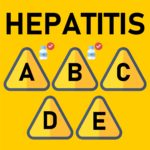 Hepatitis is (a virus that causes) inflammation of the liver and liver tissue and can cause serious and potentially life-threatening damage if left untreated. Hepatitis can be acute (short term) or chronic (long term), which can cause lasting liver damage. Hepatitis is sometimes shortened to Hep or HCV.
Hepatitis is (a virus that causes) inflammation of the liver and liver tissue and can cause serious and potentially life-threatening damage if left untreated. Hepatitis can be acute (short term) or chronic (long term), which can cause lasting liver damage. Hepatitis is sometimes shortened to Hep or HCV.
The liver is the largest organ in the human body, weighing around 1.5kg, and sits on the right side of your body. It has several vital functions, including turning food into energy and filtering toxins, eg, alcohol, out of the blood.
The Hepatitis alphabet
Hepatitis is most commonly caused by the viruses A to C, but other forms of hepatitis (eg: D, E, F, G) are very rare. Other causes include heavy alcohol use, some medications, toxins, other infections, and auto-immune diseases. But to summarise:
- Hepatitis A (HAV) is mainly spread by contaminated food and water, and sex, eg: rimming, fucking and sharing dildoes).
Get vaccinated for Hepatitis A - Hepatitis B (HBV) is mainly sexually transmitted, eg: rimming, fucking and sharing dildoes and douche and drug-injecting equipment
Get vaccinated for Hepatitis B. Treatment is available. See below: Hepatitis C and chemsex - Hepatitis C (HCV) is commonly spread through blood, eg: sharing injecting equipment, and straws for snorting, fucking and fisting. See below: Hepatitis C and chemsex
Get tested. Click here for a home Hep C home testing kit. - Treatment is available that cures it.
- Hepatitis D (HDV) can only infect people already infected with hepatitis B
Treatment is available - Hepatitis E (HEV) is spread in very much the same way as Hepatitis A and can be found in raw/ undercooked animals such as pigs, wild boar, deer, rabbits and rats
No specific treatment
Symptoms
Symptoms include a combination of the following:
- Flu-like symptoms and/ or temperature
- Nausea and/ or vomiting
- Diarrhoea and/ or grey-coloured shit/ poo
- Dark piss/ urine
- Loss of appetite
- Joint pain
- Yellowing of the eyes and skin (jaundice)
- Extreme tiredness
- Stomach pain
- Itchy skin
- Brain ‘fog’/ confusion and/ or depression (specific to Hepatitis C)
Hepatitis is complicated so please explore the information and support provided here and/ or get to a sexual health clinic ASAP.
More
Hepatitis A | NHSHepatitis B | NHS
Hepatitis C | NHS
Hep C U Later | NHS
About hepatitis C | The Hepatitis C Trust
Viral Hepatitis | The Liver Trust
Hepatitis | Terrence Higgins Trust
Hepatitis | Wikipedia A-Z of sexually transmitted infections (STI) | MEN R US
Hepatitis B and C | Leeds Sexual Health | 2017 | 3m Back to top
Hepatitis C and chemsex
 Chemsex is largely understood to be responsible for a marked increase in Hepatitis C (HCV) among gay men and HCV and HIV co-infection.
Chemsex is largely understood to be responsible for a marked increase in Hepatitis C (HCV) among gay men and HCV and HIV co-infection.
HCV test and treat
HCV test and treat | 30s
In the time it takes to boil a kettle or have a piss and a flush, you can order a home test for Hepatitis C today. It’s that quick. Should you come back positive, it’s a course of tablets over 8 to 12 weeks. Order a home test kit today!
Hep C home testing kit | NHSReducing the risks
- Using condoms for fucking or getting fucked
- Using sterile syringes and needles when injecting
- Using latex or non-latex gloves when fisting or getting fisted
- Using your own supply of lube and not sharing
- Using a new condom on dildos every time
- Using your own straw when snorting drugs
Disinfecting douche heads
Unlike HIV which dies when it leaves the body, Hepatitis C has a ‘tough outer shell’ and can be passed on by sharing towels, toothbrushes, dildoes, and douche equipment, for example. Keeping douche heads and kit clean is an important part of reducing risks, especially at sex parties where they may be shared. Use a commercially available sex toy cleaner or you can make up your own solution of 1 part thin bleach to 10 parts water. Make sure you clean and rinse well before each use.
More
Hepatitis C | Hepatitis C TrustHepatitis C [HCV] and HIV/ HCV co-infection | nam aidsmap
Hepatitis C treatment | nam aidsmap Hepatitis C | NHS
Hep C U Later | NHS
Hepatitis C | British Liver Trust
Hepatitis C | LGBT Hero
Hepatitis C | Wikipedia
Treatment
Sofosbuvir for treating chronic hepatitis C | NICELedipasvir–sofosbuvir for treating chronic hepatitis C | NICE
Elbasvir–grazoprevir for treating chronic hepatitis C | NICE
The Routemap to hepatitis C elimination in London
 The Routemap to hepatitis C elimination in London sets the direction of travel to bring key stakeholders together and make elimination a reality in London. Stakeholders are coming together to develop a pan-London approach to preventing new infections, increasing access to testing for people at risk, and improving pathways to treatment for those infected. Stakeholders also aim to make pathways seamless and synergistic with the efforts aimed at tackling HIV and other bloodborne viruses.
The Routemap to hepatitis C elimination in London sets the direction of travel to bring key stakeholders together and make elimination a reality in London. Stakeholders are coming together to develop a pan-London approach to preventing new infections, increasing access to testing for people at risk, and improving pathways to treatment for those infected. Stakeholders also aim to make pathways seamless and synergistic with the efforts aimed at tackling HIV and other bloodborne viruses.
The concept of the Routemap to elimination in London started at a meeting of leaders in the hepatitis C field from across NHS England and NHS Improvement, local government, PHE, the ODNs, local authority public health teams, outreach projects, and the third sector in June 2019, convened by the GLA and LJWG. There was unanimous agreement that a coordinated and concerted approach to eliminating hepatitis C in the capital was needed.
Hepatitis C programmes could save 1.5 million deaths by 2030 | Imperial College LondonRoutemap to Hepatitis C Elimination in London Back to top
News and articles
Hepatitis C home test kits available to most-at-risk in England | BBC | 13 May 2023New NHS programme to find and cure hidden Hepatitis C | NHS | 1 Aug 2022
Significant reduction in deaths from hepatitis C in England, UKHSA reports | UK HSA | 3 Mar 2022
Exclusive: NHS to use AI to identify people at higher risk of hepatitis C | The Guardian | 31 July 2022
Condomless sex sufficient to pass on hepatitis C between men | nam aidsmap | 21 Aug 2020
Hepatitis C more stigmatising than HIV: gay men’s attitudes towards hepatitis C reinfection | 4 Jun 2019 | nam aids map
English clinic survey finds that 40% of gay men with new hepatitis C infections are HIV negative | nam aidsmap | 7 Apr 2019
Epidemic of sexually transmitted hepatitis C in gay men now involves both HIV-positive and HIV-negative men | nam aidsmap | 29 Mar 2019
Co-infection with HIV and HCV does not increase the risk of end-stage liver disease or liver cancer | nam aidsmap | 14 Jan 2019
Unprecedented hepatitis C infection rates seen in gay men in Amsterdam PrEP programme | nam aidsmap | 25 Jul 2018
Hepatitis C is detectable in rectal and nasal fluid | nam aidsmap | 13 Nov 2018
HIV and chronic HCV co-infection prevalence in England highest among MSM | nam aidsmap | 15 Aug 2018
Hepatitis C treatment for people with HIV | nam aidsmap | Dec 2017
NHS ‘abandoning’ thousands by rationing hepatitis C drugs | The Guardian | 28 Jul 2016
Sexual transmission of HCV is increasing among gay and bisexual men with HIV | nam Aidsmap | 18 Sep 2015
Acute HCV infections observed among HIV-negative gay men in London | nam Aidsmap | 10 Jun 2015 Back to top
Sexually transmitted infections A-Z
STI sexually transmitted infections a-z
Chlamydia (chlamydia trachomatis)
NHS
LGBT Hero
Wikipedia
Gonorrhoea (neisseria gonorrhoea)
NHS
LGBT Hero
Pubic lice (pthirus pubis)
NHS
LGBT Hero
Wikipedia
Hepatitis A (HAV/ picornavirus)
Get vaccinated!
NHS
LGBT Hero
British Liver Trust
Wikipedia
Hepatitis B (HBV/ hepadnavirus)
Get vaccinated!
NHS
LGBT Hero
British Liver Trust
Wikipedia
Hepatitis C (HCV/ flavisirus)
Get tested!
NAM Aidsmap
NHS
LGBT Hero
Wikipedia
Chemsex | MEN R US
Herpes (herpes simplex HSV-1, HSV-2, and there are others)
NHS
LGBT Hero
Wikipedia
For cold sores around the mouth and nose see:
Cold sore (herpes simplex virus) | NHSHerpes simplex | Wikipedia
HIV (human immunodeficiency virus)
NAM Aidsmap
NHS
Wikipedia
HPV (human papillomavirus)
Get vaccinated
Human papillomavirus (HPV) | NHS
LGBT Hero
Wikipedia
HPV vaccine offered to men who have sex with men in England | BBC | 5 Feb 2018
LGV (lymphogranuloma venereum)
LGBT Hero
Wikipedia
MCV (molluscum contagiosum)
NHS
LGBT Hero
Wikipedia
NSU (non-specific urethritis) and NGU (non-gonococcal urethritis)
NHS (NGU)
LGBT Hero
Wikipedia
Non-specific proctitis (NSP)
Ulcerative colitis | NHS
LGBT Hero
Wikipedia
Scabies (scarcoptes scabiei)
NHS
LGBT Hero
Wikipedia
Shigella
NHS
LGBT Hero
PHE Leaflet
Wikipedia
Multi-drug resistant Shigella detected in the UK and USA, mostly in gay men | nam aidsmap | 22 Jan 2019
Syphilis (treponema pallidum)
NHS
LGBT Hero
Wikipedia
Disco Three Club
 Disco Three Club is the impulsive title for the card you’ve just scanned.
Disco Three Club is the impulsive title for the card you’ve just scanned.
Gay, bisexual, and other men who have sex with men (GBMSM) in the UK remain disproportionately affected by certain sexually transmitted infections (STIs), particularly syphilis, gonorrhoea, and chlamydia. Of course there are other serious STIs but these infections pose ongoing public health concerns due to rising rates, potential complications, and links to chems, condomless sex, and multiple partners. Regular screening is vital, as early symptoms can be missed.
There were increases in bacterial STI diagnoses amongst GBMSM between 2022 and 2023: gonorrhoea increased 9.4% (37,095 to 40,586), chlamydia increased by 8.2% (18,223 to 19,716) and infectious syphilis increased 7.3% (6,081 to 6,527).” Sexually transmitted infections and screening for chlamydia in England: 2023 report | UK HSA | 17 Jul 2024
If you think you have a STI | MEN R USYou’re not the first to get an STI | MEN R US
Antibiotics | MEN R US
Syphilis
- Highly infectious bacterial STI, spread through oral, anal, and vaginal sex
- Rising sharply among GBMSM, especially in urban areas like London and Manchester
- Can progress in stages: sores (painless), rashes, neurological damage if untreated
- Treatable with antibiotics (usually benzathine penicillin)
Gonorrhoea
- Bacterial STI that infects the urethra, rectum, throat, and eyes
- Rates are particularly high among GBMSM engaging in condomless or group sex
- Often asymptomatic in the throat or rectum, allowing it to spread unknowingly
- Increasing concern over antibiotic-resistant strains (so-called “super gonorrhoea”)
- Treatable, but treatment guidelines are evolving due to resistance
Chlamydia
- Most commonly reported STI in the UK
- Often asymptomatic, especially in rectal or throat infections
- Can cause discharge, discomfort, or pelvic inflammation if untreated
- Treated with doxycycline
Disco
The Disco Era spans roughly from late 60s to late 70s was was a vibrant, high-energy period in music, dance, fashion, and nightlife. Originating in urban, Black, Latin, and LGBT+ communities, disco grew into a global cultural phenomenon that transformed pop culture and club life.
Typically, dancefloor-focused music with steady 4/4 beats, syncopated bass-lines, lush strings, and electronic rhythms. Lyrics often centred on freedom, love, escapism, and identity. The period was marked by extravagant fashion: glitter, flared pants, platform shoes, and sequins. In terms of artists: Donna Summer – “I Feel Love,” “Hot Stuff”; Gloria Gaynor – “I Will Survive”; The Bee Gees – “Stayin’ Alive,” “Night Fever”
Chic – “Le Freak,” “Good Times”; Sylvester, Village People, KC and the Sunshine Band.
Disco fuelled the rise of DJ culture, remixing, and the 12-inch single, and helped shape the evolution of house music, hip hop, and electronic dance music (EDM). By the early 1980s, disco was considered commercially dead but its spirit lives on in club culture and underground music.
Disco | WikipediaArtwork
Check out our artwork. The iconic John Travolta dance image, typically referencing his pose from Saturday Night Fever (1977) is protected by copyright which is why we’ve not used it. The actual image (whether a film still, promo photo, or poster) was likely taken by a professional photographer or studio. That photographer or studio holds the copyright. Even if it’s widely shared, it’s not in the public domain unless the rights holder explicitly states otherwise.
Back to top



